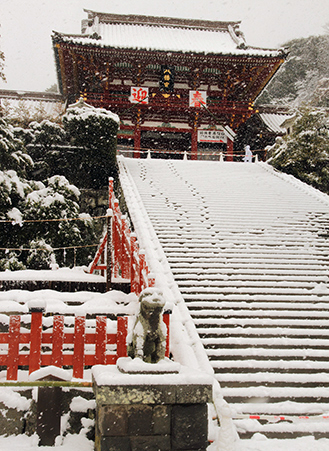new year's resolution: Realize this year what I failed to realize during the last.
Table of Contents
The Year Before the Year Just Past
- one-two punch
- The Bread of Life Mission
- Hing Hay Coworks
- Next Stop - SURF Incubator
- punch three, counterpunch
- Surf Incubator
- Standing Up to an Obstinate Bully
- King County Superior Court - A Civilized Counterpunch
- The Pro and the Pauper
- Mistaken Identity
- Summary Judgement
- the final punches
- The Impact Hub
- Galvanize and the Hydra of Surf Incubator
- The First Presbyterian Church Shelter
- The Blood Bath
The Year Just Past
- prélude
- Unrequited Effort
- A Decade-Long Tradition in Jeopardy
- No One Is Immune
- Near Technical Defeat
- When Bad Luck Turns to Good
- software triumphs in the midst
of hardware devastation - MySQL and Mecab
- Google Analytics without Google
- An Attractive Proposal from My Host Server
- An Unexpected, but Badly Needed Stroke of Kindness
- Server Upgrade - A Troubled Start
- Chart JS
- GreenSock without GreenSock?
- the galvanize watershed
- The Galvanists
- The Potty Trainers
- Gratitude or Graft
- The Microsoft Staircase
- Peterson Betrayal
- It Was Not Paradise
- Out of the Muck
- There Is No Them. Oh, Really?
- The Aloha Inn
- Twice in Three Months
- The Mudpuddle
- Transition Into Transition
- Barbeque Pork, Sauerkraut, and BREXIT
- The Suzzallo-Allen Library
- My Laundry Problem Was Solved
- Paradise Lost
- My Roommates
- Resignation
- in Liberty or not at all
- A State of Mind
- Is Administrative Law Unlawful
- De la démocratie en Amérique
- Hillsdale College
- The Bad, the Good, and the Beautiful
- The Bad
- The Good
- The Beautiful
The Year Before the Year Just Past
One-Two Punch
The Bread of Life Mission - Punch One
It was in mid-March of 2017 when I was told to leave the Bread of Life Mission and never return.
Within three weeks of my dismissal the person who decided my departure quit his position, and several months later the person who set my dismissal into motion was relieved of his duties. The reason given for my dismissal was that my continued presence in the Mission was jeopardizing my own safety, and that I must leave for my own good.
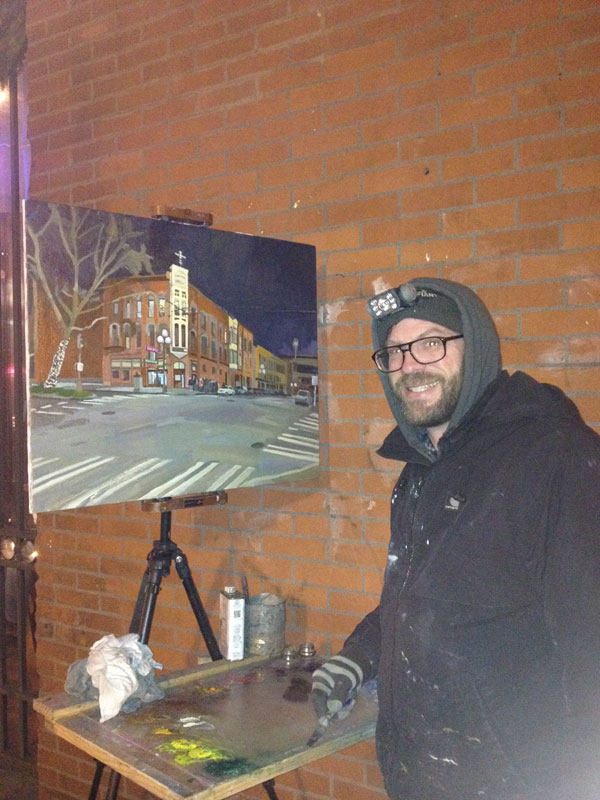 As best as I could tell I was simply no longer worth their effort, as I was not a proper fit. In the end it was easier for management to work with the conniving cabal who wanted me out than with me to break up the cabal. As far as my personal safety was concerned, I was well able to stand my own ground as I had clearly proven just before my departure. No fisticuffs. No foul language. Rather, simple physical and mental steadfastness in the face of physical threats, false accusations, obnoxious language, very bad breath, and alas, ample witnesses. In the end, management was lazy, barely investigated the matter, and was easily duped by the territorial warlords who better understood the political dynamics of the shelter's dormitory than did management itself. In any case, I hope all is well with my one good friend on the staff, Michael Lloyd.
As best as I could tell I was simply no longer worth their effort, as I was not a proper fit. In the end it was easier for management to work with the conniving cabal who wanted me out than with me to break up the cabal. As far as my personal safety was concerned, I was well able to stand my own ground as I had clearly proven just before my departure. No fisticuffs. No foul language. Rather, simple physical and mental steadfastness in the face of physical threats, false accusations, obnoxious language, very bad breath, and alas, ample witnesses. In the end, management was lazy, barely investigated the matter, and was easily duped by the territorial warlords who better understood the political dynamics of the shelter's dormitory than did management itself. In any case, I hope all is well with my one good friend on the staff, Michael Lloyd.
You see, where community is advertised, truly there is little. For community implies that each individual within the community is allowed to find his own station within the community free of a coercive authority that sits above and beyond the community itself. In reality, the staff of the Bread of Life Mission permits only that behavior on which it has a good handle. In truth, management sees only what it wants to view and is shown by those within the community who know what it wants to see.
 My failure in this dynamic was my persistent absence. For, rather than spend time during the day cultivating my own political defense, I spent nearly the whole of each at Hing Hay Coworks performing software development for my company. My goal was to escape the Bread of Life Mission and the whole of the homeless community as quickly as possible. Then too, relying on the good sense of management to pull me through in my absence was simply wishful thinking, for it was always my word against the cabal's. They were several, they were present, and I was one and only present when most of management was not around or everyone was asleep.
My failure in this dynamic was my persistent absence. For, rather than spend time during the day cultivating my own political defense, I spent nearly the whole of each at Hing Hay Coworks performing software development for my company. My goal was to escape the Bread of Life Mission and the whole of the homeless community as quickly as possible. Then too, relying on the good sense of management to pull me through in my absence was simply wishful thinking, for it was always my word against the cabal's. They were several, they were present, and I was one and only present when most of management was not around or everyone was asleep.
It was not a particularly dramatic finish, for I told the Mission what I knew to be true, and they told me to go. I left the building and entered the darkness of a cold Seattle rain. I hardly cared, for I would spend the night on a couch at Hing Hay Coworks where I had 24-hour access and the entire office space for myself until the following morning. What would follow would be a matter for the following day.
The second punch came about five weeks later.
Hing Hay Coworks - Punch Two
Sleeping every night on a couch in a 24-hour collective workspace is clearly an abuse of privilege, and it was only a matter of time before I would be caught. Then too, I would have felt much better about the matter had I been able to realize my own solution to my awkward situation before being forcefully evicted in direct violation of our contractual agreement.
I had been sleeping on the couch for about five weeks when my night's slumber was interrupted by the unexpected appearance of one of my coworkers. Although an apology was given, I replied that work came first and that no apology was necessary. Still, the lights were left on in total neglect of my person when her worked was finished, and it was time for her to go. The writing was on the wall.
Within several days I was asked to appear before the office manager, Eliza Chan, and the city official responsible for overseeing the Coworks. In the meeting I was given three reasons for my immediate dismissal and told to leave the Coworks on the spot. Two of these reasons were highly contrived and related to problems that I thought resolved already long before. The third, my sleeping on the couch, was based on only two non-contiguous days worth of electronically collected evidence indicating that I had not left the building during a 24-hour period. Certainly the evidence explained why I was asked one day to surrender my electronic key for the purpose of a security update, and maybe the coworker's unexpected appearance that night was not an accident, after all. In any case, there was nothing in the contract that strictly forbade my sleeping in the CoWorks, and I was able to supply them with a photo of the CoWorks public relations manager sleeping on the couch with his dog during the middle of the day! Then too, I did not bring my friend's dog for the whole staff to dog-sit during the course of a work day, as was the habit of the second of my accusers.
Then too, I did not bring my friend's dog for the whole staff to dog-sit during the course of a work day, as was the habit of the second of my accusers.
Yep, it was unprofessional to sleep overnight in an office space.
In contrast, I had been very discreet about my use of the couch and left both it and the toilet area spotless every morning. Indeed, up until the unexpected, late-night appearance of my fellow-coworker, the only people whom I believed to know of my transgression were the two building's housekeepers whom I had both sworn to secrecy and Michael Quinn, a volunteer for the Solanus Casey Center of Seattle's Catholic Archdiocese who had obtained and delivered a blanket for me so that I could sleep comfortably at night without fear of the cold.
Indeed, my nightly presence at the CoWorks made no additional demands on the office's cost of operations. In fact, it likely reduced them, for I turned off many of the lights left on for the purpose of security so that I could better sleep at night. What is more, every morning everyone awoke to a freshly brewed pot of coffee -- compliments of their live-in coworker.
Although the contract could be unilaterally terminated by either side, in order for either party to do so required thirty days advanced notice. What I could have understood would have been a warning not to sleep their again and a promise not to renew the contract the following month should I fail to heed their most reasonable admonition. When I was told to have my things packed and ready to go that same evening, I told them to call the police, and let the police decide who the guilty party was. After all, our mutually agreed and signed contract was clear evidence that it was they who were in breach of contract, not I. There was no emergency; there was no crime. No one was being threatened with physical violence or damage to property. Yes, there was civil infringement, and it was against, not by me.
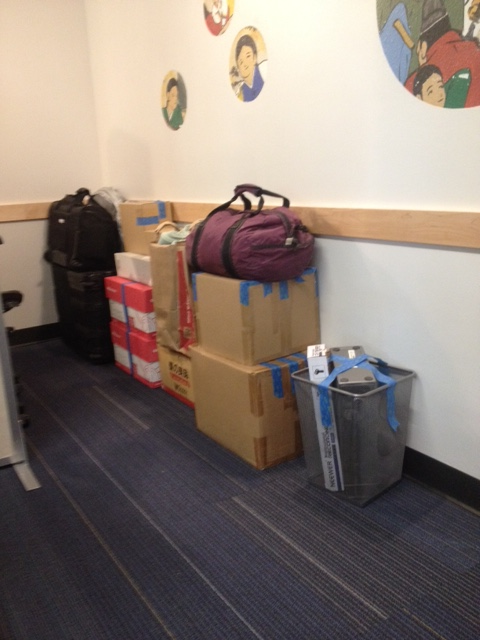 After waiting several hours the police still had not come. Neither, however, had Hing Hay Coworks' management departed. They were insistent in their ultimatum. So, I wrote the police an apology for my absence, secured a signed inventory of my already packed belongings, took a photograph, and left for NightWatch -- a private clearing house for a select number of Seattle shelters.
After waiting several hours the police still had not come. Neither, however, had Hing Hay Coworks' management departed. They were insistent in their ultimatum. So, I wrote the police an apology for my absence, secured a signed inventory of my already packed belongings, took a photograph, and left for NightWatch -- a private clearing house for a select number of Seattle shelters.
My motivation for leaving was three-fold. It was obvious that Hing Hay no longer wanted me and would refuse to renew my contract. Then too, I was concerned that the police would follow the will of their employer, the City of Seattle, and not the law. Finally, if I were to wait any longer, it was possible that I could spend the entire evening babysitting the Hing Hay management team as they grumbled to themselves and me over how despicable I was for insisting on my contractual right to remain. Alternatively, I could find myself spending another long night in the I-HOP across from Seattle University, were the police to act contrary to the Hing Hay contract and the law that upheld my half of it.
Indeed, there is a hardly a shelter, if any, in the city of Seattle that does not have a curfew beyond which you are not allowed to enter. Certainly, I had not heard of any, and there was no other homeless person around to ask. Indeed, my experience at the King County Superior Court (see below) many months later suggests that I had made a wise decision.
So, I handed over my key and was promised help with the transportation of my belongings in exchange for my cooperative spirit and threat of court action .... Within a week I found a new collective workspace and Hing Hay CoWorks provided me with the promised transportation. Both side were likely able to sleep that night, but I am of the belief that their night's rest was in their own bed with freshly washed or stale linen.
For 50 additional US dollars per month SURF Incubator was an amazing improvement in working conditions -- an improvement that turned into an embarrassing moment for the Hing Hay Coworks' management team when we arrived at my new workplace. For, when the service elevator door opened on the 7th floor of the Wells Fargo Center, there was silence. And, when my new hostess, Candace Grass, greeted us and commented to me in a voice that all could hear that I had brought my crew, I grinned. For there I was standing at the head of a small troupe of Chinese-Americans helping me with my belongings.
When I introduced Candace to my crew as the front desk attendant, things quickly reversed, for she corrected me and stated proudly that she was the co-owner. Whereupon, I quickly apologized to Candace and my crew and led them to my new desk. Candace Grass, as I would come to know, did not discriminate when she thought that she could put someone down.
Indeed, her correction stayed with me for a long time and eventually led to a serious legal mistake when I sued Seaton Grass and her as a ma-and-pa enterprise instead of SURF Incubator LLC for pretty much the same thing for which I could have sued Hing Hay CoWorks, but did not -- namely, the abuse of coercive force and breach of contract.
Let us not jump ahead.
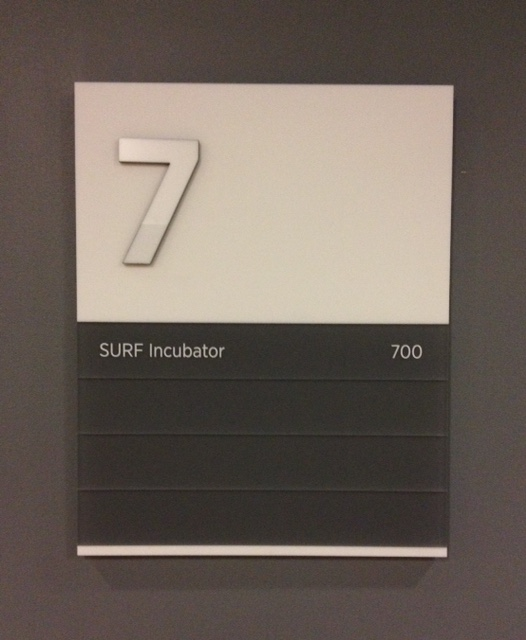 My awkward departure from Hing Hay CoWorks provided me with a better business address, a better work environment, and a view of Puget Sound. Best of all, none of my new colleagues worked for the City of Seattle. Only later would I learn that everyone in my immediate section catered to one form of government or another. Still, everyone at SURF Incubator was a private entrepreneur, and I did feel much more at home.
My awkward departure from Hing Hay CoWorks provided me with a better business address, a better work environment, and a view of Puget Sound. Best of all, none of my new colleagues worked for the City of Seattle. Only later would I learn that everyone in my immediate section catered to one form of government or another. Still, everyone at SURF Incubator was a private entrepreneur, and I did feel much more at home.
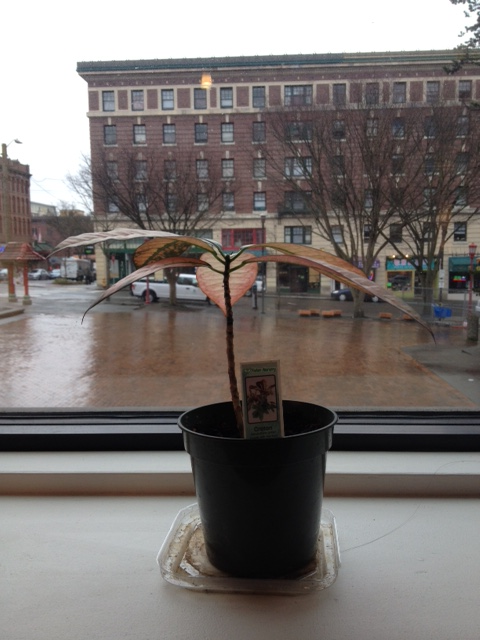 To my crew's obvious chagrin the only negative thing that they could say upon our mutual farewell in the basement of the Wells Fargo Center building was that it smelled of garbage. Perhaps they sensed what I would later learn the hard way: there was little difference between the city and the private sector when it came to the abuse of force.
To my crew's obvious chagrin the only negative thing that they could say upon our mutual farewell in the basement of the Wells Fargo Center building was that it smelled of garbage. Perhaps they sensed what I would later learn the hard way: there was little difference between the city and the private sector when it came to the abuse of force.
No, I did not sue Hing Hay Coworks for contract violation and the truly insulting way in which I had been treated. Neither, however, did I accept their phony invitation to stop by and say hello from time to time, now that I had departed. Further, I did not disassociate myself completely from the International District -- what had been an important motivation for my presence at Hing Hay Coworks in the first place. Rather, I retained my key to the Bush Hotel and continued to perform my laundry there where I had been permitted because of my membership at the CoWorks. 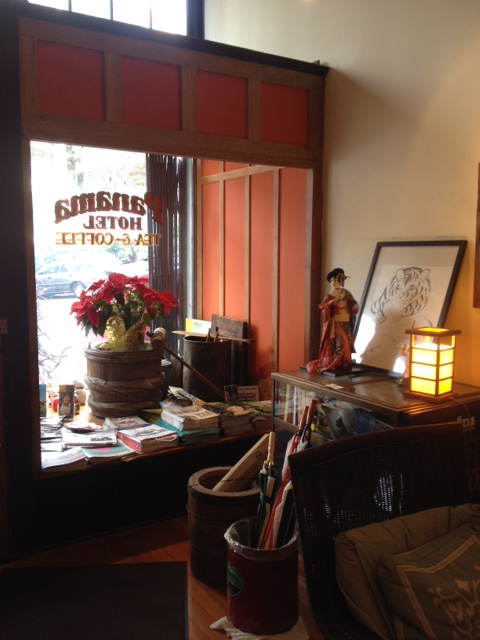 On laundry days I would also visit the Dim Sum King (Star) where I would eat sticky rice and Yiu Tau while I waited for my clothes to wash. While they were drying I drank coffee, ate a French croissant, and listened to Japanese tanka at 33 rpm on an old, well-preserved record player at the Panama (Love) Hotel.
On laundry days I would also visit the Dim Sum King (Star) where I would eat sticky rice and Yiu Tau while I waited for my clothes to wash. While they were drying I drank coffee, ate a French croissant, and listened to Japanese tanka at 33 rpm on an old, well-preserved record player at the Panama (Love) Hotel.
No, I would not allow the city of Seattle and its make-believe world of self-professed Hing Hay do-gooders spoil my effort to dig my way out of the mud into which I had been pushed. In the end Hing Hay treated me little better than I was treated at the Bread of Life Mission.  Liberty and modern American government at any level share little in common, and they wanted me out.
Liberty and modern American government at any level share little in common, and they wanted me out.
Next Stop - SURF Incubator
As soon it became clear that I would have to vacate Hing Hay Coworks on the spot, I called my friend, Michael. He recommended NightWatch -- a private clearing house for many of Seattle's homeless. It would be my first time sleeping in what could be best described as a make-shift shelter, but where else was I to go? I was not about to toss to the winds nearly six months worth of work, and I knew that there were plenty of alternatives to Hing Hay Coworks. 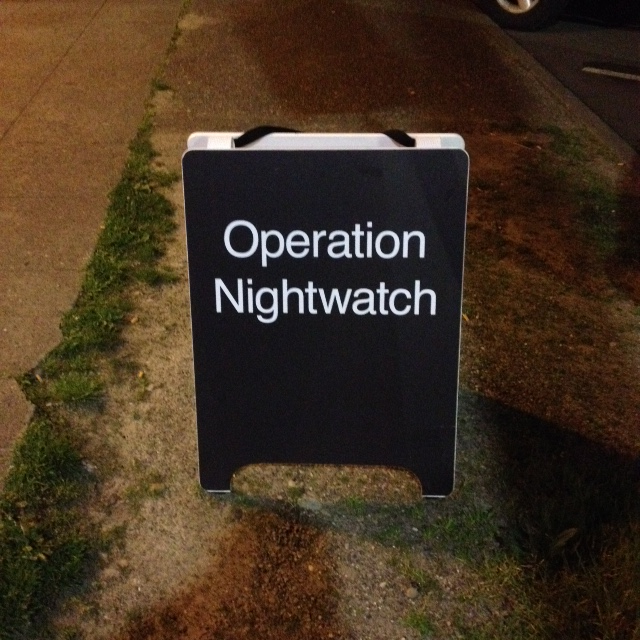 Besides, my alternative to sleeping on the CoWorks' couch had -- thanks to the intervention of Jon Prosiv at the Solanus Casey Center -- already been approved, and it would be just a matter of weeks before I would be invited to join the privileged ranks of Aloha Inn Transitional Housing.
Besides, my alternative to sleeping on the CoWorks' couch had -- thanks to the intervention of Jon Prosiv at the Solanus Casey Center -- already been approved, and it would be just a matter of weeks before I would be invited to join the privileged ranks of Aloha Inn Transitional Housing.
Surf Incubator was the same place where John Seacrest hosted his monthly meetings to recruit new candidates for the many Angel Funds that he represents, and it was just about time for a new meeting. So, I attended, was introduced to Candace Grass and her husband, and obtained permission to join Surf Incubator. It was a proud moment of brief duration, for I was gradually pegged by Candace as a homeless undesirable, and it was only a matter of time before the Grasses would find an excuse to rid themselves and their space of my despicable and dangerous presence.
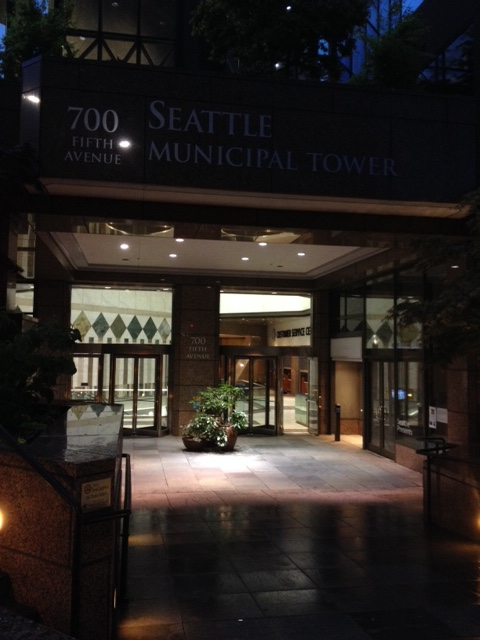 My temporary lodging was in the basement of the Seattle Municipal Tower, a large, high-rise, office building located only two blocks from the YMCA and just another block from the Wells Fargo Center where Surf Incubator was resident. The Tower's basement was carpeted, and the walls were covered with abstract and not so abstract art. Although there was no shower, there was a toilet. From one's mat on the floor one could see several floors up, and the many lights of the distant upper floors that surrounded this vast vertical space offered the illusion of sleeping under the stars. Shelter living requires a significant amount of imagination, for it is the only way to escape the reality of the majority of your closest neighbors.
My temporary lodging was in the basement of the Seattle Municipal Tower, a large, high-rise, office building located only two blocks from the YMCA and just another block from the Wells Fargo Center where Surf Incubator was resident. The Tower's basement was carpeted, and the walls were covered with abstract and not so abstract art. Although there was no shower, there was a toilet. From one's mat on the floor one could see several floors up, and the many lights of the distant upper floors that surrounded this vast vertical space offered the illusion of sleeping under the stars. Shelter living requires a significant amount of imagination, for it is the only way to escape the reality of the majority of your closest neighbors.
In any case, it was kind of cool having only a three-minute walk to work with a business address in the heart of downtown Seattle's financial district. Unfortunately, this make-shift logistical paradise was short-lived, for the Tower was closed to the homeless only weeks after my arrival.
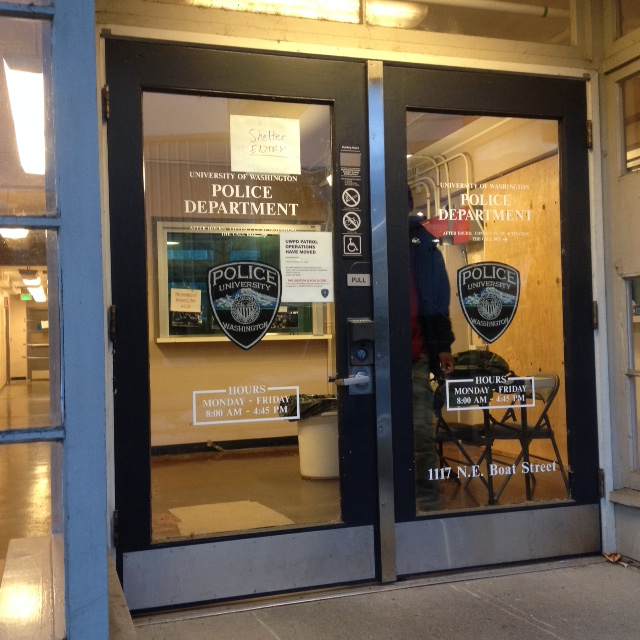 My new lodging would be along the Montlake ship canal in the University of Washington's former police station. It was an abandoned building that was scheduled for destruction in August, but the mats were brand new, and the early morning, 15-minute walk from the shelter to the university's train station was pleasant. From there it was only a ten-minute train ride and a brief walk to the Wells Fargo Center or the nearby YMCA. Indeed, rather than urinating every morning with my shelter-mates in the crowded toilet area of the abandoned station, I would walk to the dock at Sakuma Viewpoint, look up to Orion in the morning sky above, and listen to my urine fall into the channel several feet below. The early morning run of the UW varsity crew team through the channel was a regular source of inspirtation for another day's worth of coding at SURF Incubator. I had rowed crew as a freshman at Purdue University in 1967 and once again during the summer while a graduate student at the University of Washington in 1990 or thereabouts.
My new lodging would be along the Montlake ship canal in the University of Washington's former police station. It was an abandoned building that was scheduled for destruction in August, but the mats were brand new, and the early morning, 15-minute walk from the shelter to the university's train station was pleasant. From there it was only a ten-minute train ride and a brief walk to the Wells Fargo Center or the nearby YMCA. Indeed, rather than urinating every morning with my shelter-mates in the crowded toilet area of the abandoned station, I would walk to the dock at Sakuma Viewpoint, look up to Orion in the morning sky above, and listen to my urine fall into the channel several feet below. The early morning run of the UW varsity crew team through the channel was a regular source of inspirtation for another day's worth of coding at SURF Incubator. I had rowed crew as a freshman at Purdue University in 1967 and once again during the summer while a graduate student at the University of Washington in 1990 or thereabouts.
No, shelter living was hardly a panacea for my predicament, unless you believe that each and every basic need of urban social life should be met at a different urban location.
My first destination of every day was either the basement of the Wells Fargo Center or the 4th floor of the YMCA where I bathed and made myself presentable for work in a collective workspace. Monday, Wednesday, and Friday I would bathe for a second time after a solid workout with weights on the Y's fifth floor. This was followed with a short walk up First Hill that ended in an early dinner at the St. James Cathedral kitchen annex. Whereupon I would return to Surf Incubator to work my "second-shift" until night fall when I would trek all the way to NightWatch on 14th Avenue and South Jackson to obtain my pass to the abandoned police station and on occasion my breakfast for the following day that I would inevitably eat while seated at Surf Incubator's 7th Floor window counter. From there I would look across Puget Sound to the Olympic Mountains and plan my day's work schedule.
On the weekend I laundered my clothing at the Bush hotel in the International District's Chinatown and did just like I did while I was still working at Hing Hay Coworks: drink tea and coffee, eat sticky rice, YiuTau, and a French croissant, and listen to Japanese tanka. Never once did I meet any of my former coworkers from Hing Hay and for this I was, of course, thankful. Then too, what government employee, besides Donald Trump, do you know who works on the weekend? Although I never made use of the Wells Fargo Center's gym, I did make regular use on the weekend of its shower and locker area. The YMCA was closed on Sunday.
At lunch time I would walk to the Senior Center at the Pike Place Market and dine with other impoverished seniors and listen to them sing praise to modern liberalism and the government spoils to which they, and now myself, were direct recipients. It was a largely depressing experience, but the food was free -- well, at least to me --, and the quick walk to and from the waterfront was a solid break in the day.
One of Surf Incubator's main concerns was the presence of a large, old, but handsome TUMI bag that I stowed securely locked under my desk. For it was there where I hid a week's worth of clothing and toiletries. I was compelled to repeatedly insure my Surf Incubator hosts that I was not sleeping overnight in the office, although there were large beanbag-like cushions in at least two places on the 7th Floor for that very purpose. Are you kidding? I was not about to abuse any privilege out of fear that Surf Incubator would become another Hing Hay Coworks. Unfortunately, it made no difference.
Collective workspaces were not the proper place for the homeless, no matter their level of education, work experience, or dedication to task. One simply does not spend seven days a week in an office no matter how great one's need to develop and launch as soon as possible. It is simply not normal to always be present; I did not belong! Then too, when I once asked Candace Grass how she had spent a recent vacation, I was told that it was none of my business. After all, who was I, who never took a vacation, to ask someone, who did, about hers? Candace was good about making you feel like a heel.
Punch Three, CounterPunch
Surf Incubator - Punch Three
My first encounter with Lee Minsoo took place within the first couple of days of my presence at Surf Incubator. I was just about to seat myself at the window counter to have my morning coffee when I received a sudden jolt from behind. There was no one else in the room, but me and the person responsible for my turning around to see who it was who thought that his physical presence was more important than mine. Although he was quick to apologize, he offered no explanation, and there was nothing about the arrangement of tables, stools, and chairs to suggest an accident. To this day I do not know whether he intentionally pushed me or simply fell against me. What I do know is that his first apology seemed insincere, and that only upon turning around a second time did he offer what seemed to be a genuine apology. I let the matter pass.
Several weeks later we had our second encounter. I had already spend about ten minutes at the office's main printer in an effort to make it respond to my network commands and was very close to what I thought would become a successfully completed endeavor. Once again, Minsoo appeared out of nowhere and told me that he had a job to print. I explained to him that I was not yet finished. Whereupon he insisted, and I explained to him what I was trying to achieve. He stated that he and Seaton Grass had already tried to do the same, but had failed. I suggested that several attempts coming from different people are better than one, and that I would soon be finished. He would not relinquish. So, I asked him, if it were some sort of emergency that could not wait, and he did not reply. When he proceeded to thrust his thumb drive into the machine I confronted him. Whereupon he sought to push me out of the way, and I resisted. Fortunately, a fellow co-worker appeared and mentioned that there was another printer. Minsoo left, and I was greatly relieved. So, I thanked the co-worker for his intervention, apologized for the incident, and continued with the task at hand. A short time later the newly hired office manager arrived and asked me to explain what had happened. Apparently, Minsoo had gone to the manager to report himself as the offended party and embarrass me for his own failed insistence. So, I provided the manager with a little history, and voluntarily offered to alert him to any future such incident before it escalated.
He appeared satisfied and left.
On the same or following day I received an email from Seaton Grass with a warning that he would have Minsoo and I evicted were another such incident to occur. Apparently Mr. Grass believed to have found my Achilles heal -- Surf Incubator's sel-nurtured, obsequious jerk. Unfortunately, I could hardly take Seaton's threat very seriously, as the second incident had been well-managed by the community, and it was now clear -- at least to me -- that Minsoo was the source of the problem.
Still, as I well-appreciated my good-fortune, location, and the cooperative and entrepreneurial spirit of my new surroundings I thought it wise to confirm my own assessment of Minsoo's character and inquired about his person among my fellow co-workers. I quickly discovered that Minsoo had just quit one Incubator team and that his own effort to form another had failed. Although apparently difficult to work with, he knew well how to flatter management. Other than management few appeared to like his behavior. His overall attitude was especially apparent on the race track -- a somewhat narrow cooridor that formed an elipse-like path around the toilets, elevators, and several assorted small conference and storage rooms located at the center of the floor.
My own desk was located in a somewhat enclosed area that I shared with others. It was situated at one end of the track within visible distance of the kitchenette that formed a part of the track's infield. Although wide-enough to service comfortably two people moving in opposite directions, one insistent person in the center of the track could cause the other to have to turn to allow safe passage. Minsoo's roaming-desk status allowed him access to the toilet area that lay along the inside of the track, but formally speaking he had no business in the areas beyond that point. This did not seem to matter to him or anyone else for that matter, as he was a known presence. Disturbing, however, was his behavior on the track. For he would hold his smartphone high in the air so as not to have to bow his head while he did whatever while strutting down the middle of the track. This, of course, compelled everyone to go around him in an effort to accommodate his important business. Indeed, after the second incident it was the only time I ever saw him.
One day, on my way to the reading room at the other end of the track, I had the unfortunate occasion of having to pass Minsoo. He was headed in the opposite direction down the center of the track with phone in hand. My gut feelings told me not to cede to such an obnoxious presence, and I grabbed tightly the hard-bound book that I held in my left-hand, assumed a fair position on my side of the track and prepared myself for a collision. Sure enough, Minsoo continued down the center of the track until the corner of my book dug into his bare left arm, and he turned around with the words "What the fuck?" at the top of his voice. Whereupon, I turned around, displayed clearly the hot water that I held in my right hand, and told him to cool it. Although I continued along my way, I found it difficult to concentrate and took the matter up with the office manager to whom I had promised to report "any future such incident".
Unfortunately, the new manager reported the incident to Seaton Gras, and this latter pounced. For within about twenty minutes, Seaton appeared before me, invited me into a conference room, returned my check for the upcoming month's rent that I had paid somewhat ahead of schedule, and told me that I must go. He took zero interest in my side of the story and reminded me of his earlier email. As he was well within the boundaries of our agreement not to renew the contract, I offered little resistance with the knowledge that I had two weeks to find a new collective workspace. So, I returned to my desk and went about my work.
I had already experienced sufficient grief during the past three-quarters of a year, and Seaton's attitude and decision to see me leave were just more dirty water over my already very soiled duck's back. What came as a schock, was the sudden appearance of the building's security guard some ten minutes later. I had eleven pages of data and code opened before me, and I was deeply immersed. I did not even turn around and asked on what grounds the guard was demanding that I pack my things and leave on the spot. He told me that I was a threat to other tenants. Whereupon I turned around and explained to him that my contract was with Seaton Gras and not building management, that Seaton Gras had no right to demand my on-the-spot removal, and that I was not a threat to anyone, but those who would threaten me. Whereupon the guard insisted and threatened me with legal action were he to find it necessary to call the police. The grounds given this time were trespassing.
Fortunately, I realized that this was no longer an issue between me and Seaton Grass, but between the Wells Fargo Center's building management. I quickly reasoned that, although in contract with Seaton Grass, I was only a guest in the eyes of building management and did not have a legal leg to stand on. So, one-by-one I either closed or saved and closed each of my eleven pages in a manner that I could easily restore, packed enough of my belongings to sustain me for the weekend, and left the building.
It was the third such punch since the King County Superior Court brought an abrupt end to my hunger strike in August 2016, and I was compelled to leave my apartment on First Hill.
I proceeded straight to another workspace that I knew I could afford and inquired about a fixed-desk opening. As nothing was available that would satisfy my particular homelessness needs, I called one of my fellow co-workers at Surf Incubator, explained to him what had happened, and asked that he intervene on my behalf. He explained that the police were called to have Minsoo removed and that he would speak to Seaton Grass. Nothing came of it, for Seaton Grass was firm in his decision. He had finally rid himself of the Incubator's untouchable and he was not about to invite him back. There was simply no other reasonable way to explain Seaton Grass's behavior in my regard. Still, I remained optimistic.
Over the weekend I sent an email to Seaton along with copies to my closest colleagues at Surf Incubator. In the letter I explained to him that Minsoo was no longer present, that my behavior toward Minsoo was totally defensible, that Surf Incubator was now in breach of contract, and that I could forgive Seaton's overreaction, if only I would be allowed to return. Whereupon I was invited to retrieve the remainder of my belongings on Sunday. Retrieve my belongings? What about my workspace?
That Monday I went to the King County Superior Court and applied for a restraining order to prevent my further eviction.
By Thursday of the same week I had found a new fixed desk at the Impact Hub, still another collective workspace. I was not about to place the fate of my company in the hands of any court. This was the second time in the space of six months that I was threatened with the force of law without a court order. Where did people get the idea in the first place, if not from past experience in the courts?
Standing Up to an Obstinate Bully
On Monday when I submitted my request for a restraining order I was instructed by a King County Superior Court Commissioner, whose name I can no longer find on the Court's roster, that a restraining order would not be possible, because there was no imminent threat to my person or possessions. The obvious threat to my continued business development was irrelevant. This said, the Commissioner reviewed carefully my financial standing and granted me a fee waiver.
On the following day I delivered a summons for a court injunction with notice to Seaton and Candace Grass trading as SURF Incubator. I was kindly received by SURF Incubator's office manager with whom I maintained a solid working relationship throughout. He acknowledged receipt of delivery with his signature, and we arranged that I would pick up my belongings by the end of the work week.
The nature of the injunction permitted Seaton Grass to respond formally before the court in an effort to block the injunction. Unfortunately, the time provided him by the court was more than ample to render my motion useless. No matter, my trip to the Court insured that there would be no more Grass shenanigans, and the door was now open to take whatever legal action would be necessary to keep Seaton and Candice Grass in check. Then too, there was still hope that Mr. Grass would come to his senses and allow me to return. After all, he appeared to enjoy a good reputation in the start-up community, and with Minsoo gone there was no reason that I could not have contributed to his reputation in a positive way.
I am not one to hold a grudge when reason prevails, and I knew myself to be on the right side of the law and society-at-large. Indeed, my reputation among the others at Surf Incubator hardly matched Seaton Grass's and his wife's negative assessment of my enterprise and person. What is more, I was sufficiently satisfied with my colleagues, business address, and working conditions and would still be with Surf Incubator today had the Grass's not been so incorrigible in their utterly foul play.
As it turned out, Surf Incubator paid for my relocation to the Impact Hub -- something that I would likely not have received had I not taken the matter to Court. Still, it was only token compensation for the enormous grief that my relocation was costing me, and I waited patiently for Mr. Grass's formal reply to the Court.
When I received an email from Mr. Grass several days before he was required to provide a formal response to the Court, I was delighted. For in it he explained that it was in OUR best interest not to pursue the matter further. Whereupon, I wrote that I would be very happy to forgive his overreaction in my regard, if only he would allow me to return to Surf Incubator. When I received his attorney's formal response several days later, I unloaded full broadside. It was my third appeal to Seaton Grass to have my membership reinstated, and I would not be bullied by such a heartless thug. Hing Hay Coworks had already been quite enough.
King County Superior Court - A Civilized Counterpunch
Unlike Hing Hay Coworks and Surf Incubator I believe that the use of physical force, or at minimum, the real threat thereof, is a recourse of last resort, and that, when the force of logic fails to prevail between opposing parties, a third party should be invited to intervene. So, I gave Mr. Grass the opportunity to prove me wrong and show the court that his own threat of force was not only unjust, but that his assessment of my person was totally failed. Accordingly, I motioned to the Court that my request for a court injunction be changed to a suit for damages, and asked that I be permitted to make the change without having to refile. Indeed, I did not want to have to begin all over again.
My newness to the Court created enormous confusion at first, as I was repeatedly directed and redirected from one office to the next, until I finally arrived at the correct office only to be told that what I wanted to achieve was not possible, or only possible, if I did it differently than I was originally told -- or as commonsense would suggest -- by someone in a different office. If you have ever read a work by Franz Kafka, then you can well understand what I experienced to bring my case to hearing. No one appeared to have an overall view of how the system worked. Each office was pretty much self-contained, but without a one-to-one correspondence between function and office title. The most grievous aspect of my suit was not, however, the bureaucratic morass with which I was initially presented.
The Pro and the Pauper
Insofar as common law is argued based on the decisions of prior proceedings, lay attorneys such as myself are extremely disadvantaged in the King County court system. This is because they are provided with only partial access to the databases necessary for rigorous and thorough case research.
Although one could surely argue that it is fully just that only those who pay should have access to the databases at all, why then give only partial access to those who cannot afford to pay, or alternatively are not a member of the privileged legal club that is the life-blood of the court system and its judges?
As a non-registered lay attorney you are allowed to enter keywords in search of cases similar to your own, but you are then denied access to what you have found. If the goal is to frustrate the layman, and thus purge the King Count Superior courtrooms of non-professionals, then it is surely a job well done. But, what sort of justice is this, when everyone, both rich and poor, is not provided with equal access to the knowledge necessary to exercise the law -- the primary purpose and function of necessary evil
That a rich man can pay for a highly experienced attorney, and the poor man cannot, is surely a fair market outcome. That a poor man, who is willing to do his homework and assume the risks of his own legal inexperience, is not permitted access to legal resources provided by the courts to its own members is not only inequitable, but socially counterproductive. Indeed, if the purpose of the law is justice, and justice can only be properly exercised with a full understanding of the law by everyone concerned, then why are these databases not made fully accessible to all participants. No explanation was ever forthcoming, not even from the law librarians who confirmed my discovery.
 Patrick Henry stated, "I smell a rat!", when he learned of the convening of the Constitutional Convention. Although he would, in time, come to support the law of our land, his initial takeaway was well-advised, for today that law stands in shambles -- the product of the same mentality that Patrick Henry so clearly denounced in his own day.
Patrick Henry stated, "I smell a rat!", when he learned of the convening of the Constitutional Convention. Although he would, in time, come to support the law of our land, his initial takeaway was well-advised, for today that law stands in shambles -- the product of the same mentality that Patrick Henry so clearly denounced in his own day.
I was nearly as surprised when I attempted to access these same databases at the Gallagher Law Library on the University of Washington campus where I am a card-bearing alumnus. For there, I was told that only staff, faculty, and enrolled students are permitted access.
As a semi-public, semi-private institution that receives private funding from a large variety of sources including student tuition, there could be a case for denying alumni access to these resources. Then too, is not fund raising one of the chief functions of an alumni association, and why are alumni allowed to check out books, but not access crucial databases?
Mistaken Identity
It was not until the Defense submitted its own side of the argument that I realized that I had erred. In my haste to salvage my belongings and recapture my workspace at Surf Incubator, I did not procedurally investigate the legal nature of my opponent.
No, Surf Incubator was not the ma-and-pa operation that I was led to believe by Candice Grass, Surf Incubator's online public relations and marketing campaign, and the signed written agreement that made my presence in the courtroom worthwhile in the first place. So, I returned to the law library in an effort to discover how to undo what I had done and quickly learned that other prosecutors had lost their case for their failure to have properly identified their opponent before bringing their claims before the court.
So, I scurried feverishly to correct my error and justify my having made it in the first place. This matter, however, never became a part of the Hearing's conversation.
Summary Judgement
A week before the first, and eventually only hearing of my case, I received from the defense notification of a motion for summary judgement -- an attempt to prove the prosecution's case unworthy of trial. It caught me off-guard, because I suddenly found myself confronted with a well-researched legal motion and only a week left to respond. Already before the receipt of this motion I had begun to weigh the cost of prosecution (my time and energy away from further development) against the possible reward of a successful conclusion (compensation for lost development time among other things). And, now I had become the defendant of my own prosecution.
As I was no longer pursuing a ma-and-pa enterprise for the promotion of young start-ups, but a limited liability company (LLC) with an unknown number of owners, the thought of taking on numerous tables of poker-playing Angel Fund financiers suggested that a thorough response to the defense's motion would be required, and that even another week at the library would not be enough. So, I targeted what I thought was the Achilles heal of the defense's challenge -- the hypothetical outcome of a hearing that had yet to take place. Indeed, no matter how the defense argued, the entire matter lay in the presumption that the judge would: one, not accept my request to modify my request for an injunction to a demand for relief; and two, reject my correction with regard to the nature of my true opponent.
The Hearing's proceedings matched well the assorted paintings of the judge's courtroom walls -- a highly distorted abstraction of reality. Although not quite the extreme of Salvador Dali, they were certainly reminiscent of the kinds of conceptual images evoked by a casual reading of Franz Kafka's description of the Austrian-Hungarian bureaucracy.  Amazed by their presence, I asked the court bailiff, if they had been selected by the judge, whereupon he confirmed my idle speculation. Yes, there was also the missing n in the judge's name that I formally amended in my correspondence with the Court. Whereas my father was proud of his German heritage and preserved the double-n at the end of our family name, it was difficult to know how to pronounce the Mariane in Judge Mariane Spearman's given name. Did it really rhyme with bane?
Amazed by their presence, I asked the court bailiff, if they had been selected by the judge, whereupon he confirmed my idle speculation. Yes, there was also the missing n in the judge's name that I formally amended in my correspondence with the Court. Whereas my father was proud of his German heritage and preserved the double-n at the end of our family name, it was difficult to know how to pronounce the Mariane in Judge Mariane Spearman's given name. Did it really rhyme with bane?
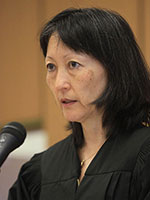 When she appeared, and we were asked to rise, my thought's immediately turned to Hong Kong, Hing Hay Coworks, the International District, the City of Seattle, my natural enemies (Seattle's so-called modern liberals), and a four page legal document that I received from Hing Hay Coworks several months before when I asked for written assurance that my iMac would arrive safely at its Surf Incubator destination in return for not taking legal action against them for breach of contract. In the end, I neither signed the document, nor took legal action, and my belongings arrived safely with my iMac in my lap.
When she appeared, and we were asked to rise, my thought's immediately turned to Hong Kong, Hing Hay Coworks, the International District, the City of Seattle, my natural enemies (Seattle's so-called modern liberals), and a four page legal document that I received from Hing Hay Coworks several months before when I asked for written assurance that my iMac would arrive safely at its Surf Incubator destination in return for not taking legal action against them for breach of contract. In the end, I neither signed the document, nor took legal action, and my belongings arrived safely with my iMac in my lap.
I kept my cool.
As the prosecutor of the case, I truly believed that I would be asked to speak first. Wrong! The defense was given the first words, and when it stated a clear falsehood, I objected and was told to remain silent and wait my turn. This I did without complaint. When I was finally allowed to speak, I read a statement that I had dutifully prepared, so as to redirect the attention of the courtroom to what I believed to be the purpose of the Hearing. While I was reading my statement Judge Spearman searched frantically for an email sent by her bailiff that, according to her, confirmed that the hearing was about the defense's motion for a summary judgement. When I was finished she made reference to the email, and I explained to her that it was not what she thought it to be, rather, that it was a response to a very different matter. I was ignored.
Judge Spearman had come to listen to the defense provide oral testimony to its own written accusations and to clarify a few matters about my intent and person. Indeed, I was given the opportunity neither to present my own case, nor to present my sole argument against the defense's motion for summary judgement.
After I had read my statement, and she had convinced herself that an email of a correspondence in which she had not participated meant something very different than it was obviously intended, she asked, the defense how it would proceed, if she were to allow me to proceed with my case without having to refile.
Apparently, in Judge Spearman's court room parties to a disagreement are permitted to compel arguments from their opponents based upon the outcomes of decisions that had yet to be made!
Mind you, expect for my original statement in which I made it clear that I had not appeared to discuss the defense's motion for a summary judgement, I was only permitted to answer questions that Judge Spearman posed to me. At no time was I ever permitted to take the initiative with regard to my own case. If this were not bad enough, the questions and remarks made by Judge Spearman demonstrated clearly that she had neither read my initial request for an injunction, nor my amended complaint and request for relief. In fact, she did not even have a copy of this latter when I referred to it in response to one of her questions!
The entire proceedings could not have lasted 20 minutes, and just before she was about to announce her decision with regard to the defense's motion, I asked, if I could speak and was denied. It were, as if, the defense and Court had decided in advance that they were not about to engage a lay attorney in a formal proceedings no matter his professional demeanor or level of preparation. My case would not be allowed to proceed.
After belittling my homeless condition, stating that I was at fault for my own demise, and pronouncing my case as unworthy of her further attention, I asked, if I would have an opportunity to appeal, whereupon she replied: "You must file your appeal within thirty days". Got up and left.
Clearly Thomas Stone, the defense's attorney had won. So, in the best sportsman-like conduct possible, I turned to him and offered my hand. He accepted, and I congratulated him on his performance. Whereupon he commented on my excellent preparation and conduct throughout the proceedings.
By the time I had returned to my second fixed desk after my forced departure from Surf Incubator I had decided not to appeal. My legal experience in Hong Kong more than a decade before had taught me that I would be likely appealing before the very judge who obviously did not want me in her courtroom in the first place.
Yes, I wanted justice to be served, but what about my company? And, I was now afraid that Mr. Grass and his poker playing cronies would seek revenge and go after me for court costs. So, I contacted Mr. Stone and instructed him to tell Seaton Grass et al. that I would not proceed with an appeal, if I could obtain written assurance that SURF Incubator, LLC would not pursue retribution for their legal costs.
When I was told that Mr. Grass and his wife, Candace were on vacation and that I should wait for their return, I shot back that I would proceed with my appeal, were I not to receive written assurance by the end of the week. I was not about to let the defense eat away at my preparation time.
By the beginning of the following week the matter was settled. Seaton Grass had been made to suffer the monetary costs of my objection to his ill-gotten action, and I had found a worthy attorney for my own future prosecution or defense -- namely, Thomas Stone -- were nudge.online ever in need of legal counsel.
I quickly returned to the business of my company -- a good deal wiser about tenant, contract, and tort law, the King County legal system, and State of Washington court procedure.
The Final Punches
The Impact Hub
Have you ever noticed how sudden things can change between the seller of a product and you, the buyer, after you have made your purchase? The prompt responses to your questions, complaints, and genuine concerns suddenly disappear. Waiting times increase, enthusiastic reassurances dissipate, and the attentive hear becomes a tongue of reproach and blame.
Indeed, an important mark of a good product and company is their after-sale care.
 The Impact Hub needed someone to fill a fixed desk in a space that was hardly competitive with other fixed-desk spaces for a similar price, but I could find nothing better on such short notice.
The Impact Hub needed someone to fill a fixed desk in a space that was hardly competitive with other fixed-desk spaces for a similar price, but I could find nothing better on such short notice.
Thankful that I would lose only one full-week's worth of work I was pleased to be so warmly welcomed by my new business host. Like the fox that reasoned that the grapes just out of his reach were surely sour and not worthy of his effort, I reasoned that the more socially aware Impact Hub located in Pioneer Square was far more suitable for nudge.online than the heart of Seattle's Financial District where I was among entrepreneurs whose primary concern was the development and sale of gadgetry. This comforting rational worked quite well until I discovered that the network set up that I had enjoyed at both Hing Hay Coworks and SURF Incubator did not function at the Impact Hub.
Surely, it was not wrong to assume that your new business host would do everything it could to help you get connected! Or, was it?
Not long after my arrival I was confronted with set up fees that would cost me many tens of dollars per hour with no guarantee of outcome. I simply could not afford to pay what was being asked, and the financial hardship that I was already facing brought into question other matters about my presence at the HUB.
Indeed, even before my first partial month was completed, I found myself seated with the HUB's CEO, the HUB's externally hired private internet technician, and a staff witness. The document before me was a gag-order to protect the reputation of the private technician, for only under this set of conditions would the Impact Hub be willing to venture help at no additional cost to me. I demurred, and my unusual office belongings were held up to me.
Apparently someone had performed his homework, researched my person on the internet, and determined that I was homeless and outspoken, therefore dangerous, and a potential threat to the HUB. It was Eliza Chan and Candace Grass in triplicate, and I was beginning to understand how a South Asian untouchable must feel in Hindu society.
At first, I was sympathetic with the HUB's concern, as the Gospel Mission, a shelter for the homeless whose reputation for relentless crisis is well-known within the homeless community, was located directly across the street from the HUB. Then too, the Impact Hub was about social impact, I had no affiliation with the Mission, and I was seeking to free myself from the same negative trappings about which my new host appeared concerned. No matter, this was Seattle where sympathy is provided at arms length with other people's money. They insisted that I sign or go.
With no guarantee of outcome, but fairly confident that I could find another collective workspace, I declined and was given a week to pack my belongings.
In the end the Impact Hub did not charge for the first week of the new month as I negotiated my way into Galvanize, and they did assist me with my luggage during my departure. This time, however, I paid for my own ZipCar and received a minor injury from one of their overzealous helpers just as I was leaving my new, just vacated, office.
Yes, I had been impacted.
Galvanize and the Hydra of Surf Incubator
It was somewhat incredulous that I would meet Minsoo on South Jackson Street as I approached Galvanize for my interview with the membership manager, Riley Peterson, but there were other collective workspaces in the neighborhood, and Minsoo and I passed without incident. It was an encounter that I did not fully appreciate at the time.
So as not to arouse attention in regard to my homelessness I drove half of my belongings to Federal Way and stowed them in a locker where I keep my First Hill apartment and other belongings. As a result, the facilities manager at Galvanize was satisfied with what he saw, and things got off to a very good start. Even one of my fellow co-workers at the Impact Hub helped me unload and move into my new office space.
Within my first week I noticed Minsoo's presence at Galvanize and inquired with Riley about his membership status. Whereupon I was told that Minsoo was, indeed, a member and that he had approached Riley about what had happened at Surf Incubator upon my arrival.
"Oh, great!"Whereupon, I told Riley that I had taken SURF Incubator to court and was in the middle of legal proceedings that were ultimately brought about by Minsoo. He was little interested in the details and wished only that nothing of the sort would repeat itself at Galvanize.
"I thought that I was rid of him."
 A couple of days later I offered to have my desk moved from the 4th to the 5th floor as Minsoo had arrived before me and appeared to spend most of his time on the 4th floor. Riley was reluctant, and we agreed to give the matter more time. Whereupon I went to Minsoo, offered my hand, and suggested that we become friends. When our hands came together I knew that it would not work, his were cool and wet. I did my best to disguise my discomfort, but left feeling that I had just shaken hands with Gollum.
A couple of days later I offered to have my desk moved from the 4th to the 5th floor as Minsoo had arrived before me and appeared to spend most of his time on the 4th floor. Riley was reluctant, and we agreed to give the matter more time. Whereupon I went to Minsoo, offered my hand, and suggested that we become friends. When our hands came together I knew that it would not work, his were cool and wet. I did my best to disguise my discomfort, but left feeling that I had just shaken hands with Gollum.
As time past, Riley confessed that Minsoo's behavior was something less than normal, and applauded my friendly good nature. This said, my early morning, late evening, and week-end presence did not go unnoticed, and a fellow member asked whether I was sleeping overnight. As this was not the case, I joked that it was against the rules, that the blanket that he saw was protection for my iMac when I first arrived, but that he could -- should he have occasion to stay overnight -- make use of it. Thankfully, my unusual time-schedule was pretty much vindicated one Sunday morning when my early morning arrival that was captured on camera frightened a thief who had forced his way in, took fright, and fled when he discovered that someone else was in the building. Indeed, my unusual time schedule was thereafter -- well, at least for a time -- viewed as a salutary aberration.
Unfortunately, the interconnectivity problem that I was having at the HUB followed me to Galvanize and became a relentless source of difficulty that I was never entirely able to overcome. Unlike, the Impact Hub, however, I was not charged for Galvanize's effort to help integrate my machine and me into the community. And, eventually Minsoo was consigned to the 5th floor. All appeared well.
The First Presbyterian Church
When the Boat Street shelter (former police station) closed on the University of Washington campus, I was provided with a choice. Continue with NightWatch or enter the municipally-run First Presbyterian Church Shelter. Because of the amenities including on-the-spot showers, free laundry, and food I was encouraged to enter the latter, but told that I could return to NightWatch, if things did not work out. Indeed, I was skeptical.
After three shelters including the so-called Bread of Life Mission I had discovered that the greater the need for regimentation, the greater the need for authority, and the greater the number of problems. Neither did the homeless population respond well to regimentation, nor did authority have much respect for the homeless. Many amenities suggested many rules, and many rules suggested much authority and its natural corollary among the homeless population -- much abuse. No, it was not likely to be the paradise that Big Al at NightWatch imagined it to be.
Obviating what some would consider the colorful detail of shelter living please allow me to go straight to the point.
When I arrived at the shelter, I was issued a towel, blanket, and bed sheet. Within the first week of my residence only my blanket and bed sheet remained. This latter I never used. Rather, I slept in what I called my street pajamas. These were clothing that I adorned each night before I departed from my collective workspace and wore until the following morning when I would change into my office attire after showering on the 4th floor of the YMCA or in the basement of the Wells Fargo Center.
As I never made use of my towel at the Shelter I barely missed its absence. This said, several weeks later my blanket went missing, and I complained to management. In response I was given something far more primitive in texture than what I was originally issued, scolded for not taking better care of my belongings, and told that no more of the other was available.
Although there was a storage locker where one could stow one's belongings, it was not the kind of place where daily use was encouraged. Yes, there were storage bins beneath the bottom bunk, but these bins came without locks and could be easily opened by just about anyone during the course of a day. So, each and every morning before the lights came on I would fold everything that I used during the night and place it on my bunk in the hope that it would be there when I returned at night. In the end, the only thing that was never stolen was the linen that I never opened.
As the coarse, primitive blanket could be obtained by anyone for the asking, it was not a commodity worth stealing, and became my preferred cover.
The problem of theft reached a crescendo when my socks and sandals were stolen one night as I slept. As my sandals were what I used to protect my feet from fungus in the toilet area, I viewed the loss as a health hazard and reported it. That morning I went to the toilet with bare feet, covered my feet with newly issued socks upon my return, applied anti-fungal medication when I finished my shower in Galvanize's co-ed, basement, locker room, and discarded the socks. Thereafter, nothing was placed at the foot of my bunk while I slept.
When I first arrived at the shelter I was told that I would have to perform several hours worth of chores in order to keep my bunk. So, I offered my computer, language, and instructional skills as an alternative to mopping floors, cleaning toilets, and wiping tables. Whereupon I was told to wait unitl my proposition could be brought before management. Several weeks past, and the front desk became concerned that I was not performing my requisite tasks. This together with the fact that I was the target of repeated theft made me a trouble-maker in their eyes, and they started calling for my exit. Management finally stepped in, and I was assigned nine hours worth of chores once a week. In the homeless community where the lowest common denominator is the standard for all decision-making neither student, nor teacher was allowed to stand above. Then too, falling below this standard was reason enough for any and all exceptions to the rule.
Up until my first assignment I was the shelter ghost. I would return between 10:00 and 11:00 at night and would be gone by 6:00 on the following morning. The only factual information that anyone had about me was that I was the target of theft, did not perform my chores, and would not be bullied by the front desk. Things quickly changed when I began performing my chores. For, rather than a barely known troublemaker who deserved to have his things stolen, I was now a valuable community asset who performed his duties with rigor and respect and would not allow the nonsense of others to get in his way. This created a problem for the front-desk, because on the one hand I was a worker on whom they could rely, but on the other hand, I had embarrassed the night desk and exposed them for the abusive scoundrels that I had always known them to be.
In time those within the community who had allied with the night staff began to emerge during the day, and my work schedule became the target of repeated obstruction.
Until my work habits became known it was fairly easy to circumvent the nonsense of my adversaries. After this, I became an easy target for sabotage. In full realization that the larger community supported me, I stood up to their shenanigans, and the front desk was notified in an effort to prevent their further incidence. Rather than siding with me, the assiduous worker, however, the front desk sided with the disturbance, and I was told, in so many words to bow to its nonsense. I objected.
There was one individual in particular. He was quite large and muscular and would allow himself to be managed by those above him only insofar as he could manage his peers. I discussed the matter with others and eventually with management and discovered the source of the problem: it was management. Although it was never made clear why management had not removed the individual long ago; it was made clear to me that he would not be removed now and because of me. It was the Bread of Life Mission revisited.
One day I was invited into the operation manager's office and told that I could only remain in the shelter, if I would commit to paying 1/3 of my income in the event that an opening in low-income housing became available.
I made my decision to leave and departed two days later.
Rather than returning to NightWatch and more shelter living I did what I had been accused of doing at Galvanize all along and began sleeping their overnight. This transition was facilitated by an act of stupid bravery while on my way to Galvanize one morning.
The Blood Bath
It was at the First Presbyterian shelter somewhere between 3:30 and 4:00 AM when the entire shelter was awakened by a fellow resident scolding another resident for stealing his milk. The dialogue between the two revealed that the scolding man had not seen the person who had taken his milk, and that the scolded accused had no knowledge of anyone stealing his accuser's milk. Having been the victim of three acts of theft already I listened carefully to the exchange, and realized that in the absence of any real evidence the entire matter had been blown way out of proportion, and that everyone was being made to suffer for it. The matter became even more ludicrous when it was discovered that the source of the milk was the shelter itself, and that there was plenty more available at the same counter from which the stolen item was originally obtained. Although I tried to regain my sleep it proved impossible, and I left the shelter before 6:00 AM.
The walk from the First Presbyterian Church to Galvanize was a good twenty-minutes, and in the early hours of the morning before the sun had arisen there was no telling what one might see or encounter along the way. Once I saw a women defecating on the pavement while squatting with her bare buttocks pointed toward the intersection and wondered whether she would clean up after herself after I had passed. In any case, I decided to take the train from the University Street station to the International District. As the Dim Sum King (Star) was not open when I arrived I proceeded straight to Galvanize. I had just crossed 2nd Avenue along South Jackson Street when I encountered an individual on the sidewalk moving in the opposite direction. He must have felt himself pretty important as we approached, because he refused to acknowledge my person. Quite disgusted by what I had already experienced that morning, I held my ground and found myself embroiled in a street fight as a result. As I was expecting no more than a sudden jolt, I entered into the fight completely unprepared and quickly discovered a fist in my right eye. It did not take long before I found myself on the ground with my opponent poised over me. His effort to pin me, however, failed, when he sought to match his own strength against mine. As soon as he stood, I sprung up, gathered my backpack, and left the scene comforted by the fact that his headphones lay smashed on the pavement.
Just as I arrived at the Galvanize door I heard a voice from behind asking me, "Are these yours?" In the fellow's hand were the wallet that I had purchased in Tokyo while in attendance as a presenter at the last WEAI Conference and my iPhone. He had followed me more than a block, and I thanked him heartily. Apparently he had watched the entire incident on 2nd Avenue and was sympathetic. When I arrived in the Galvanize locker room and looked into the mirror I realized the cause of his sympathy; my entire face was drenched in blood. It was a frightening sight even to me, but the eyes that were seeing were both fully functional. So, I bathed my body and my wound, ascended to the 5th floor, wrapped several fistfuls of ice in a towel, and headed to the Hall Health Clinic on the UW Campus in search of my family physician. When I arrived I was examined by two nurses who told me to precede to the emergency room at the UW hospital where I spent the rest of the day until I received stitches and my eye was thoroughly examined by both a bone specialist and ophthalmologist.
That evening I was allowed to sleep on the couch at Galvanize, and many weeks later it would become my preferred shelter -- a carefully guarded secret and asylum.
The police never became involved in the incident on 2nd and Jackson, but I was asked at the hospital to fill out an incident report. What I found to be extraordinarily cool in the aftermath was the questions that were posed to me by my Galvanize office mates. Not one person ventured a question about my assailant's identity; they were completely satisfied by my rendering of the events and my motivation for standing up against a street bully.
When I returned to the First Presbyterian Church on the following night the Front Desk was full of laughter at the sight of my eye. As I would remain a ghost for another month, however, very few of my fellow shelter mates ever saw but a tiny wound beneath my eye, and then only if they looked very closely -- something that they rarely did. My experience surely explained why a disproportionate number of the homeless population have only one eye. Indeed, things could have been much worse.
Truly I believed that I had survived the worst of my homeless state: four shelters, four collective workspaces, a summary judgement, hospitalization, and repeated bouts of scabies that I am only mentioning now.
So disgusted had I become with my living situation that by the year's end I had absolutely no desire to discuss it with anyone and focused my entire remaining attention on my one promising avenue of escape -- Grammar Captive.
For more than a year my dual life-style as a homeless government dependent and independent web entrepreneur had worn steadily at my physical and mental well-being, but I have weathered the beating well. My stamina and endurance have led to one technical victory on the internet after the other, and my dedication to, and understanding of the spirit of our founding fathers has grown increasingly perspicacious and refined.
Resigned to the poor diet that the homeless are compelled to endure I continue to work out at the gym and barely miss a day of full-vitamin supplements. What had kept me safe during my hunger strike was now keeping me safe in its tragic aftermath. Still, I was not prepared for what the following year would bring, and there was no way for me to have been.
The Year Just Past
Prélude
Unrequited Effort
In a way this past year has already been twice introduced: once in last year's disclaimer, and once already in this year's introduction. Still, I feel compelled to say a little more before I begin.
What makes this year different than last year is the dramatic deceleration of forward progress and the nonchalance that resulted. It is a dangerous time, as I feel that fate has set me adrift. What is more, the longer that I remain unattached, the greater is the temptation to let go completely and try something else, or try even nothing at all and simply disappear.
It is so easy to simply let go in a society that feels that I am no longer able to contribute in a manner that is meaningful to me.
It would be absurd to assert that I have not reached out, and it would be just as ludicrous to maintain that I have not fought back. Now, it may be argued that I have failed in the manner in which I have reached out and sought to fight back, but alas, I have given my very all in both endeavors. Certainly, I do not wish to finish on a note of failure, but what shame is there in surrendering to the inevitable. Neither am I afraid of death, nor am I afraid of society's censure, for I have done my most to defend the very society that is renouncing me. Have I reached too high? I do not believe so. Can I go any lower? There are extremes that I have yet to experience, but my spirit of adventure has been tempered by my age, my wisdom, and a sense of fullness that others around me do not exhibit. Simply I care not to finish my life in poverty, but my effort to escape it appears nearly everywhere frustrated.
In order to move forward, one must gather the means, but at what sacrifice in time, effort, and spirit? No, I have yet to surrender, as there still remain a few untested ideas, and when all you have left to lose is life itself, you are willing to take risks that you would otherwise not.
Still, I have grown tired of the silent, hollow refrain:
I wish I could, but I cannot.
A Decade-Long Tradition in Jeopardy
On December 31, 2017, three hours before the clock struck twelve on the North American Pacific coast, I discovered that the webpage on which I post my annual reports was dysfunctional. As I hardly visit the page during the course of any year, I had no idea how long the condition had persisted. Even worse I did not know what had brought about the page's dysfunction. My pride was wounded.
My first thought was that someone had tampered with my site. For, year after year for the several years that I had hosted my webpages with Apple's MobileMe I would have to correct errors that someone else had introduced during the run-up to the Christmas holiday. Further, while resident in DaeJeon, Korea in 2009 and 2010 my machine was hacked! These extravagant thoughts that were once surely valid were atavistic paranoia of a distant past, however. On the one hand, my pages were now hosted with Lunarpages with whom I have an excellent rapport; on the other hand, I was working behind the firewall of a captured network within the Galvanize facility. Though I had had trouble running within this network ever since I arrived at Galvanize, these issues appeared related to an unresolved problem of hard- and software incompatibility.
My second thought was a software upgrade that had escaped my attention during the course of the year and for which my own code had since been rendered obsolete. As the page was built entirely with HTML, CSS, and Javascript I removed the URL to the jQuery CDN and replaced it with an in-house version. Still, the problem did not go away. Had I entered a careless keystroke by mistake, for it is all that it would have taken? I began carefully examining my own code in search of errors, but already it was midnight, and I had missed the deadline. Alas, it was the New Year, and I resolved to fix it later in the day.
A week later I had designed a new page that would be more smartphone friendly, posted my annual report, and took pride in my resilience ready for the next catastrophe. And, come they did, one catastrophe after the other until I was nearly crushed.
No One Is Immune
I had been living the so-called grind -- the state in which you enter when you become a societal dependent who sleeps in a shelter, eats whatever charity provides, and becomes the ridicule of everyone whom the government has robbed to keep you alive while it decides what to do with you, if you do not have the common sense to know what to do with yourself -- for nearly a year and a half. Even the full-supplement of daily vitamins that I took on a daily basis and my daily work-outs at the gym were not enough to protect me against the natural hazard of disease against which most of our bodies are well able to defend themselves when properly maintained.
Seattle is a port city. The virus could have come from anywhere.
Never in my life had I felt so completely robbed of my energy for so long. How badly I wanted a good night's rest, but could not have one. How badly did I want to cook meals that were of my own making with food that I had purchased and knew to be wholesome. How badly did I want to be by myself. Unfortunately, none of this was possible, and I cried out.
Fortunately, Benjamin Ayers, a Galvanize co-worker, and Robin Koerner, the sole individual to support me during my hunger strike in the fall of 2016, answered my call for help. At Benjamin's house I was able to spend a full night, and at Robin's apartment I was able to spend several. It was the first in more than a year that I was able to sleep in a bed and arise when I wanted. Even I was able to cook my own meal on several occasions.
Despite all of the precautions that we took to prevent any contagion both of my friends finished by contracting the same as I, and my good feeling was dampened, as I was the probable cause for their misfortune. Fortunately, they did not appear to suffer to the extent that I was compelled, but neither had they been subjected to the grind before they contracted it.
To my despair my trouble had only just begun.
A Near Technical Defeat
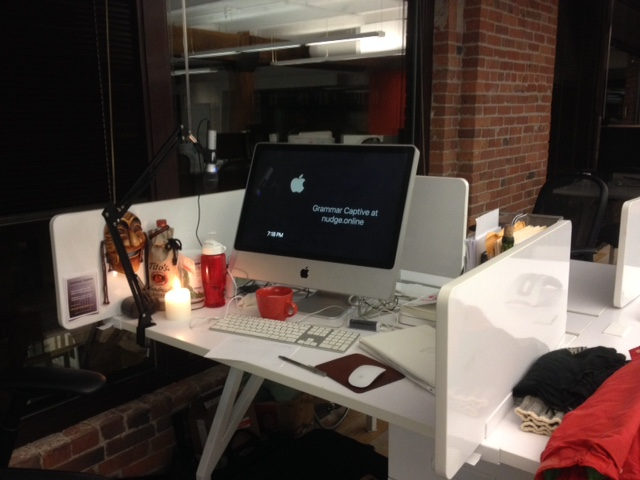 Working at a fixed desk was far more expensive than working at a roaming desk, but it facilitated my ability to live as a homeless person on the one hand and make use of my private network of iMac, MacBook, and TimeCapsule, on the other. Although the network was hardly necessary, the space under the fixed desk was. For, it was there that I could store a minimum of belongings and insure that I would have fresh clothing on a daily basis. My iMac gave me a physical work presence atop the desk and thereby diminished the appearance of my more important storage presence under it. Then too, in contrast to my 13-inch MacBook the wide-screen of my iMac made multi-tasking a much better experience, as it allowed me to change both my level of interest and focus of attention quickly in an ever changing social environment without having to sacrifice my productivity.
Working at a fixed desk was far more expensive than working at a roaming desk, but it facilitated my ability to live as a homeless person on the one hand and make use of my private network of iMac, MacBook, and TimeCapsule, on the other. Although the network was hardly necessary, the space under the fixed desk was. For, it was there that I could store a minimum of belongings and insure that I would have fresh clothing on a daily basis. My iMac gave me a physical work presence atop the desk and thereby diminished the appearance of my more important storage presence under it. Then too, in contrast to my 13-inch MacBook the wide-screen of my iMac made multi-tasking a much better experience, as it allowed me to change both my level of interest and focus of attention quickly in an ever changing social environment without having to sacrifice my productivity.
Simply, my iMac was very old by industry standards and considered obsolete by Apple Computer. I had purchased the machine in the spring of 2008 in Al Khobar, Saudi Arabia, about a year after I fled Hong Kong as a financial refugee. I was by no means wealthy, but I knew the importance of the internet, and the MacBook that I had purchased in Hong Kong had itself become obsolete and needed to be replaced. So, unlike my colleagues who were quick to purchase a car, I purchased only a driver's license and rented a car once a month as needed. This left me plenty for the purchase of a new machine. It was now a decade later, however, and in the Age of Information much can happen within a very short period of time.
Obsolete machines are difficult to repair because parts and expertise are difficult to find. They are also generally slower than newer machines. Further, quick minds working on slow machines are too easily distracted, as one is forever waiting for the results of one's own actions. Yes, there is a strong motivation for hardware renewal, but there are also good reasons not to buy at the cutting age. This is especially true when you are a developer working in an Apple computer environment.
Anyone who produces anything for the purpose of earning a living will tell you that there is a point where development must pause while production and sales move forward. For, it is the sale of a less than perfect product that provides the income for the development that brings the product closer to perfection. Finding this point is not always easy, but there is one important force at work that makes finding it easier: the sheer need to survive. You can only suffer so much before you yearn for a reward for your suffering.
In the end, it is much easier to create your own niche in an old market than it is to start a brand new one. Although you enter a new market with 100% market share and zero competition, there is no demand. The challenge, of course, then becomes to create the demand and hold as much of your original share as possible as your competition grows up around you. In contrast, if your own niche in an old market is not truly unique and does not offer superior value, the existent demand will go elsewhere.
With so many new innovations appearing all at once you are forever tempted to try something new. And, with each new temptation there are inevitably new problems for which new solutions and still more innovation are required. It can be an endless cycle until you realize that you will never accomplish anything that is truly unique and yours until you settle on that with which you are comfortable and begin innovating yourself. No, this does not mean that you shut the rest of the world out, else one day you wake up and discover that what you settled for is no longer in use, and the world has past you by. In the end, you must strike a balance between a stable work environment, trusted skills, and technology on which you can depend on the one hand, and an ever changing market place animated by technological innovation, political and commercial intrigue, demographic shifts, and a whole host of other factors on the other hand.
For example, each time that Apple Computer comes out with a new operating system, I can expect to spend anywhere from several days to several weeks in an effort to reconfigure my old working environment so that it is now compatible with the new one. Even then, there is no guarantee that I will succeed, and may even be compelled to reinstall my old operating system in failed resignation. Further, each new operating system brings with it changes that may or may not be compatible with software that is not native to my new system.
In order to prevent users from discarding their old software in favor of a new operating system and discourage other developers from introducing new software that could replace the old software in the new system, third party software developers must adapt their old software to the new operating environments. These software modifications are a time-consuming process whose costs are then passed on to users in the form of sometimes very costly software upgrades.
Setting aside the aforementioned speed considerations the biggest drawback of technological obsolescence is not found in hardware, for it is generally made to last; rather, it is in the interrelationship between the hardware and the software that makes the hardware useful -- this is especially true for Apple devices whose hardware and software tend to advance in tandem. What is more, if you have several machines of different ages connected by the same software, it only takes the obsoleteness of one machine to disrupt the entire system. Yes, there are all kinds of ways to get around these sorts of problems, but some are more efficient than others, and my entire system was challenged. Indeed, all of my devices, with the exception of my data storage unit, were operating in the most advanced operating system available for each device, but already at least two versions below the most advanced systems on the market. My hardware, although very useful to me, was simply out-of-date to most everyone else, and I did not have the means to replace it.
When my now ten-year old iMac began showing signs of fatigue I took it to the only store in the city of Seattle that is owned and run by Apple Computer. There, a diagnostic test was performed, and it was determined that the source of my problem was either in the hard-drive or the cable that connects the hard drive to the rest of the machine. Although it would have been fairly easy to replace the hard drive, finding a new cable would have proven much more difficult. As Apple Computer would not service my obsolete machine, I called around looking for someone else to do it.  Finally, I found a store in Kirkland that agreed to take a look, but I would face an outlay of USD 400 with no guarantee of success. As I was never sure at the end of each month that I would have enough money even to wash my clothes, USD 400 was a high, risky, mountain peak that I simply did not wish to climb. And this, for one very important reason.
Finally, I found a store in Kirkland that agreed to take a look, but I would face an outlay of USD 400 with no guarantee of success. As I was never sure at the end of each month that I would have enough money even to wash my clothes, USD 400 was a high, risky, mountain peak that I simply did not wish to climb. And this, for one very important reason.
Even if I were able to salvage my machine, I would not be able to overcome the aforementioned interconnectivity problem at Galvanize. And, I had no desire to leave Galvanize in search of still another collective workspace that may or may not provide me with the interconnectivity that my machine required.
Alas, I was still incurring consequential costs from my forced departure from Surf Incubator. Had I a voodoo doll that I knew would work, I would have stuck three pins in it: one each for Candace Grass, Seaton Gras, and the disHonorable Judge Mariane Spearman. Fortunately, the ignorant, arrogant, and callous nature of some people results in the kind and caring generosity of others. So, I was grateful when Ajit Banerjee offered me his own machine at the end of the summer in exchange for language lessons for his son. No, my dilemma was not yet resolved, for what was I to do for the next several months? Still, there was hope for the future that might not otherwise have existed, and I strategized accordingly. Unfortunately, Ajit's promise eventually became a source of still more disappointment.
So long as my iMac was running I could use my MacBook to house the Adobe software that I had also purchased while still resident in Jubail, Saudi Arabia. The software was old, but extremely useful. With Acrobat Professional, Photoshop, Illustrator, and InDesign I was able to breath life into my business that would have otherwise been impossible. Professional design elements, business correspondence, and legal documents were just a few of the many kinds of things that I created with my Adobe Creative Suite (Version CS3) software. In 2008 when I purchased the software it was a two thousand dollar plus investment and not something that I could even think about replacing at the moment.
Now, I could not suspend my development for some two or three months based on a promise from Ajit whose word I had never tested. What is more, I had in front of me a perfectly good machine that was newer than my iMac. There was one important catch, I had to decide between making further use of my Adobe software and using my Macbook as a replacement for my deceased iMac. My Adobe software would not function in an operating environment more advanced than the one in which it was currently installed, and I could not imagine further software development in the same environment in which the Adobe Creative Suite resided.
My current need for the Adobe software was low. Moreover, my MacBook was a newer machine than my now deceased iMac, and I was optimistic that I could install Apple's latest operating system. So, I took my MacBook to the same Apple store where I had previously had my iMac checked, and diagnostic tests were performed. Except for my battery that I had already once replaced, my machine appeared to be in excellent condition. No, the battery was not new, but over 90 percent of its original strength remained, and I would be using it very little at my fixed-desk location in Galvanize, anyway. This was, of course, very good news, and I asked for the highest version operating system that my MacBook could handle. No, I would not be able to install Apple Computer's most recent version, but I would be able to continue at my previous level.
When I returned to Galvanize and attempted to download and install the software, however, I was unable. Several telephone calls to Apple Computer revealed that I had been mistakenly informed at the Apple store. In fact, the highest operating system that my machine would accept was Lion (MacOS 10.7.5). I felt damned. On my iMac I had installed El Capitan (MacOS 10.11.6), and Apple Computer was already distributing High Sierra (MacOS 10.13). My Adobe software was no longer on my machine, and the original CDs, if I had not already discarded them when I consolidated my two storage lockers into one in order to afford payment on what remained, would be packed deep away in any one of a number of boxes. As consolation from Apple Computer for my wasted effort and misfortune I received a free copy of iLife that was compatible with my new MacOS 10.7.5 operating system. Hardly recompense for my loss of Adobe's Creative Suite, but at least I could move forward in my new, very old, operating environment.
An important lesson was learned. Each Apple machine model follows its own development path, and newer machines in one model's series may be technologically inferior to older machines in another model's series. If I am ever in a position to purchase a new Apple machine again, I now have a better idea about what to ask when given a choice between the purchase of an older machine or a newer one.
Although my good friend, Peter Baron, offered financial help, I declined. In fact, I was embarrassed by his offer. For, rather than loaning me the USD 1000 that I had requested shortly before my eviction from my First Hill, Seattle apartment, he gave it to me outright, but only if I were to promise not to ask again. So, I thanked him for his new offer of financial assistance, and told him that I would only accept another, if I could not manage with what I had.
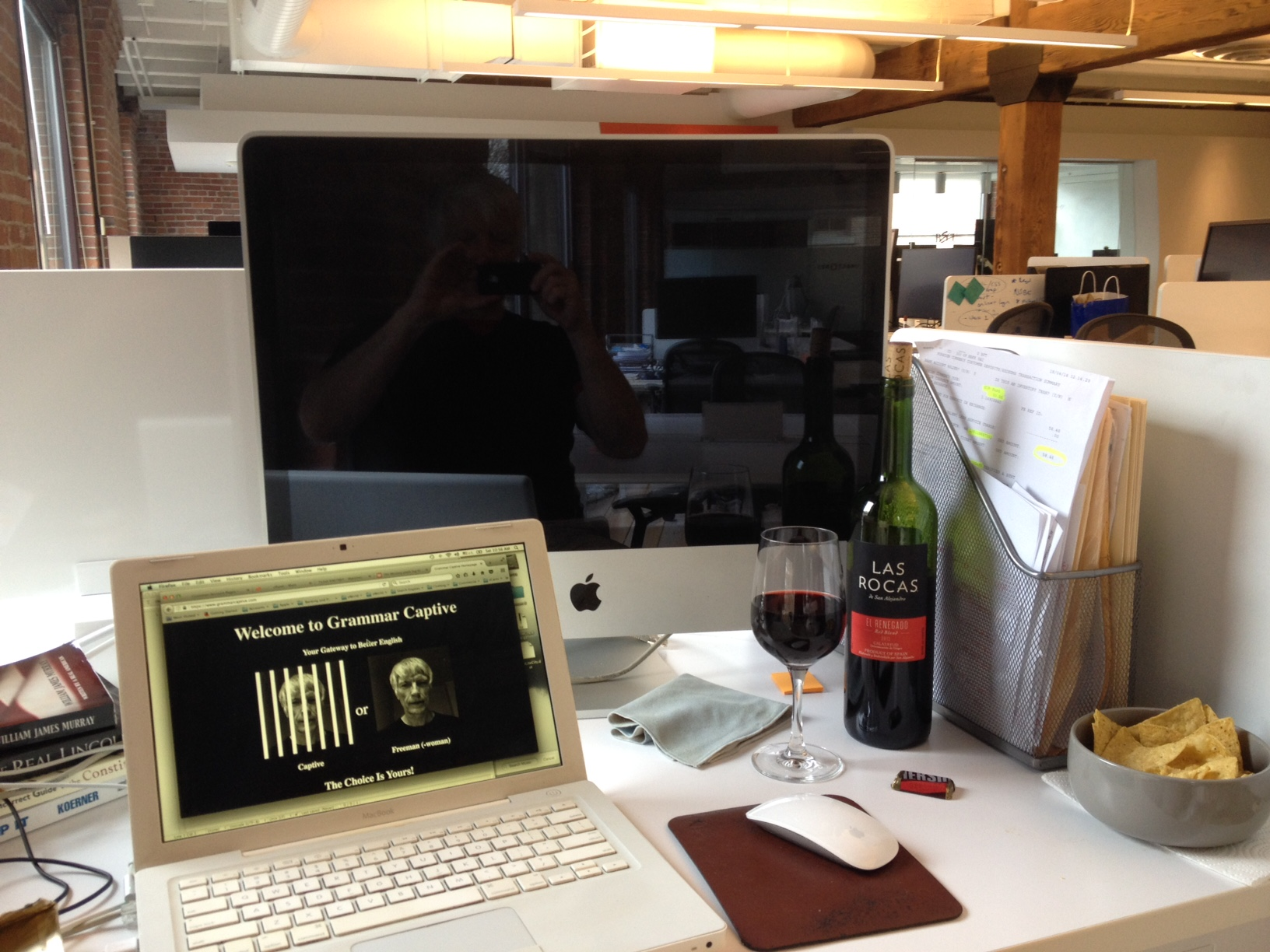 In the end, I did not have much, but I was resourceful, and was able to manage with an older system on a much smaller screen and no access to my Adobe software. My biggest difficulty was software version incompatibility between my newly created test-server and my third party host-server, Lunarpages. This problem was resolved when I cloned my website at the suggestion of Chris Barnett and created from it a subdomain that allowed me to experiment without effecting my primary domain. Indeed, after several weeks of downtime I had begun moving forward once again.
In the end, I did not have much, but I was resourceful, and was able to manage with an older system on a much smaller screen and no access to my Adobe software. My biggest difficulty was software version incompatibility between my newly created test-server and my third party host-server, Lunarpages. This problem was resolved when I cloned my website at the suggestion of Chris Barnett and created from it a subdomain that allowed me to experiment without effecting my primary domain. Indeed, after several weeks of downtime I had begun moving forward once again.
Unfortunately, my technical woes were not yet over.
When Bad Luck Turns Good
What seemed like a checked downward spiral was suddenly undone, when my iPhone stopped charging, and I made my third trip to Apple Computer within the span of several weeks. Luck runs in streaks, if there is any at all, and it can just as well be good as bad. Fate would not allow me to move forward. For, when I arrived at Apple Computer I was told still again,
Your device, Sir, is obsolete, we cannot help you.With the exception of my storage device my iPhone was the newest of all of my devices. What would I do, were my MacBook to give out as well? I was frightened.
Rather than calling around only to be ignored again, I took my phone to one of the downtown shops that never replied when I sent out my SOS for my failed iMac. The additional effort was to know avail, for once again I was turned away, because my machine was considered obsolete.
Alas, what was I to do? There was not a browser that I could install that did not complain that my current browser version was a security risk and should be upgraded. Surely, I would soon be denied access even to Apple's iCloud -- the only place where I was now able to receive email for my Apple account. Further, device simulators do not always provide accurate feedback, and I no longer had a reliable means to test the responsive design of my webpages. Once again, I cried out, and within several days I had two used iPhone 5's on my desk: one from my good friend, Chris Barnett, and the other from Miles, one of the mentors at Galvanize. My bad fortune had brought me good, for I went from Apple's IOS 9.6 to 10.3 at zero cost. So, I returned the iPhone whose technology was incompatible with my service provider, and presented the former owner of the other with a bottle of Las Rocas, my red wine of choice, in gratitude.
It was a happy time after so many back-to-back technological set-backs.
Software Triumphs in the Midst of Hardware Devastation
MySQL and Mecab
I had begun exploring MySQL in August of 2015 -- a full year before my First Hill eviction. Still, I hardly enjoyed the understanding and proficiency necessary to perform the kinds of tasks that my limited knowledge told me were possible. Fortunately, however, I understood enough that with the patience of someone more knowledgeable, I could be taught quite a bit with little trouble. This someone turned out to be Chris Barnett, a senior technician for BECU (Boeing Employees Credit Union) and fellow co-worker at Galvanize. Although in the employ of BECU he had his own desk, tended to work alone, and we became acquainted as a result.
It was late spring in the Year of the Dog.
Although there was much that Chris did not know about me, there appeared to be much that he did, and unlike many others he went out of his way to help me out. He even invited me to two of his house parties and introduced me to his very knowledgeable IT friends. All of this was very helpful, but nothing in comparison to how well he was able to complement my own knowledge of MySQL and offer very practical suggestions that would allow me to continue developing in my severely handicapped operating environment.
Before the summer was very old Grammar Captive's introductory newsletter was made available in four languages and all newsletters except for those written in Japanese were fully searchable using keywords in any language. Performing similar searches in Japanese would require more technical sophistication, but this was not yet a high priority. Not until fall would I make the effort and begin investigating the MeCab parser.
After several weeks of investigation and experimentation I was able to install the just-mentioned parser. Implementing it has become still another story, and it is difficult to know how many more days it will take to achieve the task. In any case, it is a priority for the upcoming year -- and this, for several reasons. Firstly, it would appear odd to users that they could search Grammar Captive's Seven Gates newsletter in only three of the four languages in which it has been made available. Secondly, too many important things in my life have been started only to be abandoned by unwanted circumstance. Finally, my living situation has changed, and my current household duties have provided me with an important window for refreshing my knowledge of written Japanese.
Then too, none of the technical experts with whom I regularly converse, know anything about Mecab that I have not explained to them. So, I have to figure it out pretty much on my own. This is the way it has been with the installation, and this is likely how it will be with its eventual implementation.
Google Analytics Without Google
A task more important than the development of a customized Japanese search engine was the task of tracking and analyzing user behavior. Although I started on this venture with something very modest in mind, it has turned into an enormous amount of work of only partial success.
I discovered Matomo accidentally on the internet and was impressed with the idea that I could perform with it Google-like data analytics without the use of Google. That it would require no monetary outlay to download, install, implement, and operate was a very exciting prospect. Further, not only would the data that I collected reside on my own computer, but so too would the software used to analyze it. This would be very different from Google Analytics where your data is collected, stored, and owned by Google in exchange for your use of its tools. Indeed, trading this information with Google for the right to use its data collection and analytical tools is only a good trade, if there are no other alternatives.
Unless you work for Google you can only guess what Google does with your data, with whom Google shares it, and for what purpose it is shared. In the end, I am deeply suspicious of Google's seemingly unscrupulous, close ties to governments around the world and have no desire to make the success of my business dependent on its political intrigue.
Data analysis is crucial to the success of any business, and in the highly competitive world of the internet, as little should be left to chance as possible. What may seem like a good idea to you, may not be a very good idea to others, and data analytics tell you in a very direct and visible manner which of your implemented ideas are well received and which are not. What is more, this data can be shared with other businesses in an effort to woo them to your site and enhance your sale's commissions.
So yes, I downloaded Matomo (formerly PIWIK) with a great deal of fanfare and elation, only to be checked when I attempted to implement it. For, the user's manual, though comprehensive in its scope, is poorly written. In addition, the code, although written in English and thus accessible to most people trained in IT, does not appear to be written by native speakers, and is often misleading as a result. What is worse, nearly everyone in the multilingual Matomo forums, are beginners like yourself, and many questions are either left unanswered for lack of expertise, or the answers provided take you down a time-consuming rabbit-hole. Further, the code itself is a dense thicket of interlocking PHP classes that is very difficult to penetrate. Although this latter may or may not be beneficial from the point of view of security, innovation on the part of the casual user is highly constrained as a result. What is worse, it takes forever to retrieve data once it has been captured.
Probably my worst disappointment is the way in which data is authorized to potential users. In effect, you have only two easily implemented choices: provide single users with access to everything, or provide complete access to all data to everyone. In order to access and present the data in any other way requires time-consuming trial-and-error experimentation with a large variety of poorly documented reporting methods, the creation of a new storage and access routines, and the development of your own innovative formatting procedures for final presentation of the data thus retrieved.
All in all, Matomo is a complex, but valuable piece of software with a very high learning curve that could be greatly reduced, if only the online manual were presented with the same level of rigor as the marketing hype that accompanies it. In Japanese, the word matomo can be translated to mean true appearance. Personally I think it was poorly chosen unless, of course, confusion is the state of mind of those who created it.
Alas, as Matomo is provided at no cost to users and does provide a useful interface, if only I would use it in the way that it is meant to be used, many would think me ungrateful. My effort, however, to help Matomo expand its horizon was not well-received. So, I quite the forum and staked out a truly ma tomo road, for others to follow, if they so wish.
Thank you, Matomo. I will end my complaint here.
An Attractive Proposal from My Host Server
Shortly before I installed Matomo I noticed a deterioration in the performance of my web application. Things that were previously downloaded with ease were now subject to long wait times, if they were downloaded at all. At first, I attributed the problem to my new, recently downgraded, Apple operating environment, as my move from MacOS 10.11.6 on my iMac to MacOS 10.7.5 on my MacBook had set me back four Apple years. Unfortunately, however, I noticed the same problem on my new iPhone 5 that was connecting to the internet from a variety of sources. This caused me to contact my host server who explained that my site was exceeding its resource limits. Grammar Captive was under cyber attack!
My host server suggested many solutions to fix the problem, and I tried nearly all of them. Still, the problem would not go away -- this, despite the many security issues that I fortunately discovered and fixed during our dialogue.
During this several-week discovery process I was also busy exploring Matomo. Unable to get the software to function properly on my obsolete MacBook where I would have preferred to use it, I downloaded and installed it on my host server. Malicious visits from cyber attackers were not the sole source of exceeded resource limits. This is when I learned how resource-intensive Matomo truly is and nearly dumped it in total frustration.
Having convinced my provider that I had implemented all of its many suggestions that applied to my web application, it suggested that I upgrade my server status from a shared server to a VPS (virtual private server). The proposal was attractive, because it promised not only to overcome my current resource constraints, but would also permit the expansion of nearly all of them at will and even allow the streaming of my not-yet-produced podcasts directly from my website. No matter. However necessary the upgrade appeared to be, it would just have to wait. For, it would have tripled my host server costs from about USD 60 every three months to about the same every month, and I would sometimes brush my teeth without toothpaste due to a lack of funding at the end of the month.
The signpost on the road ahead was now clear. The fall was rapidly approaching, and if my business were to succeed it would require additional server resources to match the increased server traffic that success would ultimately demand. The proposed VPS was an obvious solution, for it would allow me to expand my server resources in tandem with increased server demand. In short, if everything were running properly server costs would increase directly with server traffic and revenue, and I would no longer be plagued with an inability to meet server payments.
Either my business would stagnate for want of resources, or I would find the means to grow. The upgrade was inevitable, and I would find the way!
An Unexpected, but Badly Needed Stroke of Kindness
By now, my state of homelessness had become common knowledge among my Galvanist colleagues, and my deceased iMac stood atop my fixed desk as a monument to my bad fortune and perseverance. Every week I posted my most recent development goals and accomplishments on my website's blog page and provided anyone who wanted with an opportunity to verify each. Alas, I did my best to serve as a kind of inspiration to those around me and insure to all that I was not abusing my workplace refuge.
In the end, most of us were start-ups struggling to succeed, and each of us had his own tales of woe and aspirations. Doing what I was doing while in a state of homelessness was somewhat amazing, however -- even to me.
While at Galvanize, as at both Hing Hay CoWorks and SURF Incubator before, I did my utmost to focus my conversation on the substance of development and demurred when it came to my very public private life. This latter could be found on the internet, just as you are reading here. Little more could be said without becoming redundant, anyway. In fact, the only time that I would stray from the topic of development is when it came to the topic of political and economic liberty, whereupon I became either a fountain of well-received knowledge or a threat to carefully nurtured hypocrisy.
Fortunately, Riley was one of those few Seattle-ites who could distinguish between classical and modern liberalism and was able to accommodate the logic of both. To what extent he was knowledgeable about my state of homelessness I do not know. What was certain was his knowledge of my recent technical and financial woes.
Just before he quit his post as membership manager in favor of his new post as start-up consultant and facilitator he informed me of an action that he had taken in regard to my membership fee. The 10% discount that I had received for my first six months at Galvanize was about to expire, and he had awarded me with another six months' worth of discount. Exactly how much I did not understand, but I was elated that he had honored my request for a continuation of the initial discount. When I finally realized that my original discount of 10% had been increased to 50%, I was overwhelmed. With the new discount in place I could now purchase the proposed server upgrade.
Thank you, Riley.
Server Upgrade - A Troubled Start
With the upgrade in place, not only did the numerous reported server faults that had been inhibiting access to my webpages disappear, but the data that I retrieved from my Matomo server was more readily obtained. The thicket of PHP classes that made Matomo so difficult to understand and manipulate also slowed the retrieval of data. With more resources at hand the Matomo thicket was less burdensome. This improvement in performance was only a fraction of all -- both good and bad -- that accompanied the server upgrade, however.
The very best that I could announce was the nearly unlimited server capacity to which I now had access. It was pay as needed, and expansion would be as easy as an online payment. In addition, visitors to my website could now stream my podcasts directly from my website, and I would be able to handle as many who appeared and for whom I had funds. Yes, I would still have to learn how to peg income to traffic, but I was well on my way to becoming a viable online company. This was a very big step, and now a very affordable, even modest financial outlay.
The flip-side was almost as grievous as my elation. For, I now had my own server, but was using a system about which I was largely unfamiliar. So long as my pages were hosted on a shared server, server maintenance for one meant server maintenance for all, and it was included as part of one's server fee. Now, however, I had to maintain my own server, and help was no longer as dedicated and quick as it was before. What is more, any service consultation that was not directly related to the maintenance of my server incurred an additional hefty service fee. Oh, how I longed for the service that was provided while still on my host's shared server.
After several weeks of ever-increasing frustration I complained. While pointing out various weaknesses in the way that my queries were being handled I offered suggestions about how to remedy them.
Unlike Matomo, my constructive criticism was not only well received, but directly acted upon. Of course, at Lunarpages I was a paying customer; at Matomo I was a non-paying user. Carefully, composed suggestions based upon time-consuming experimentation did not seem to matter; Matomo was focused on the short-term bottom-line. Though only a small improvement in average turn around time resulted at Lunarpages, the responses to my queries were now much better focused and far more informative. I was finally receiving the kind of cooperation and information that I had enjoyed while on the shared server.
In order to correct for the slower turn-around times I began multi-tasking in all things that depended on consultation with my host server. It worked, and in the end I was even recognized as an official sponsor for my host server. Hooray, Lunarpages!
Chart JS
The data collected by, stored in, and retrieved from the Matomo server fulfills three important functions. One, it helps the developer understand how his site is being used by visitors so that he might optimize site performance, improve visitors' online experience, and thereby enhance both business traffic and revenue. Two, it reports visitor activity to potential and active sponsors and affiliates, improves their marketing experience, and thereby attracts their business. And three, it mirrors return visitor behavior one-on-one, builds trust, and optimizes the experience of each visitor. Although the first of these three functions can be well satisfied with Matomo out-of-the-box so to speak, the second and third functions are less easily satisfied with the resources made available. It is for this reason that I was compelled to explore alternative methods to display my data. In my very long search I stumbled on a rather terrific piece of Javascript software called Chart JS.
The installation of this software could have been very easy, but I am a little stubborn in my desire for the best and often go after much more than my intended goal. This said, after nearly three weeks of grappling with a whole host of related new installation software I finally settled on the easiest installation possible. It was a very frustrating experience, and it was during this exploration that I almost quit my host server for lack of cooperation, inadequate instruction, and the provision of misleading or even false information. In the end, however, I learned much about what I can and cannot do in my new server environment, am now much better informed about how to install third-party software in my new system, and have established a much closer working relationship with my host server, as a result.
GreenSock Without GreenSock
As my ever-changing homeless state prevented me from my planned fall launch, I had a good deal of free time on my hands and could explore other avenues of development. I was in bad need of a break from Matomo and knew enough to be able to return at any time. Besides, what was the point of counting, if there was nothing to count! So, I turned my attention to marketing and looked for a way to turn the seven gates of Grammar Captive's podcast hostpage into a viable marketing tool. In so doing I stumbled upon GreenSock.
GreenSock combines CSS and Javascript into a well-documented, easy to use software package that assists developers in the production of dynamic content -- i.e., the manipulation of HTML elements, the building blocks of all webpages.
Like any very useful piece of software it would require study, and I set to work. Unlike Matomo, however, the GreenSock software was well documented and required very little experimentation to understand. Already by the end of the first week, I had sufficient command of GreenSock methods to begin manipulating webpage elements according to my own design. I was ready to build my first rotating cube.
Though building my first cube was pretty easy, getting it to appear in a particular context was not. As my goal was to be able to manipulate six cube objects in six different contexts simultaneously, I decided to dig under GreenSock's hood to get a better idea about how cubes are constructed. This is when I discovered David DeSantro's 3D Transforms. From there it was only a matter of time and experimentation.
I can now construct and position cubes wherever I desire and manipulate each in a large number of ways to boot. I was heartily encouraged with what I was able to accomplish and began undertaking other projects that I had heretofore set aside as too difficult or barely worth my effort. Indeed, I had reached a new level of web-development sophistication that was very encouraging.
More importantly, I had just learned how to increase the advertising space on a webpage by six-fold. So, why was I not making any money? What had happened?
The Galvanize Watershed
The Galvanists
Born in 1737 and trained at the University of Bologna, Luigi Galvani, was likely familiar with the political convulsions that traversed continental Europe and North America via the French Enlightenment. It was during the 18th century that classical liberalism came of age -- a period of modern political economy that I believe has yet to run its full course.
Galvani is probably best known today for his discovery of electricity in biological matter. His greatest contribution, however, may have been his failed half of an academic debate with Alessandro Volta who demonstrated Galvani's confusion. Indeed, what Galvani observed was not what Galvani thought, but the result of something else. In order to prove his point Volta invented the world's first battery and demonstrated in so doing that Galvani had discovered a medium through which electricity could pass, but not the source of electrical generation.
The etymology of the word galvanize can be traced back to Volta who named his discovery after Luigi Galvani. Today it refers to a chemical procedure whereby electrical current is used to plate iron with a non-corrosive zinc surface. Whence the word gained its popularity as a literary term meaning excite, motivate, or call to action is less clear. During my initial residence at Galvanize I was surely stimulated. Toward the end, however, I felt like I had been plated.
Though much better than Hing Hay Coworks that was dominated by those who would have you believe that they are indispensable, and that people would actually pay for their services by some means other than fiscal extortion, Galvanize was dominated by those who believe that fiscal extortion is perfectly fine so long as everyone is extorted equally, that no one is allowed to escape the extortion, and that some tangible social benefits, no matter their cost of manifestation, result from the extortion. In the end, committed garden-variety socialists.
Of course, at Galvanize, there were far many more whose livelihoods could be ruined by the extortion, than there were those whose livelihoods were sustained directly by it. This incontrovertible fact made it easier to engage in political discussions of a sometimes interesting sort, provided one did not probe too deeply into America's historical past, and one catered to the carefully contrived sensibilities of the modern liberal mindset including
- Identity politics
- Social justice
- Freedom from Religion
- Equal opportunity
- Free food, shelter, clothing, medicine, and education for everyone
- Big government, Organized labor, and Central banking
and so on and so forth.
Never mind, how all of this would be funded or any of it would be achieved, for after all there were plenty of wealthy people from whom the government could steal on behalf of the general public, and there were plenty of social scientists to provide all of the needed answers paid for by the same. Yes, the administrative state was alive and well in the minds of Seattle's Galvanists!
My bet is that both Galvani and Volta would be repulsed, if they were alive today.
In a way, I should not be too harsh on my fellow Galvanists, for it is likely their modern liberal perversion of the Robin Hood legacy that made them tolerant of my otherwise despicable and deplorable homeless presence. Then too, I must have appeared frightfully ungrateful for pointing out the ill-conceived logic that lay at the basis of this perversion. And, what a hypocrite I must have appeared to them for accepting government charity in the first place! Indeed, the audacity of a lowly, contemptible untouchable rendering judgement on his own benefactors!
Surely, they had not taken the time to read the epilogue to my hunger strike, or maybe they had read my take on why my strike had failed and discovered themselves. Or, maybe my being there did not stimulate them at all; rather, it frightened them to think that homelessness was just a desk away. It is difficult to stay, but my relationship with several of my coworkers was becoming increasingly strained. There had been a mood change, and Riley was now accusing me of being passive-aggressive.
My deepest apology to Gordon, my closest fixed desk neighbor, and other Galvanists who surely cannot be included in the above parody.
The Potty Trainers
When I first met Riley, I was duly impressed. For here was a young lad, not long out of school, offering a nearly seventy-year-old man a place to work in a collective workspace in which the average age could not have been all of thirty-two years. Even this number belied the reality, as it was highly skewed by a few older others more established than myself, but still not as old. Of course, I was a paying customer in search of office space in a collective workspace without a waiting list -- not an elderly university instructor looking for employment in a highly competitive labor market at an American university that provides hire-to-grave employment, but has zero interest in hiring anyone who is not young enough to intern.
In any case, Riley was a likable sort of person that could just as easily laugh at himself as at others, and who, like many in a middle management position, saw his duties and responsibilities sometimes at odds with those of other middle managers above him. It was only later that I would learn that he had majored in philosophy while still in school, was familiar with classical liberal thinking, and more receptive to my thoughts on American political economy than nearly all of his Galvanist peers combined.
Though surely not Riley's fault, things started going awry when the old events manager was replaced, and the entire five story building, plus basement and roof, were turned into a weekend activity house that hosted film crews, wedding parties, news outlets, trade shows, and just about any other activity that could turn my weekend work-asylum into a playground for Seattle's modern liberals. To my great dismay I was the odd-man out in this regard, as I was sometimes the only Galvanist present on the weekend.
On the one hand, I had a right to my 24-7 work space! On the other hand, it was surely my duty to bend on behalf of the remainder. So, compromise I did, but to no avail, for the events manager knew that she was more valuable to Galvanize's bottom line than I, and that my presence on the weekend was a constraint on what she could offer potential clients. No matter that I was not the sole person to consider, for the space was open 24-7 to anyone who was a member and wanted to make use of it. For her it must have been idle theorizing, for she went out of her way to make my presence miserable.
Where before I was allowed to nap in the basement after my return from the gym and my early evening meal at the St. James Cathedral, I was now forbidden and threatened with expulsion, if I were to continue. The many evening meals that were provided by staff from leftovers of weekday evening events nearly disappeared. Rooms that were once free on a first-come-first-serve basis were declared occupied by staff, but then never used. Even she began using the 4th floor lobby as her headquarters for evening and weekend events.
Once, when I was alone on the roof, she appeared with a client. No "Hello". No "Please excuse us, I would like to introduce you to our new client". No "Hello Roddy, may we disturb you for a moment". Nothing of the sort. I was simply not there.
In an effort to defend myself I invited the newly elected head of the King County Libertarian Party to Galvanize; and Riley, he, and I toured the facility with the idea in mind that Galvanize could become the Party's new county headquarters. Indeed, what better place could the Party find than in a collective workspace with young start-ups on the edge of Pioneer Square within walking distance of Seattle's twin baseball and football stadiums and Seattle's foremost transportation hub.
During the tour I realized that my offer to become the Party's office manager was probably a mistake, for our strategies for expanding the Party were diametrically opposed. Whereas the new party chair saw history as a waste of time, I saw it as America's only real hope. It was an important lesson that brought me closer to Galvanize's membership manager on the one hand, but dissuaded me from all further investment in the Libertarian Party in King County on the other. In any case, it appeared worth the effort, for it proved to Riley a second time that I knew people, was not your average homeless person, and was, at least for a time, a potential asset to the House of Galvanize.
The first sign of my coming demise occurred when the front desk posted a flier advertising a Fortran gaming event in an effort to stimulate community spirit. On the flier was a Frankenstein-like creature with a bloodied face and a wounded left eye. 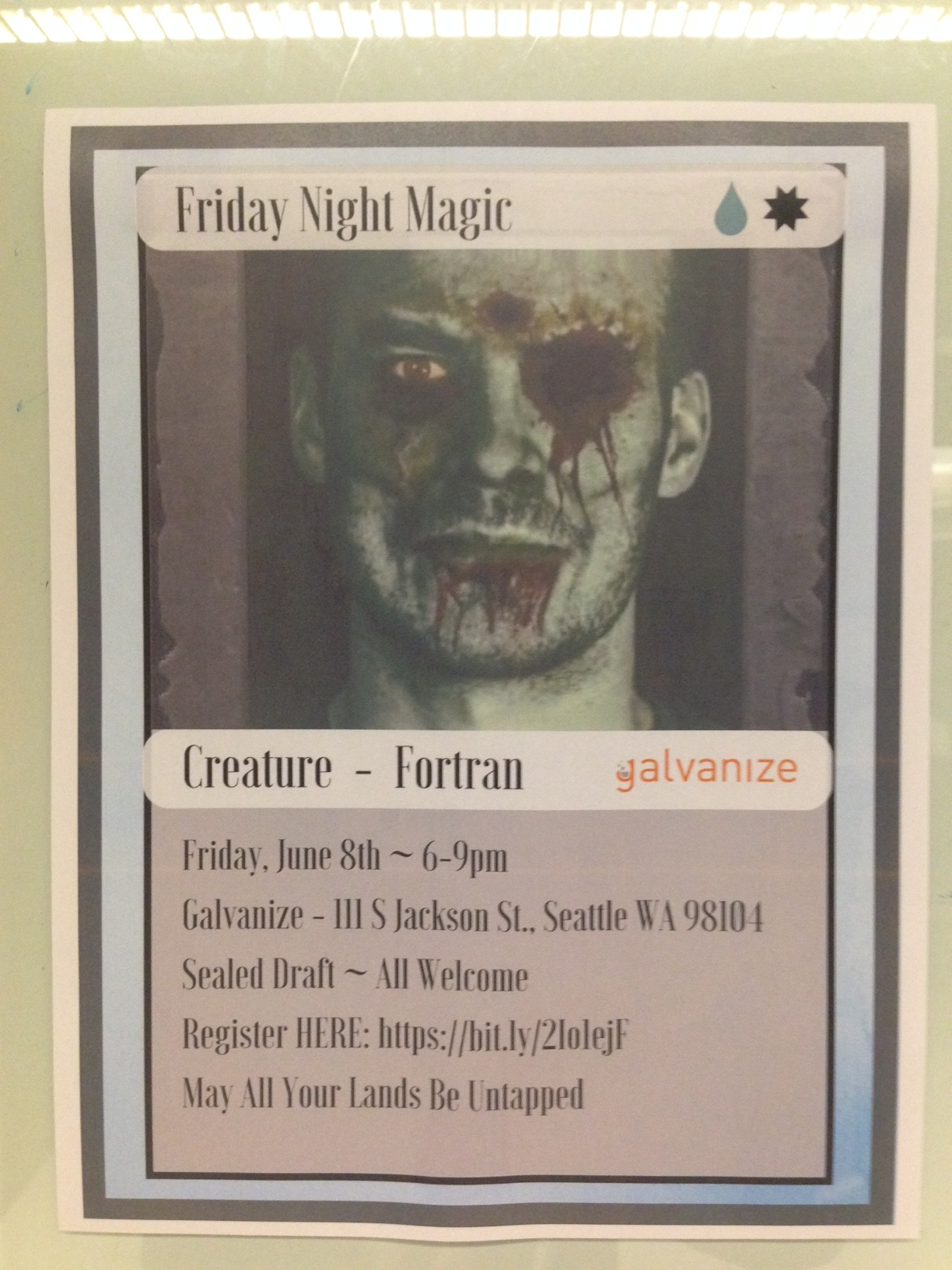 To what extent it reminded others of my wounded right eye six months before I cannot say. For me, however, it was a daily reminder of an event that I truly wished to forget and how I must have appeared to my colleagues every day until my eye was finally healed. Fortunately, no Galvanist had ever seen my truly bloodied face.
To what extent it reminded others of my wounded right eye six months before I cannot say. For me, however, it was a daily reminder of an event that I truly wished to forget and how I must have appeared to my colleagues every day until my eye was finally healed. Fortunately, no Galvanist had ever seen my truly bloodied face.
A week or so later I entered one of two all-gender toilet areas on the fourth floor and found a different flier above the toilet. On it was a picture of a black dog and a caption imploring everyone to place the toilet lid atop the toilet when they were finished. For two or three days I tried to figure out why someone felt the need to post the flier.  What difference did it make whether the lid were in an up or down position when one entered, so long as someone were not so stupid as to sit on the toilet without the seat? Indeed, if a flier were necessary in the toilet area why was it not directed at those who left a mess in the toilet bowl?
What difference did it make whether the lid were in an up or down position when one entered, so long as someone were not so stupid as to sit on the toilet without the seat? Indeed, if a flier were necessary in the toilet area why was it not directed at those who left a mess in the toilet bowl?
So, I mused about the poster in one of the several Slack forums set aside for Galvanists, until I captured the attention of local management, whereupon I was invited to enter into private conversation. This was hardly a private matter, however, and I insisted that the presence of the flier be discussed in public. In the end, the flier was taken down. By whom, I do not know. If it were not management, then surely I was blamed. If it were management, then why was the flier taken down in only the 4th-floor toilet area and not the others? In any case, now I could urinate to a neutral blank wall when the mens' room was occupied rather than to the front-desk poster dog. I felt vindicated and even received positive feedback from some of my colleagues for having made the effort.
This was the state of Galvanize when my Galvanist credentials were lifted, and I was told to go -- a staff of potty trainers in search of relevance.
Gratitude or Graft
When Riley announced that he was quitting his post as membership manager, I was concerned and expressed my disappointment. Surely, I got along with most on the staff, but not in the same way that I got along with Riley. What is more, he stood between Minsoo and me in such a way that I felt protected from the former's inanity. So, when Riley introduced me to Stephen Mok, the new Membership Manager, and told me to report all trouble with Minsoo and other problem Galvanists to himself and not Stephen, I was relieved. Still, I thought it odd, but was grateful.
Indeed, I was fearful of Stephen Mok, for I saw in him an ambitious individual who would be friendly to everyone, but friends with no one who did not contribute to his carefully cultivated public-image as an egalitarian bureaucrat -- someone, who would treat everyone with the same friendly, token consideration while strictly enforcing, in the name of fairness, every rule no matter the severity of its consequence for the individuals involved. In short, there would be the appearance of give and take with no allowance for compromise. 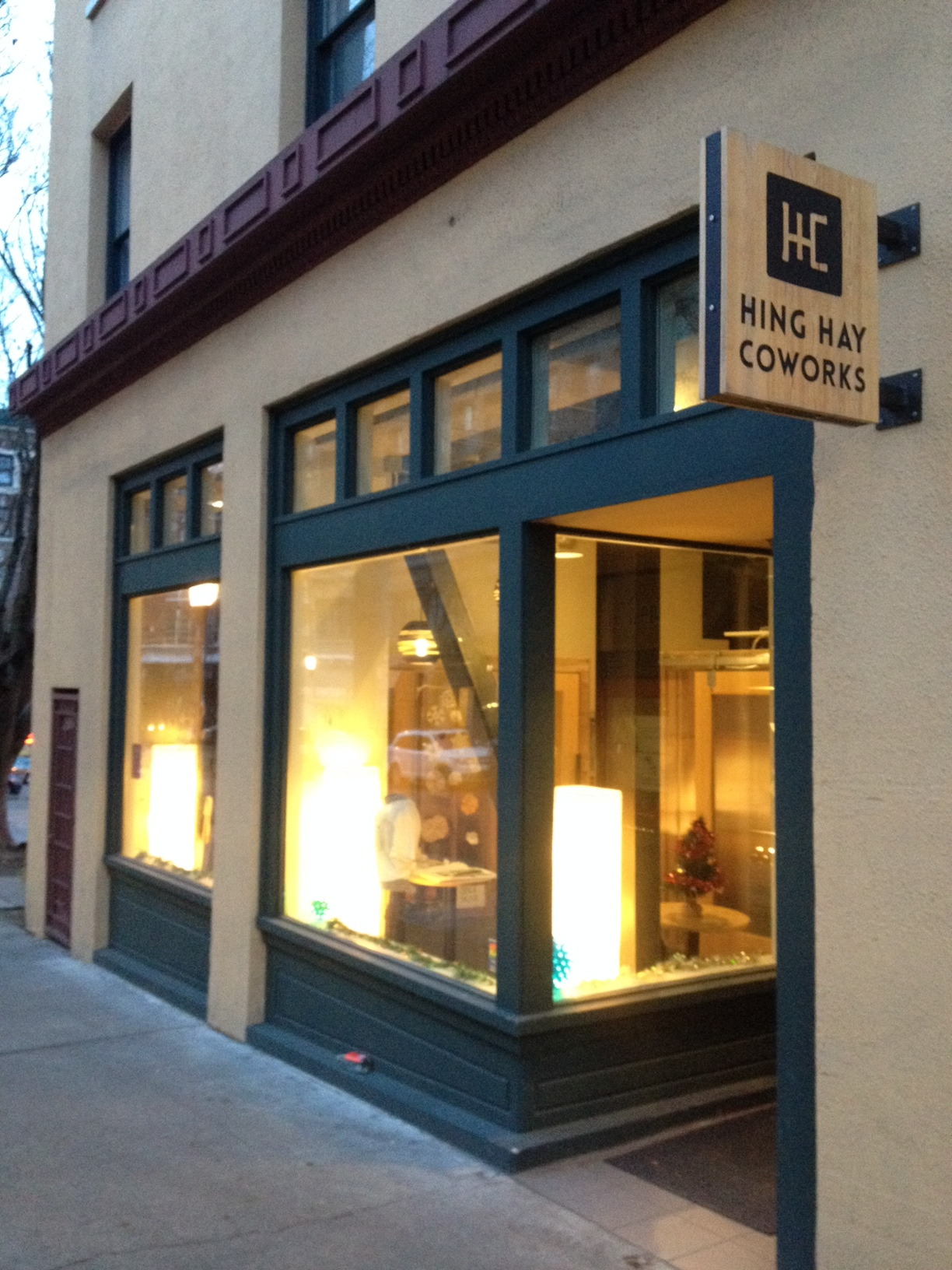
What is more, Galvanize was only a brisk ten-minute walk from the International District, and Stephen Mok resembled many a Hong Kong American whom I had met while still at Hing Hay Coworks. Now, it was unlikely that Riley knew anything of my experience at HingHay, and I was fearful of negative spill-over coming from same and Stephen Mok. After all, the start-up community and Seattle collective workspaces constitute a fairly small, and very mobile community, and the chances of Stephen Mok frequenting Chinatown were high.
To insure that Riley understood my appreciation for our special relationship, I purchased him a bottle of quality Scotch whiskey and presented it in a private meeting in Galvanize's basement in the very place where the King County Libertarian head, Riley, and I discussed liberty, Lincoln's controversial War of Consolidation, and the future of liberty in Pioneer Square, Seattle.
The Microsoft Staircase
Shortly after I arrived at Galvanize I learned that the massive, ornate staircase that led from the 4th to the 5th floor was a donation from Microsoft Computer. It is an elaborate structure that is constructed nearly in the middle of the floor and was used as a backdrop for at least four film events during the several months that I was at Galvanize. Of course, I was an Apple user, as were most of my colleagues.
It was at the foot of this staircase where one of Seattle's TV networks had filmed an event in support of Network Neutrality -- still another modern liberal movement that is socially well-intended, but whose proposed solution depends on an ever-larger administrative state for its implementation -- and that my Galvanist career would come to an abrupt halt.
 The base of the staircase is formed by a rounded, wooden pavilion with built-in cushions along the outer rim. Its expanse prevents a straight run between the kitchen and the workspace proper and forms, as a result, a heavily traveled arc around which two Galvanists moving in opposite directions cannot pass without the one on the outer orbit ceding space to the other on the inner orbit. It was aesthetic and required social interaction and physical negotiation to maneuver around.
The base of the staircase is formed by a rounded, wooden pavilion with built-in cushions along the outer rim. Its expanse prevents a straight run between the kitchen and the workspace proper and forms, as a result, a heavily traveled arc around which two Galvanists moving in opposite directions cannot pass without the one on the outer orbit ceding space to the other on the inner orbit. It was aesthetic and required social interaction and physical negotiation to maneuver around.
One day, I was one of two Galvanists moving in opposite directions along the arc. I was on my way to my desk and the other was presumably on her way to the kitchen or perhaps the toilet area where the dog-flier had recently been taken down.
My reason for having been in the kitchen was to get away from the incessant chatter of the very person with whom I now stood face-to-face at the foot of the stairs. Had it been anyone else I probably would have just made my way around her in a common display of male-female courtesy. Unfortunately, it was the floor's divorced, French-speaking, Moroccan, socio-feminist without her hyper-sensitive dog, and I was already ill-disposed in her regard. She was not about to move and I had no desire to engage in the very small-talk that I had just sought to avoid. So, I stepped aside and brushed her as I past, whereupon she accused me of pushing her. I stopped dead in my tracks, turned around, as did she, and looked her squarely in the eyes in silence waiting for her to demand an apology. She did not. I stated, "I don't get it!", and walked away. Whereupon she announced to everyone within audible range that I had pushed her.
It was Minsoo and SURF Incubator all over again. Only this time there was a friendly witness, Riley, and no Candace Grass. I simply returned to my desk and set to work, for her emotional outburst would surely take time to settle, and I would be well focused on my work upon her return.
Peterson Betrayal
Many minutes later I was approached by Riley, and we entered an empty office. During our conversation he told me that he had received several complaints about my aggressive behavior and that he had decided to terminate my membership.
Riley?
In defense of the innocent he could not reveal his sources. So, I made an effort to guess who my accusers were, to give reason for their possible animosity in my regard, and to demonstrate that I was likely being used as a scape goat for their own estranged relationships. Further, I recommended that he speak with Roger, my friend and very helpful Galvanize mentor, and his girl friend who were seated directly opposite the staircase when the event occurred and obtain their side of the story. By the end of our conversation, Riley told me that he would withhold his decision and investigate the matter further. Though greatly relieved, I still could not believe that Riley had made his decision to terminate my membership even before our consultation.
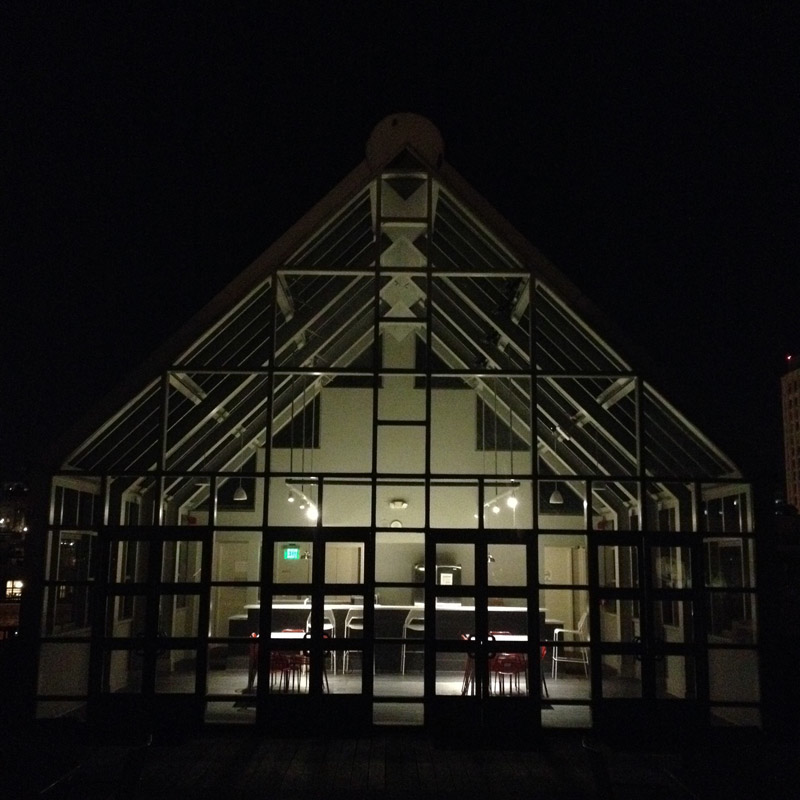 We parted, I grabbed my backpack and went to the gym where I typically spend my late afternoons. There I enjoyed a good work-out and followed up with a trip up the hill to the St. James Cathedral where I had my late afternoon, early evening dinner. When I returned to Galvanize for my second shift, I went to the roof -- my new resting place after having been banned from the cellar and my early evening nap. I was surprised when the elevator door opened, for there was Riley standing all alone, as if he were waiting for me. I greeted him with a smile and asked what he had discovered. He replied that everything was worse.
We parted, I grabbed my backpack and went to the gym where I typically spend my late afternoons. There I enjoyed a good work-out and followed up with a trip up the hill to the St. James Cathedral where I had my late afternoon, early evening dinner. When I returned to Galvanize for my second shift, I went to the roof -- my new resting place after having been banned from the cellar and my early evening nap. I was surprised when the elevator door opened, for there was Riley standing all alone, as if he were waiting for me. I greeted him with a smile and asked what he had discovered. He replied that everything was worse.
When I asked whether he had spoken with Roger, he replied, "No".
Now, I do not know what was going through Riley's mind, but it was clear that factual testimony was not important. In vain, I appealed to his good common sense and explained that this was not the first time that I had been the victim of a cabal and that he should not allow himself to be persuaded by one. Further, I explained that Minsoo had been fraternizing with my accuser and others on her team and that there would always be trouble in my regard so long as Minsoo remained. It was then that I learned that Minsoo had quit Galvanize only a week before, and I cried out, "Problem solved!".
Riley disagreed. In fact, he now believed that I was the source of the problem between Minsoo and me.
Was I now being blamed for Minsoo's departure? It was simply unbelievable. I rarely ever spoke about Minsoo to anyone and when so only about his behavior at Galvanize in the moment that it occurred. Minsoo was Minsoo, and he would eventually come across to everyone in the same obnoxious manner. So, I suggested that Riley give the matter time and see how much things would change between the others and me now that Minsoo was no longer present to fan the fire.
He replied, Roddy, you must go. Having exhausted every argument that I could muster, I asked by when I must leave. He replied, "Tonight!". I had nothing more to say and headed for the elevator.
Riley had been hoodwinked, overwhelmed by nonsense, hyperbole, and petty vengeance. His only concern at the moment was how he would be viewed by the cabal and the Galvanize community at large. It was the Bread of Life Mission -- round two! Only this time I was not "a danger to myself", but "a danger to everyone else". A diametric twist. Once again, no foul language, no raised voice, no threats of physical violence, and no physical violence. My crime? I brushed a hypersensitive sensationalist in passing. Nearly every day in the bus I am more rudely handled by fellow riders during rush hour traffic. Yep, I was a danger to the Galvanize community.
In reality, my presence was a threat to Riley's position at Galvanize. Our friendship meant little in contrast. I know of no other way to explain his behavior.
As soon as I arrived downstairs, I called Chris Barnett, a former Galvanist and friend. When Riley came downstairs many minutes later and told me that he knew of a place for me to spend the night, I declined and told him that his token gesture was no substitute for the pain that he was causing me. Whereupon he left the room. I continued packing. Within the hour Chris arrived, and I departed from Galvanize unable to say good-bye to any of my colleagues. There was no one around to whom I could say good-bye. As a symbol of my despair and steadfastness, I left my deceased iMac standing on my desk.
When I saw on the following day that my Galvanize Slack account was still active, I sent a public message in defense of my abrupt departure, offered my gratitude for all the technical support that I had received during the course of my sojourn, and said, "Good-bye". It was my last Slack message before my account was closed.
Several weeks later Chris received a message from Galvanize in which Riley Peterson announced his departure from Galvanize. I felt vindicated. Clearly. I had become the victim of Riley's own failed Galvanist ambitions. The parallel with the Bread of Life Mission was uncanny.
If there were an underlying cause for my expulsion, then perhaps it was indicated with a post-departure email invitation from Armand to share music over the internet. For the one standing complaint against me from my fellow co-workers was my refusal to block another's distraction with my own -- namely, stuff my ears with something of my own preference. For, this was the Galvanist solution to social disruption and potential social friction of all kinds -- close your ears to your surroundings and listen to your own distraction.
To this day I have not purchased an ear-bud, but when I see them worn by others much younger than myself, I pause for thought, and ask myself, if it is not a short-term fix for a deeper, underlying, long-term problem -- shutting out the world around you except for when it meets your needs.
It Was Not Paradise
It was nearing the end of the 2017-18 school year, and young Andrew, Chris's son, would soon be spending the vacation with his mother in Texas. What is more, Chris was in the process of moving from one residence to another, and I was invited to stay in his old residence until the move to his new residence was complete. This would provide me with the time required to find a new collective workspace and shelter. It was a very difficult time for me, and Chris was sympathetic with my plight.
So, I offered to help him with his furniture and other things, and over several days Chris, Andrew, and I completed the move with the help of a U-Haul truck and trailer, whereupon I was invited by Chris to spend the summer with him in his new home while Andrew was away in Texas. It was not an easy time.
Although I could overlook Chris's distain for Donald Trump by simply avoiding any discussion about his presidency, every morning I was compelled to listen to National Public Radio (NPR - KIRO News) -- the pulse of America's so-called modern liberalism. Indeed, Chris was my natural political enemy, and I was now dependent on him for my food and shelter, even clothing on one occasion. Alas, I fell silent, afraid that I might abuse his good will by espousing my classical liberal mind. We had never spoken about politics at Galvanize -- only MySQL. And, at his house during the two parties that I attended I had had such good political discussions with his friends.
 What, however, was my alternative? I had now been compelled to exit four shelters and four collective work spaces in a span of not even two years. I no more felt at home in a shelter than I was allowed to feel comfortable in a collective work space once it became common knowledge that I was homeless. My dual lives that I had sought so hard to keep apart were simply not sustainable, and my thoughts were beginning to turn again toward Tiger Mountain.
What, however, was my alternative? I had now been compelled to exit four shelters and four collective work spaces in a span of not even two years. I no more felt at home in a shelter than I was allowed to feel comfortable in a collective work space once it became common knowledge that I was homeless. My dual lives that I had sought so hard to keep apart were simply not sustainable, and my thoughts were beginning to turn again toward Tiger Mountain.
I had given it my all, and I was nearly ready to begin podcasting. But where? Riley had destroyed all promise for the fall, and my residency with Chris was at best transitional. What I needed was an office that I could afford and a living situation that would free me from the stigma and vagaries of being homeless. For, why bother to grow a podcast audience, if it could be pulled out from under me at any moment for whatever reason by whoever was in charge of my current whereabouts?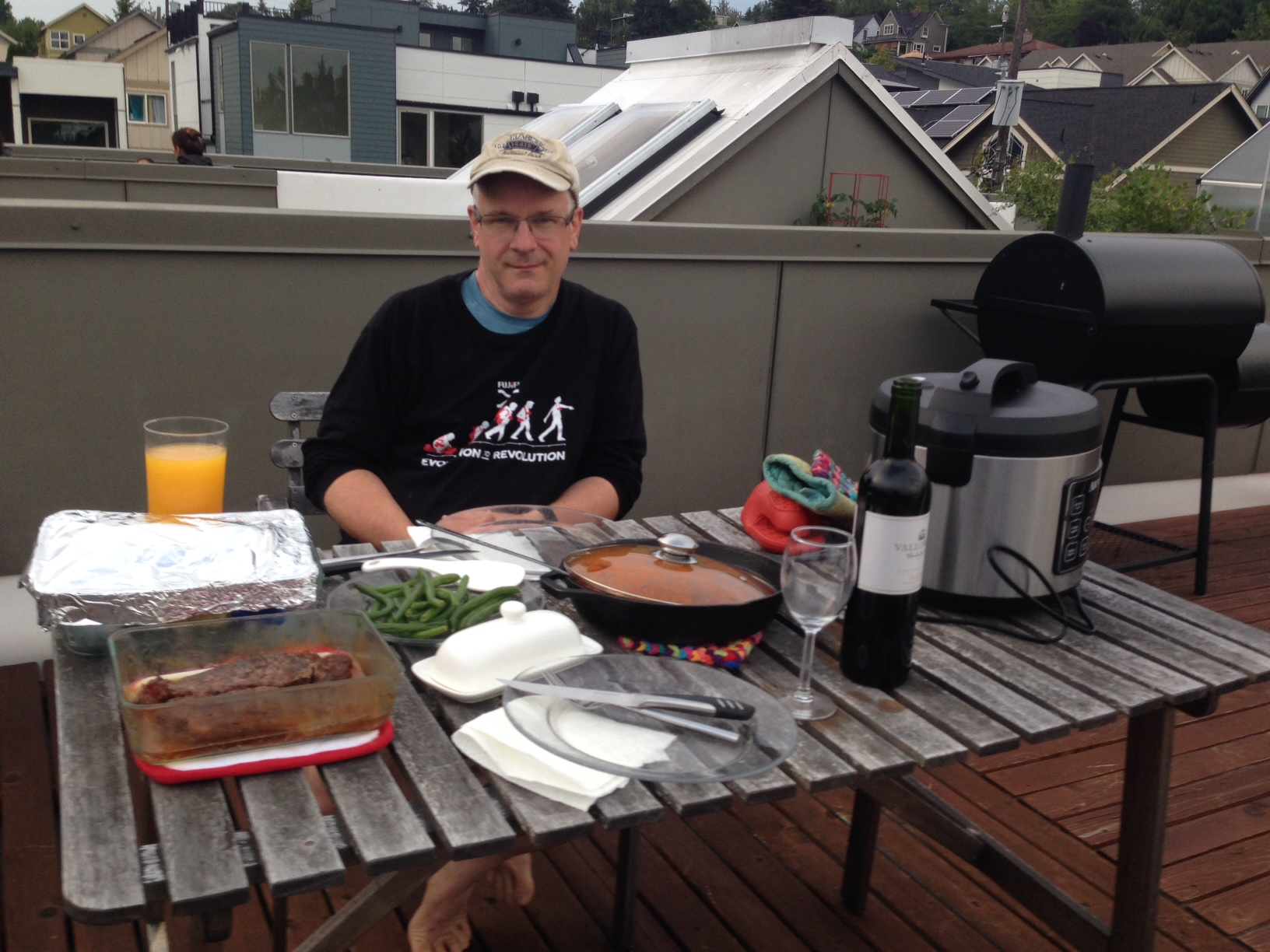
Chris and I are still friends, and he knows me to be tidy, polite, and clean. Simply, we dare not talk very much about the role of government and politics when we are together without the presence of a third party.
Out of the Muck - An Open Letter
Surely, I had made tremendous strides in my self-training as a web-developer, but these skills were no more marketable at my age than were my over 30 years of experience as a university instructor teaching English and economics. Either Grammar Captive would succeed, or my ship would sink, and I as the proud commander would go under with it -- captain of his own tragic fate.
No, this was not how I wanted my story to end, but this is an end that I am prepared to face and with which I was surely confronted this past summer.
 So, I began exploring alternatives to living in a shelter that culminated in an open letter that I sent to a Seattle organization called Facing Homelessness. The best that they could recommend was couch surfing. Couch surfing? This is what I was already doing at the Barnett residence -- something that would never have taken place, had Chris and I not already known each other.
So, I began exploring alternatives to living in a shelter that culminated in an open letter that I sent to a Seattle organization called Facing Homelessness. The best that they could recommend was couch surfing. Couch surfing? This is what I was already doing at the Barnett residence -- something that would never have taken place, had Chris and I not already known each other.
In effect, Facing Homelessness had finally responded after my second email with the following:
Thank you for sharing your open letter with me and your current situation as you try to transition into a more permanent space. Unfortunately, we don't have any housing available and we haven't been able to come up with any housing resources we can recommend. One thing we did think of is the [couch surfing community] because you have a solid skill set that you could trade for a place to stay. This may not provide a 6-month solution but it was the option we thought of after hearing about your situation.
Yes, I had offered to trade total English language immersion in exchange for a roof over my head! After all, what better way to learn a second language than to live with a native-speaker -- especially one, with several decades of experience teaching in an English language classroom.
So, I posted my letter on the There Is No Them Twitter channel, and what followed was an article written by a journalist named Kate Walters for Seattle's local NPR broadcasting channel (KUOW News). I was exasperated and shot back with my own take -- written by a two-year homeless veteran -- on the homeless situation in the city of Seattle.  And, in the same breadth still another article, but this time underscoring the thesis of my hunger strike nearly two years before.
And, in the same breadth still another article, but this time underscoring the thesis of my hunger strike nearly two years before.
And, what came of this effort?
Nothing. Neither an invitation for an interview, nor the opportunity to see either of my two articles published. Not even a retweet. What made this occasion different from the fall of 2016 was my response to my own disappointment. I simply did not care. No response was expected. For, I had learned that the homeless do not have a voice that is not represented by their handlers.
It is pretty much how foreign visitors and correspondents to Japan are treated when they do not make an effort to learn Japanese. What they receive by way of information about the country is filtered through the lens of either pro-Western bilingual Japanese or English-speaking Japanese public relations officers. Unfortunately, it is through these handlers that the vast majority of us learn about Japan, and as a result never come to truly know it.
There Is No Them. Oh, Really?
 In the American tradition religion and politics are separate matters, and the idea that someone would run a political campaign as if it were a religious philosophy of love seemed -- well, at best, disingenuous or even fraudulent. No matter, the idea was already in place by the time I discovered that my friend, Robin Koerner, had teamed up with the very same who had directed me to a dead end when I returned from Saudi Arabia to the United States in 2015.
In the American tradition religion and politics are separate matters, and the idea that someone would run a political campaign as if it were a religious philosophy of love seemed -- well, at best, disingenuous or even fraudulent. No matter, the idea was already in place by the time I discovered that my friend, Robin Koerner, had teamed up with the very same who had directed me to a dead end when I returned from Saudi Arabia to the United States in 2015.
I had been in search of financial backing to promote liberty, help America recover its lost heritage, and establish a new home in which I could feel comfortable. Matt Dubin was the only officer on the Libertarian Party webpage who responded to my call. Two visits to his office, several emails, and two telephone calls later produced, however, no better a result than I had already achieved without his help. Whether this was the fault of Matt Dubin or the Libertarian Party to which he belonged did not really matter. It was clear that there was something amiss and that I should find another avenue.
When I was invited by Robin to attend a meeting with him and Matt Dubin to discuss homelessness, I volunteered to meet with them in Matt's legal office in downtown Seattle. After all, Robin was my friend, and I was a well-educated homeless person who shared similar ideas about the role of government in society. Only a year and a half before I had put my own life on the line in protest against America's unAmerican spoils system.
After answering a few questions I listened to Matt promote himself as would a salesman: he offered a well-rehearsed message. Although I found the idea of solving the plight of Seattle city's homeless challenging and therefore interesting, his solution addressed only a part of the problem. And, when I suggested my own solution, it was rejected. Either Matt Dubin did not understand the homeless plight, or I did not understand Matt Dubin. Now, I am certain that I do not understand everything about homelessness, but having, myself, been homeless for the past year and a half, I could not help but feel that Matt Dubin was not the solution.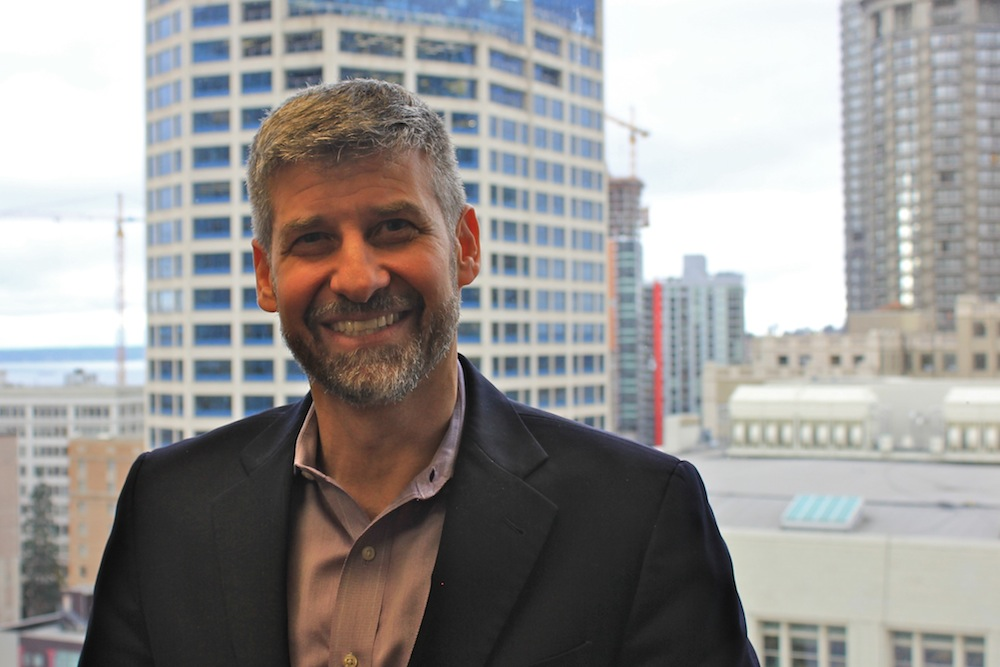
No matter, we planned to meet again, for there were certain things about which we surely agreed, and I was prepared to compromise my own position for the good of Matt Dubin's campaign, if it meant getting my own voice heard. I was never invited back -- this, despite Robin's reassurance that Matt Dubin was keen on the idea that we should meet again. My suspicion only worsened.
Why would anyone base a political campaign on a highly visible political football of minor social consequence? Surely, homelessness is a problem for the homeless, and surely the city of Seattle must forever clean up after them. Most people, however, just walk around them in pity or disdain and go about their business. What is more, the real causes of homelessness lie elsewhere: a perverted welfare system, indiscriminate charity, a manipulated money supply, poorly designed zoning laws, drug prohibition, the relentless disintegration of Western family structure, a broken justice system, and a real estate industry that screens tenants based on a select number of statistics that may or may not reflect the true character of the applicant and his ability to pay. More importantly, Matt Dubin insists that he wants to find a cure for the problem of homelessness and not just treat the symptoms. In effect, all he is really proposing is a community-friendly, market treatment of the symptoms that upon further research I discovered to be more talk than action -- in short, business as usual when it comes to the homeless and many, certainly not all, of those who claim to be helping them.
Though barely positive in its final outcome, Matt Dubin's political strategy was merely an appeal for working together -- the kind of message better promoted by a priest, pastor, imam, community leader, or head of state, not a congressional contender. Indeed, if he cared so much about the homeless, why did he not join hands with those whose hard work he praised, rather than run for the State legislature very distant from the real problem.
Robin's idea is that logic is only as persuasive as the heart is open.  And, that you must first open the heart, before you can reach the mind. In brief, you must first acknowledge the world as your adversary sees it, before you can begin to persuade him that another way of looking at the the same might very well be better. In principle it makes good sense, but it assumes necessarily that the other side is even looking for a solution that is not its own.
And, that you must first open the heart, before you can reach the mind. In brief, you must first acknowledge the world as your adversary sees it, before you can begin to persuade him that another way of looking at the the same might very well be better. In principle it makes good sense, but it assumes necessarily that the other side is even looking for a solution that is not its own.
My biggest problem with the There Is No Them campaign is that it moves contrary to political common sense. Political parties are by their very definition special interest groups with particular goals that can only be achieved through political imposition -- namely, one group of people imposing its will on another. In a democratic society with republican government, this imposition is usually achieved through elections, lobbying, the legislation of new laws, and their legal enforcement. So, how is it that a candidate for public office can run as the member of a political party and claim in so many words that political differences are non-productive. Who is he trying to fool? Either he is terribly confused and is attempting to perform the impossible, or he is a political charlatan without a clue. Had Matt Dubin, at minimum, run as an independent and denounced all party affiliation, his message, if not his true motivation, would have, at least, been credible. That he succeeded at all in the small manner that he did in the run up to the 2018 mid-term election can only be explained by the fact that there are others, like Matt Dubin, who are just as lost as he is.
In the end, Matt Dubin treated me as just another homeless person with an opinion and went about his way. During his entire campaign I never received a phone call, text message, or email coming from another with the words, "Matt Dubin told me that you are looking for a place to stay. Is there some way that I can help."
Looking back I am happy that I failed to bring the headquarters of the King County Libertarian Party to the City of Seattle. For, the Libertarian Party appears to be more of a drag on the Liberty movement than a leading political force. Have I finally understand why Ron Paul attempted to run on the Republican ticket in 2012? No matter, I am now advocating that the Libertarian Party merge with the Republican Party. After all, the American public is wedded to the two-party system, and Libertarians would likely be far more effective as a faction of the Republican Party than its adversary.
In the end, the solution to homelessness is not providing everyone who is homeless with shelter, food, and clothing by forcefully diminishing the quality of the shelter, food, and clothing of those who already have these things; rather, it is by teaching self-reliance, defending the public domain, protecting the rights of the individual, and insuring that markets remain competitive.
Only those who truly cannot fend for themselves are deserving of charity, and this charity must come from the heart, where it is carefully nurtured, or not at all. The phony Robin Hoods that populate our political offices today are not the solution to our nation's needy; rather, they are a source of unending social friction and an excuse for not having to care. In his inaugural address as 35th President of the United States, John F. Kennedy, stated on January 20, 1961,
Ask not what your country can do for you; ask what you can do for your country.
In effect, society owes us nothing. If anything, it is the individual citizen who owes society. For, without society most individuals would surely perish left unto their own means and solitude. Then too, government does tax, and we, as citizens, do expect something in return. Exactly what to expect has always been a source of contention. There was a time in our history, however, when we did agree that government officials should live up to their constitutional pledges.
 The idea that government officials should be to a people what good parents are to their children is simply misinformed. We no longer live in a day and age of close tribal communities in which everyone knows everyone else. In such communities it was clear who was deserving of community favor and who was not, and all individuals were rewarded, pushed aside, promoted, punished, or even expelled depending on their reputation and contribution to the community. Today, even voluntary charity is given indiscriminately to whoever extends his hand, and involuntary charity, once extended, easily becomes a permanent life-long claim that is delivered to one's private bank account on a regular basis.
The idea that government officials should be to a people what good parents are to their children is simply misinformed. We no longer live in a day and age of close tribal communities in which everyone knows everyone else. In such communities it was clear who was deserving of community favor and who was not, and all individuals were rewarded, pushed aside, promoted, punished, or even expelled depending on their reputation and contribution to the community. Today, even voluntary charity is given indiscriminately to whoever extends his hand, and involuntary charity, once extended, easily becomes a permanent life-long claim that is delivered to one's private bank account on a regular basis.
A society that fosters adult dependents is a society that fosters its own demise, and those who advocate such behavior should be denounced as irresponsible and not as the caring individuals that they claim themselves to be.
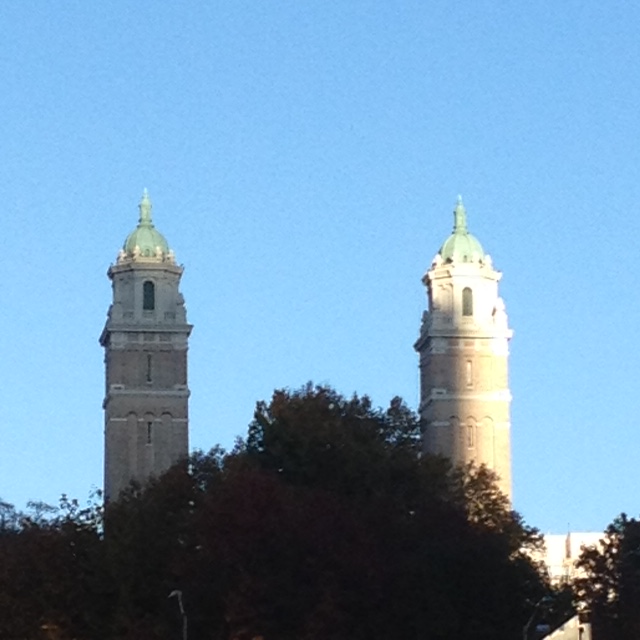 What does it mean, I ask you, when a church provides to the community-at-large a portion of its own donations regardless of the individual's temperament, personal history, social disposition, or life-style? Clearly this is a symptom of the reckless neglect with which we view our own citizens and children's future.
What does it mean, I ask you, when a church provides to the community-at-large a portion of its own donations regardless of the individual's temperament, personal history, social disposition, or life-style? Clearly this is a symptom of the reckless neglect with which we view our own citizens and children's future.
Treating everyone the same only applies when everyone is equally deserving.
The Aloha Inn
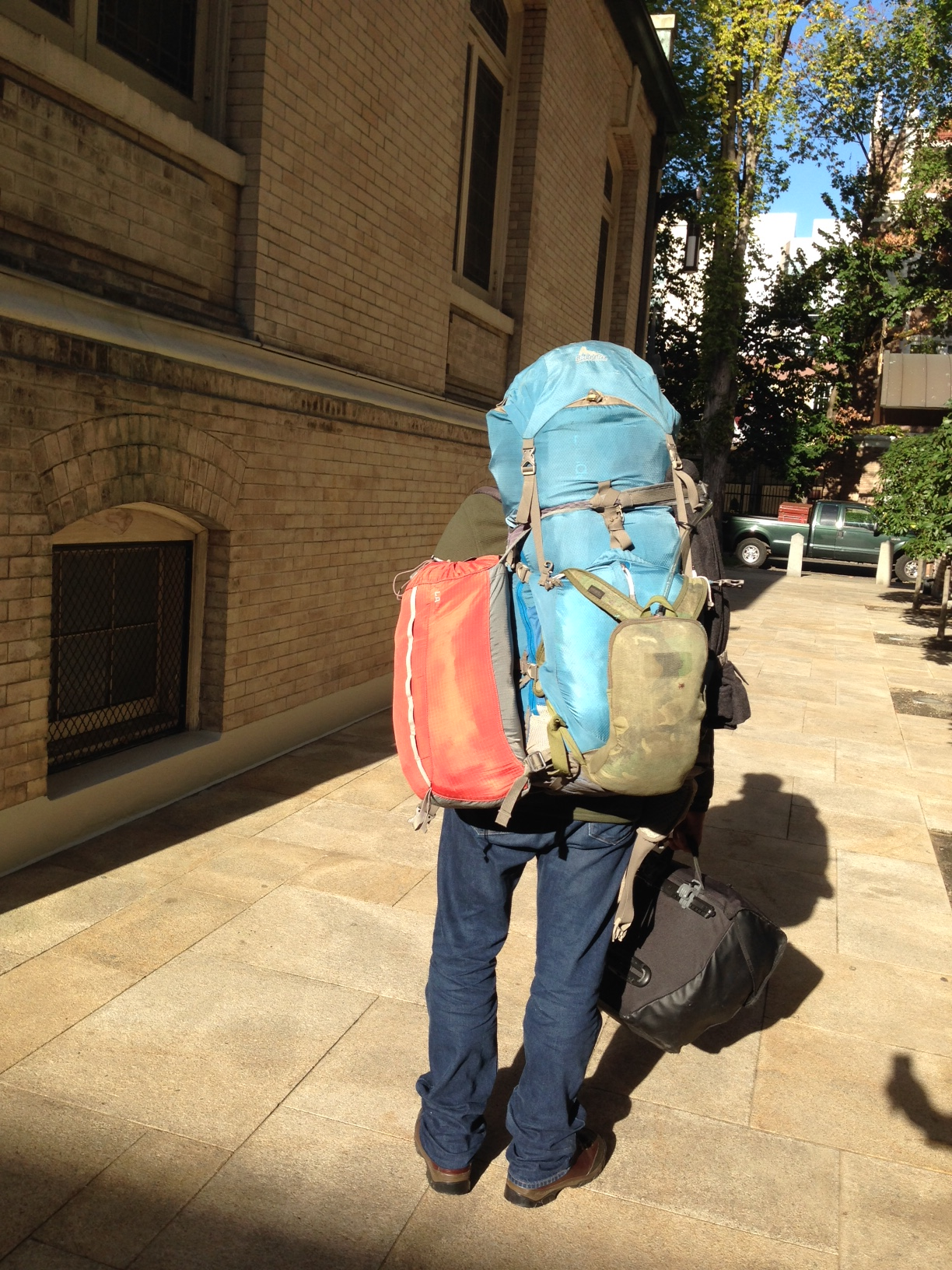 When it was clear that my additional attempts to escape the social muck into which I had been pushed had failed, I confirmed with Chris his intention to see me exit before his son returned from Texas. My tidiness, cleanliness, work ethic, and moral integrity were simply not a strong enough incentive for him to share his family with my plight, and I began planning my departure. Still, I was grateful. He had provided me with a sort of vacation away from the homeless rabble with which I was beginning to feel permanently associated.
When it was clear that my additional attempts to escape the social muck into which I had been pushed had failed, I confirmed with Chris his intention to see me exit before his son returned from Texas. My tidiness, cleanliness, work ethic, and moral integrity were simply not a strong enough incentive for him to share his family with my plight, and I began planning my departure. Still, I was grateful. He had provided me with a sort of vacation away from the homeless rabble with which I was beginning to feel permanently associated.
Already a year before I had investigated the Aloha Inn as a possible alternative to shelter living, but declined the opportunity to move in when the offer finally presented itself.
The Inn was recommended to me by Jon Prosiv who had befriended me while still at the Solanus Casey Center, an affiliate of the Catholic Archdiocese of Seattle. I had just been evicted from the Bread of Life Mission for my own good and was sleeping on the couch at Hing Hay Coworks. Jon understood that my time at Hing Hay would be limited, and suggested transitional housing as a way for me to overcome the grind of shelter living. Already I had been homeless for more than six months, but had yet to experience a real shelter. At the Bread of Life I had my own bunk for which I paid five dollars a night to reserve.
Getting into the Aloha Inn was procedural in nature, and the procedure could last anywhere from six to nine weeks beyond the two initial screenings.
At first the Inn refused me. They did not consider my unsolicited privilege of sleeping on a public couch at Hing Hay Coworks where I was a paying member to be the same as sleeping on a mat in the plush basement of the Seattle Municipal Tower where someone else paid my way. Thanks to Jon's intercession this misnomer was removed, and I was placed on the waiting list at the Inn. By the time I received my invitation to enter, however, Hing Hay Coworks had already declared me a persona non grata, and I was now sleeping on a mat at the Seattle Municipal Tower.
From the Tower it was only a two-block walk to the YMCA and only one additional block to my new place of work at SURF Incubator in the Well's Fargo Center. Staying at the Aloha Inn would have required 15 hours of work per week, a ten-dollar per week rent payment, and the boarding of a bus every morning and evening in order to complete the commute. What is more, there would be a savings requirement, and I was already paying USD 50 more for my new office accommodations at SURF Incubator. When my invitation to enter the Inn finally came, and miscommunication between the Inn and me caused me to spend an additional three days in the shelter, I balked and declined the invitation.
Despite the Grass' dislike for my under-the-desk presence at SURF Incubator there was no rule that denied the presence of a suitcase or two so long as they did not detract from the professionalism of the work place. They were TUMY bags -- very professional -- and I had arranged them so that only the smaller of the two was visible from the race-track. In order to insure that no mistake could be made about the ultimate purpose of my under-the-desk presence I proudly displayed two boxes from Office Depot between the two bags. Obviously, for the two Grasses no amount of conciliation would ever be sufficient. Unfortunately, I did not know this at the time that I made my decision in favor of the Tower.
So, many months, two additional collective work spaces, two additional shelters, and a long series of successfully completed technical feats later, I applied for a second time to the Aloha Inn and was accepted again. Ironically, my application was similarly plagued by procedure. For, at the time of application I was sleeping on another couch, but this time in a private residence where I was a welcome guest. Fortunately, no intercession on the part of Jon would be required; I had only to make a special visit to the Inn and fill out the form again. Even more ironical, I was already in still another shelter when I finally received the call informing me that an opening was available. Yes, I was homeless de jure and de facto. Yes, I was in my fifth shelter in the space of less than two years and with many of the same people whom I had not seen for more than six months.
It is called the homeless community, not because there is anything communal about it, rather because it is the same people doing the same nothing in the same places over and over again.
Only later did I discover that Jon could not have interceded anyway. For, he had accepted a teaching post somewhere outside of Seattle, and my soul reliable connection at the Solanus Casey Center was now broken. Jon had not bothered to say good-bye.
Twice in Three Months
Everyone who has ever lost a wallet knows how painful the experience can be. Fortunately, on both occasions, I was able to replace almost everything that went missing and was of particular value. On the first occasion, however, the greatest loss was not the time, money, and energy expended in replacing my wallet's contents, but the loss of the wallet itself.
The wallet was a souvenir that I had purchased at Isetan in Tokyo in the summer of 2012 when I presented my most recent paper on central banking and inflationary money at a WEAI (Western Economics Association International) Conference at Keio University. It was a tall wallet made from genuine leather that one typically places in the inside pocket of a formal jacket and would be quickly ruined or lost, if placed in a back pocket of a pair of pants when seated. In such a wallet nothing is ever folded, and when something is removed, it issues forth both flat and straight ready to be counted and placed in a drawer. It was my pride. While homeless, I carried it in my back pocket, ready for anyone to pick, and always placed it in front of me along with my cell phone whenever and wherever I sat. There is no telling how many times people warned me that my wallet would someday be picked, but my wallet was not stolen in this fashion. Rather, it was taken from where I had left it lie after having removed it from my back pocket so as not to be damaged when I sat.
It was in the wee hours of a cold, damp Seattle morning while waiting for a Galvanize party to end so that I could regain my window bench and a good night's rest in the 4th floor's main conference room that I lost my wallet.
I left for the day at about 11:30 PM with the hope that two hours later the Galvanize staff would have finished cleaning up, and I could return. I went to the Hong Kong Bistro in the International District, my usual place to hang out under similar circumstances, and remained until closing. Although the hot meal and warm tea had prepared me well for the cold and my return walk to Galvanize, it had quite the opposite effect in what would follow.
When I returned to Galvanize I notice that the staff had yet to go home. Rather than entering I went to Occidental Park where I walked around for many minutes while I contemplated reentering the space before everyone had left. In the end I decided that it was better to brave the cold in the park than to risk being discovered in the building so early in the morning. So long as staff believed that I was sleeping in a shelter and not in the building, my bench was secure. And yes, despite the now more frequent interruptions brought about by the appearance of the new events manager, sleeping alone on the bench at Galvanize every night was still far more restful than sleeping with the homeless in a shelter, no matter the location, nature of my resting place, or management team.
Already I had walked around Occidental Park several times when the urge came. I looked in vain for a toilet, but at 2:30 AM in the morning nothing was open. In the end I decided on a construction site. Unfortunately, by the time I had emptied my pockets and descended my trousers nature had already begun its course. I had become the woman on the street with the bare buttocks, but was only partially successful in my effort to be as well-mannered as possible under the extenuating circumstances in which I found myself. It was surely the embarrassment of my failed effort that caused me to leave my precious wallet next to the pile of warm steaming defecation that I was finally able to deposit outside of my trousers.
 When I arrived at Galvanize the staff had departed, and I went straight to the shower to clean my trousers and lower body before ascending to the 4th floor and descend upon my bench. Three hours later I awoke with the sun, realized that my wallet was no longer with me, and returned to the construction site. Although my pile of defecation was still there, the wallet was gone. So, I covered my defecation with dirt and began calling my credit card companies.
When I arrived at Galvanize the staff had departed, and I went straight to the shower to clean my trousers and lower body before ascending to the 4th floor and descend upon my bench. Three hours later I awoke with the sun, realized that my wallet was no longer with me, and returned to the construction site. Although my pile of defecation was still there, the wallet was gone. So, I covered my defecation with dirt and began calling my credit card companies.
Indeed, the site was not even a block away from the Bread of Life Mission, and someone had beaten me to it. Who other than another homeless person would be up and about so early on a Sunday morning? My belief was confirmed when a homeless acquaintance at the St. James Cathedral asked me on the following Monday about my stolen wallet. How could he have even known? Word had gotten around quickly.
I never saw my wallet again.
My effort to find a replacement proved fruitless. Apparently, the informal dress of Seattle culture dissuaded the sale of such wallets. I went to Nordstrom's, Macy's, the Bergman Luggage Shop, and other stores in search of a similarly styled wallet, but could not find one. My pride could not be restored, and I settled for something far inferior and consoled myself with the savings thus achieved. The grind had manifested itself in still another pernicious form.
Stephen Mok
My second wallet was stolen from my only enduring location during the past two years that has not been virtual -- the YMCA (Young Men's Christian Association). This time, however, I was surely deserving of the theft; then too, I was also better prepared for recovery of the loss.
Ever since I became a member of the YMCA in September of 2016 I had been using a thin travel lock to secure my belongings while I worked out. It was only a matter of time before someone who had worked in security in the airline's industry would come along with a key to open it. Then too, the lock could have been sheered with a modest cutting tool. Fortunately, my cell phone was not taken, and I was able to cancel nearly the entire wallet's contents before any real damage could occur. What is more, I felt very little pain by the loss of the wallet. In some ways, I was even happy to see it go, for now I could replace it with something much nicer; my pride was no longer in my way.
What made my second loss of interest was the way in which its contents were recovered. Since leaving Galvanize at the beginning of the summer I had been without a formal physical address. During this time I continued to use my old business address as my official address and conducted all of my business dealings online, so as not to disturb my previous business host and endanger the official appearance that my old address provided.
When I reported my cards stolen I was asked to confirm my current address, and remembered the good cooperation that I had received from Galvanize when my wallet was taken the first time. So, I asked that my new cards be sent to my old Galvanize address and notified the front desk at Galvanize of my action. Whereupon I waited a week, appeared at Galvanize, and picked up my cards. Everything seemed to be in order. The damage that Riley had caused me had been -- well, at least at Galvanize -- fleeting. I even felt welcome.
Within two or three days after my appearance I received an email from Stephen Mok, the new Galvanize membership manager, admonishing me for inappropriate behavior. In his email he told me to provide him with an alternative address or see my cards returned to their issuer undelivered. He recommended the Bread of Life Mission as an alternative. The Bread of Life Mission? It was surreal. Thoughts of Hing Hay Coworks, Candace Grass, the Dishonorable Judge Spearman, and Riley Peterson all suddenly came to mind. Sure, there were other addresses that I could have given Mr. Mok, but why impose on my friends or take the risk of having my mail taken from my box at the Aloha Inn? So, I promised Mr. Mok that I would not do it again, encouraged him not to return the remaining cards, and asked that I be allowed to retrieve them at the front desk. After all, I explained, why prevent what you have already permitted. Why turn a good gesture into bad? What good could possibly come of it?
My argument was convincing, and my new wallet, not as good as my original, but surely much better than my most recent, was replenished. In addition, I purchased a new, thicker padlock for my gym locker and checked further loss.
Stephen Mok had redeemed himself.
The Mudpuddle
Transition Into Transition
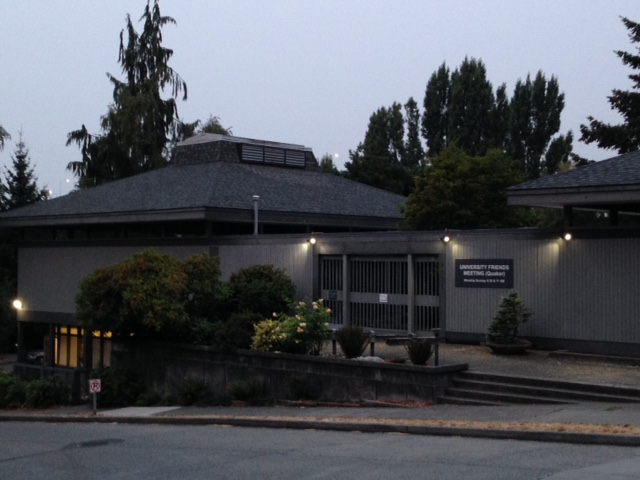 When I arrived at NightWatch after my nearly two-month sojourn at two Barnett residences I carried with me a large number of colored maps that I had printed while still at Galvanize in anticipation of my likely expulsion from same. On the maps were directions to the Quaker-run Friends Shelter in the University District close to the University of Washington. They were a gift to help expedite my return into the NightWatch program.
When I arrived at NightWatch after my nearly two-month sojourn at two Barnett residences I carried with me a large number of colored maps that I had printed while still at Galvanize in anticipation of my likely expulsion from same. On the maps were directions to the Quaker-run Friends Shelter in the University District close to the University of Washington. They were a gift to help expedite my return into the NightWatch program.
When I was told that I must quit the First Presbyterian Church in late February or early March, I had gone to NightWatch to discover my options and was given a map to the Friends Shelter. The map was a poorly reproduced black-and-white copy that was difficult to read. Even the directions were a long, defeating bus ride that I was loathe to take.
Sleeping at Galvanize had become touch-and-go, and I prepared the colored maps in anticipation of my eventual return to NightWatch. As it turned out I lasted several months at Galvanize and was compelled to leave for reasons very different from the abuse of unsolicited, overnight, bench privileges. Perhaps I had focused too heavily on the wrong concern.
When I left Galvanize, I did not return to NightWatch, but spent nearly two months at two different Barnett residences. Thus, it was about five months that I had been away from NightWatch when I finally arrived, and the promise that had been made was apparently forgotten. I spent the next several nights having to wait until everyone else was placed before I could secure a bunk at Friends. I do not know what happened to the maps, but I discovered a much better bus route that made use of my Senior ORCA travel pass.
When I arrived at the Shelter I insisted that I receive clean blankets and was given what I asked. I was then told that the blankets were mine for a week and provided with a plastic bag to stow them in. With the exception of the First Presbyterian Church where everything I owned was in danger of being stolen, I found this policy far better than any that I had experienced at a shelter thus far. Maybe my conversation with a visiting minister at NightWatch when I was still at the Boat Street shelter many months prior had produced its intended affect. In my elation I climbed the bunk to which I was assigned, laid down on the cleared mattress, and contracted my third bout of scabies since becoming homeless.
I should have known better than to think that management would wipe up after its guests -- no matter the shelter.
It was late summer, and the beginning of the rainy season was not yet in sight. As an alumnus at the University of Washington I was able to secure a locker in the student union (HUB) where I could store a week's worth of fresh clothing and my toiletries. 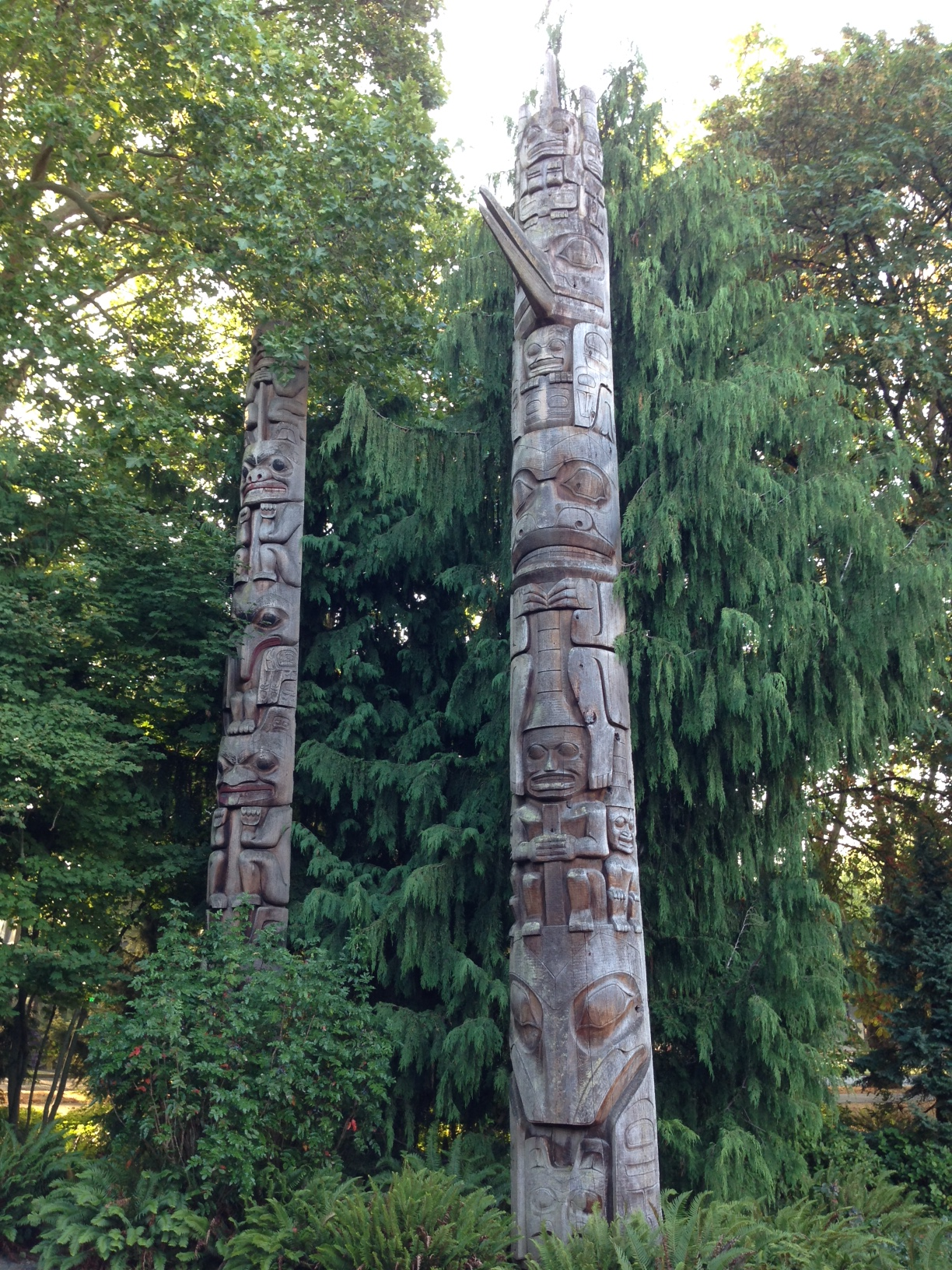
So, every weekday morning when we were awakened and warned that we must leave the shelter within the half-hour, I would don a fresh set of clothing on a somewhat clean body that I had showered at the downtown YMCA after the previous day's workout and head off to the Burke Museum where I sat outside and read Alexis de Tocqueville's De la démocratie en Amérique and tweeted liberty online until Costa's opened its doors at 10:00 AM. There, I consumed a plate of fried eggs once-over-easy and a dish of fruit. Eating breakfast out kept me poor, but over 50% of the weight that I had gained after becoming homeless was lost while in Chris's company and I wanted to keep it away. Eating protein in the morning is one of several keys to weight control. My windfall savings for not having to pay for office space made this simple luxury possible.
Before the month was out I received my invitation to enter the Aloha Inn.
Barbecue Pork, Sauerkraut, and BREXIT
Shortly before I left Chris's townhouse for the Friends Shelter I invited my friend Robin Koerner over to Chris's for a small party, and treated both Chris and Robin to a meal of barbecued pork and sauerkraut. I even purchased with my windfall cost reduction one of Robin's favorite beers.
Both Chris and Robin are British nationals who emigrated to the United States. Chris had already received his American citizenship a decade earlier, and Robin's was not even two years old. The goal of inviting Robin was to help reopen the door of communication between Chris and me that had been sealed shut by Chris's and my adamant adamant political views. As the United Kingdom had just voted to break away from the European Union, Chris and Robin would surely have something political to talk about, and Robin's position's on BREXIT, social democracy, and political and economic liberty were much closer to my own. It turned out to be a very good evening, whereupon I asked Robin, if I could stay at his apartment while Chris prepared for his son's return.
Robin agreed.
The Suzzallo-Allen Library
During the nearly two months that I stayed with Chris I paid no rent and donated my food stamps (EBT Card) to Chris's and my food supply. Already the discount that had been provided me while at Galvanize made it possible for me to upgrade from the Lunarpages' shared server to my VPS (virtual private server). Not having to pay any rent at all made me feel very rich. For the first time since I had left my apartment in the fall of 2016 I was able to pay down some of my debt and watch my credit rating improve. What I paid was not all that much, mind you, but it did serve as a source of reserve credit for whatever purpose.
Initially I had hoped that I would be able to use the UW library facilities as a place to begin podcast production, but was greatly disappointed when I discovered what little I could achieve with my UW Alumnus card provided free of charge by the UW Alumni Association when I explained that I was homeless, developing a company, and not yet able to purchase membership. Indeed, I could use the university's libraries work space and check out books, but was unable to reserve any of the rooms well-suited for podcast production. So, I spent the summer developing and prepared for the fall when I would enter the Aloha Inn, rent new office space that would accommodate podcast production, and begin podcasting. Well, this was the plan, anyway. In the meanwhile I had to solve the problem of laundry, for I wanted very badly to keep my life as a homeless person separate from my work as a web-developer and internet entrepreneur. A locker in the HUB to stow my clothing, a clean body, and a daily change of clothes was all that it would take to keep these two world's separate. Robin and Chris corroborated in this regard.
My Laundry Problem Was Solved
When I left Chris's townhouse for NightWatch and the Friends' Shelter I divided my immediate belongings into two leaving my computer hardware, books, and papers in a closet with Chris and taking my clothing with me to Robin's apartment where they were placed in still another closet.
For nearly two years I had been living out of a suitcase at Hing Hay Coworks, SURF Incubator, the Impact Hub, Galvanize, and the Barnett residences, now I would be living out of a suitcase in a closet. American society was getting its way, and my British friends were helping me to overcome it. Think for a moment, these were two established British-born Americans helping a native born American reintegrate into his own society.
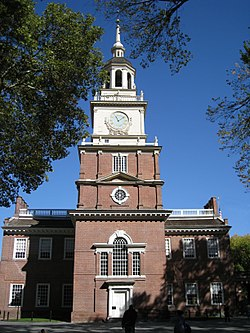 Not only had American society rejected me because of my paper age, but it was now forcing me to become it. Where before it wrongly viewed me as an international vagabond, already it had succeeded in turning me into a domestic one. And, I had returned home to help America rediscover itself. What a joke. How badly did I wish to return overseas.
Not only had American society rejected me because of my paper age, but it was now forcing me to become it. Where before it wrongly viewed me as an international vagabond, already it had succeeded in turning me into a domestic one. And, I had returned home to help America rediscover itself. What a joke. How badly did I wish to return overseas.
Still, my company was moving forward, and despite all odds and every imaginable calamity so was I. There is a cost to the production of every good, and if the good is great enough, the cost, no matter how great, can be endured.
If only, I could hold on.
So, rather than to carry my laundry all the way to the Bush Hotel in the International District, I took it to Robin's once a week for three weeks and obtained a free breakfast with freshly brewed English tea and milk.
Thank you, Robin
Paradise Lost
Shortly before I moved into the Aloha Inn, I met Chris at Robin's apartment in Magnolia where both were waiting when I arrived. Chris was to help me transport my clothing from Robin's to my new residence at the Inn. Though Chris and Robin were very upbeat about my new living arrangement, I was not. As I explained to them, it would be the same people only in a different living arrangement. I had spent the past two years in an effort to limit my engagement with the homeless community, and now I would be completely immersed in it. I was not excited about the idea, but at least I would no longer be a burden on either Chris or Robin.
I arrived at the Inn in the second week of September and celebrated my second full year of homelessness on September 11th. It was a quiet celebration in which I congratulated myself for having survived the grind for two full years while advancing the Grammar Captive website beyond anything that I had believed possible given the constraints of my own technical expertise.
My celebration did not last long, as I was soon presented with the choice of remaining at the Inn without the income necessary for new office space, or returning to my former dual life. It was surely another unwanted variation of my First Presbyterian experience, but things had changed within my own life that made me hesitate, and I remained.
I could end my annual report here and state, "Resolved: I will find a way to fill the time until I find low income housing". Neither would this do justice to my experience at the Inn, nor would it accurately account for my forward progress in satisfying my objective in having returned to the United States in the spring of 2015.
Since my arrival at the Inn I have yet to spend a week without thinking at least once about returning to the Friends Shelter. For, there is a hardly a day that passes in which I or someone whom I know is not the target of some malicious or negligent action on the part of someone else. Truly, if I were not able to spend most of the day at the university working on Grammar Captive, I would probably have left the Inn long ago. This said, I have been experiencing this sort of nonsense ever since Judge Judson declared on August 30, 2016 that reasonable allowance could not be granted on humanitarian grounds.
Whereas I saw the program as a means to soften the disparity of my dual-life as a homeless person sleeping in a shelter and commercial entrepreneur working in a collective workspace, the Inn saw the program as a way to get me into low-income housing that I do not want. There was obviously an important disconnect when I was screened for entry, but there I was and still am confronted with this important contradiction.
Most of the problem hinges around a forced saving requirement that requires that I set aside USD 45 per week in a monitored savings account. This amounts to USD 180 per month that is quite enough to make it impossible for me to afford even a floating desk in my desired collective workspace. This thought is especially painful when I consider how carefully I had researched the location of my new lodging and its proximity to the workspace. For, in this workspace are three so-called huddle rooms that are acoustically muffled; they are mini-conference rooms that appear to be ideal for podcasting. I even spent a day at the workspace in an effort to get a feel for its membership and compare it with my previous four collective workspaces.
The whole matter becomes absurd when I am told that I must place my savings into a savings account, rather than using them to pay down the outstanding balances of my credit accounts. Indeed, the Aloha Inn management actually believes that money stored in a savings account is safer than one's available balance in a credit account. Instead, they would have me receive one percent interest on my savings account and have me pay anywhere from 14-17% interest on my outstanding credit balances. To make matters worse, the current rate of inflation is double what I am earning on my current savings! Alas, until I entered the Aloha Inn I did not own a savings account. I stored my wealth in gold.
This, however, is not the end to the Aloha Inn's financial quandary. For, there is no account set up into which residents can pay their weekly rent through a simple account transfer, and everyone must patronize the US Post Office with the purchase of a money order!
Who knows? Maybe the Aloha Inn management believes that standing in line at the US Post Office is a learning experience requisite for the receipt of subsidized charity.
OK, for the moment I am a ten-minute walk and three-hundred dollars away from creating my first podcast. So, why do I not just do it? What is holding me back? Surely, it is not my new roommate who travels 20 miles once a week to wash dishes for ten-hours so that he can afford his long distance telephone calls to his wife and step-sister and complain about his plight as a 70-year old plus political refugee from Eritrea.
My Roommates
Surely, what my latest roommate is feeling now, is little different than what I felt when I was abandoned by my friends in the early spring of 2007 and became a financial refugee from Hong Kong in the same city that my roommate and I are both located now. I did not last six months in Seattle before I returned overseas with new employment in a society that I had never been. Still he insists that his pain is greater than mine, and I should accommodate his negligence in my regard and impatience with American society as a whole.
In the end, it is likely that he could not have found a more sympathetic and helpful roommate, but still he yearns for a single room and will quickly cast me to the winds for his own independence. And, who can blame him. Simply he will lose one of the best English teachers he has likely ever had. What is worse, he does not know it. For, on the one hand, he frequently insists that he understands the language better than I do; and on the other, has little desire to learn it anyway. He makes for a very bad student, and I quickly lose interest in helping him.
When we first met he showed me a copy of the US Constitution and led me to believe that he was studying to become a US citizen. Only after we decided to room together did he tell me that he had no intention to do so, and that his true motivation for being in the United States was temporary asylum. In Eritrea he has a wife and house and plans to return to these in the moment that the current Eritrean government is deposed.
He insists that Eritrea is hotter than Saudi Arabia, but he only knows the country from along the Red Sea on which he apparently commanded an Ethiopian destroyer. Unlike me, he has never lived in Saudi Arabia along the Persian/Arabian Gulf, which is far hotter than say, the port city of Jeddah, where I also lived, and which lies along the Red Sea.
In any case, he has a hard time understanding that I am his roommate and not one of his seaman. So, I suggested that we divide the room into two parts: Eritrea and Seattle. He could have the heater and turn it up as high as he wants, and I good have the window and open it as wide as might be reasonable given the heat. Truly he wants to control both.
In the end, I should not complain, because compared with some of the horror stories that I have heard while at the Inn I was wise to have selected a former military commander. For, he knows how to follow rules and honors the quiet hours as a result. In the end, all I want at the Inn is a place to stow my belongings and a place to sleep at night, and as much as I want or need, so as to escape the grind.
Like my first roommate at the Inn, however, my new roommate spends a lot of time in the room by himself. As there is no desk or table where one can work, this means that he spends a lot of time on his bed and eventually asleep. Thus, during the quiet hours when I am sleeping he is awake, and it gives me a strange feeling to have someone watching me while I sleep. This feeling is sometimes strong enough to even inhibit me from falling asleep. On occasion I will awake, get up, and leave, for during quiet hours it is often possible to find a quiet place to read in peace.
My first roommate at the Inn was a 54-year old modern liberal who, like my friend Chris, woke up every morning to NPR (National Public Radio). After awaking, he spent much of his time in bed, and probably for the same reason that my current roommate does. After all, the homeless community is a motley lot with little direction in life. It is also plagued with a variety of personal problems that result in asocial behavior. This results in turmoil and incessant gossip that makes finding a quiet place in the Inn's public places difficult.
The two saving factors were his seemingly desperate need for fresh air and cleanliness and his respect for quiet when I entered the room. Otherwise, he was extremely disorderly within his own sphere and was of the belief that respect from others was something that he could demand by virtue of his struggle to maintain his own seemingly miserable existence. That he consumed daily doses of trazodone to raise artificially the level of serotonin in his brain, but did little to raise the same through daily exercise, work, or social interaction did little to win over my sympathy for his obvious mental condition.
Certainly his presence did nothing to inspire me, and he eventually came to view me as a threat to his own self-pity.
Amazingly, we did manage to get along. Then too, all I really did in the room was undress, sleep, dress, shave, and brush my teeth. I rarely showered or even defecated at the Inn. For me, the Inn is pretty much another shelter, whose residents I seek to avoid whenever I can.
Except for his occasional cough at night that sent a chill through my spine, I was generally able to sleep. I could not help but think, however, that Todd MeGee spent many a night awake in bed listening to me sleep. He was gay, and I was thankful when he would spend an occasional night out with his partner.
When I learned from other residents that he had found an apartment through the Seattle City Housing Authority I was elated, and quickly looked for a replacement. This is when I discovered my current roommate, who up until then I knew only as the Ethiopian refugee who went by his room number: Two-Two Wan (221). Apparently, he believed that no American could pronounce his name properly, and was pleased when he found someone who finally could.
Resignation and Determination
Maybe sleeping on a couch at Galvanize and Chris's residences for more than four months had spoiled me. Maybe the grind had worn me so far down that I simply needed a rest. Maybe it was just the idea of not having to sleep every night in a single room filled with the dregs of American society. For whatever the reason, the Aloha Inn offered me a king-size bed, a place to store my belongings, and the ability to sleep whenever I needed. I could now become ill without having to depend on others for a place to recover, and if I needed to sleep in I absolutely could. Until several weeks ago I was even able to awake to a breakfast of solid protein every morning. This is a story that I will save for next year.
 Important is that there is now an incentive to just hold on for two years, while waiting for an opening in low-income housing to open. That I even entertain this thought shows how much the grind can wear on you, and why many homeless prefer urban camping over shelter living. They may not last long in a particular camping place, but while they are there, they are free from the grind.
Important is that there is now an incentive to just hold on for two years, while waiting for an opening in low-income housing to open. That I even entertain this thought shows how much the grind can wear on you, and why many homeless prefer urban camping over shelter living. They may not last long in a particular camping place, but while they are there, they are free from the grind.
Alas, I may have softened a little, but only out of the need to survive under my new circumstances. In the end, I have no intention of caving into the unAmerican spoils system, for it is a society without a future -- the aftermath of the American empire even before this latter has collapsed and is relegated to forsaken pride and bloated stories of a past that should never have been.
In Liberty or Not at All
State of Mind
My true state of homelessness has little to do with the fact that I do not have a residential address that I can call my own, or even that I have become a dependent of the state and private charity for the moment; rather, it is the fact that I have very little in common with the vast majority of my countrymen and -women who have abandoned their own national heritage.
An important motivation for my leaving the United States for Japan in late summer of 1991 was to escape America's incessant warring. I will always remember the recently deceased George H. W. Bush as the American president who circumvented the UN to wage war against Saddam Hussein and missed thereby an important historical opportunity to reorganize the way in which the nation-states of the 21st century conduct their business.
It was the first time in the history of the UN's existence that the world house was no longer divided between the two great -isms of the 20th century -- socialism and capitalism. The eight years of effort on the part of Ronald Reagan to bring down the Iron Curtain was simply tossed to the wind, and America was transformed overnight from the leader of the free world to the world's new imperial hegemon. It was the reincarnation of ancient Rome -- a once highly successful democratic republic transformed by imperial ambition into a world empire that would inevitably collapse. 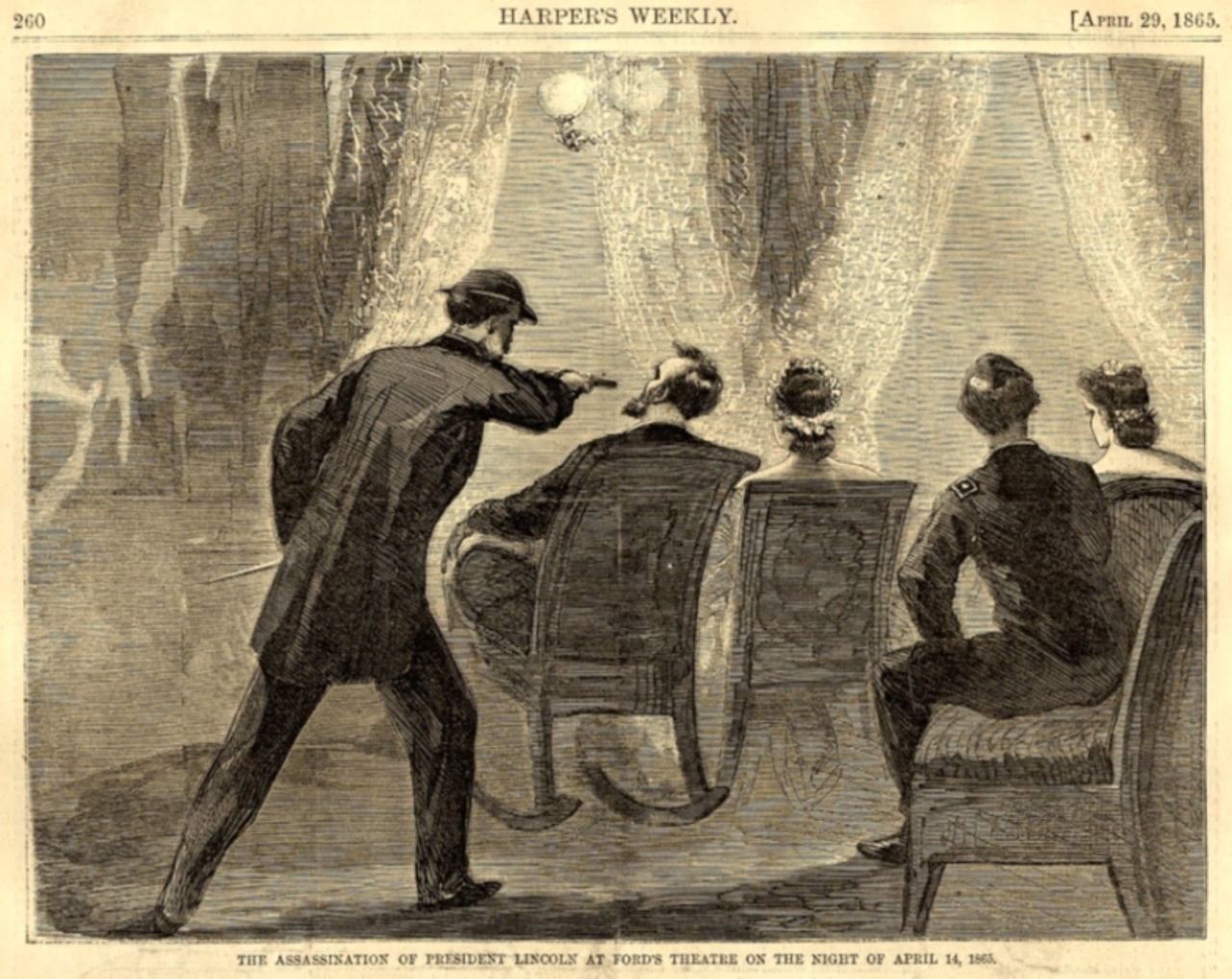 Our founding fathers knew better, but we had set them aside as ignorant men, smart in their own time, but unknowledgeable of ours and therefore no longer relevant. The Progressives had won, and along with the so-called Democrats and middle-of-the-road Republicans from whence they once arose were busy remaking the rest of the world in the US image. It was Lincoln's bane become manifest.
Our founding fathers knew better, but we had set them aside as ignorant men, smart in their own time, but unknowledgeable of ours and therefore no longer relevant. The Progressives had won, and along with the so-called Democrats and middle-of-the-road Republicans from whence they once arose were busy remaking the rest of the world in the US image. It was Lincoln's bane become manifest.
I was a Baby Boomer who had voted for Barry Goldwater in a mock high school election when he lost to Lyndon B. Johnson in the 1964 general election. By the close of 1969 I had marched on our nation's capitol against the war in Vietnam. My number was drawn for induction into the US military, but childhood asthma had spared me from direct participation in the war. My political outlook and eventually my family relations were severely damaged by the war. As the conflict progressed, and I fumbled my way through college, bumper stickers began appearing with the words "America, Love it, or leave it". I do not recall which occurred first: my departure for Kaiserslautern, West Germany or Richard M. Nixon's resignation from the US presidency. What is certain is that I had little understanding of Nixon's decision to take the United States off the gold standard. Neither did I understand what Ford was undertaking in the Middle East shortly after Nixon's resignation. 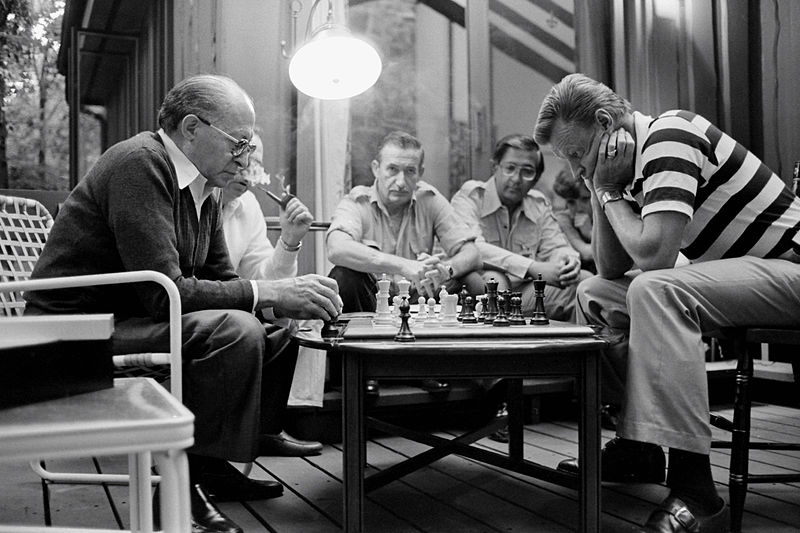 Certain was that US policy in the Middle East was in the hands of Henry Kissinger during the Ford and Carter years, and I was mistakenly fond of his leadership in these matters. I had not yet read Zbigniew Brzezinski's The Grand Chessboard: American Primacy and Its Geostrategic Imperatives
Certain was that US policy in the Middle East was in the hands of Henry Kissinger during the Ford and Carter years, and I was mistakenly fond of his leadership in these matters. I had not yet read Zbigniew Brzezinski's The Grand Chessboard: American Primacy and Its Geostrategic Imperatives
By the time I returned from Europe in 1976 the Vietnam War was over, and the US appeared to be at peace. The question of whether America should serve as the world's police force was still an important part of the political debate.
In 1980 I found work as an assistant bartender at the Renaissance Center in downtown Detroit while enrolled at Wayne State University as a graduate student of German Language and Literature. The Center was the site of the Republican National Convention, and I saw Ronald Reagan as a source of American political inspiration. In that same year I decided to become a professional economist and abandoned my literary career.
At the time I viewed the United States as the leader of the free world, the Vietnam War as an unfortunate mistake, and Soviet containment as correct and proper policy. This said, I was no longer the naïve lad of the Goldwater epoch. I had read Franz Fanon's Les Damnés de la Terre (The Wretched of the Earth) in French, and I had read Karl Marx in German. I had studied peasant rebellion in Central America, was fascinated by the Palestinian suicide bombings, could sympathize with the Irish Army in Northern Ireland, and understood well what had brought about the Mau Mau rebellion in Kenya. I had even studied the history of the Ottoman Empire, and its destruction by the French and British. With few exceptions colonialism had wrought havoc in the world for all but the colonists.
Socialism was a natural reaction to such exploitation, for it preached the egalitarianism of the Christian church that had been badly wounded by the French Enlightenment and stood opposed to an aristocracy of private property owners who had laid title to land occupied by native inhabitants whose labor could now be purchased by global corporations that curried political favor from among the local, colonial, surrogate elite. It was, if you will, the Western capitalist, neocolonial, business model that has greatly tarnished the image of capitalist free markets around the world. Yes, of course, everywhere was different, but the pattern was pretty much the same. Some faired better than others.
Yes, there are those who insist that the standard of living world-wide has improved, but at whose and what expense?
What I did not see at the time, but so clearly now, is that the United States of America had willfully assumed the position of the British colonial empire and extended it world wide. On the surface the Cold War was about defending free enterprise against government control of the means of production -- namely, the communist world. Underneath, it was little more than the perpetuation of the British colonial empire and a historical meeting of two long-standing imperial forces -- the United States and Russia -- that up until the 20th century had been advancing across their respective continents relatively unhindered, each separate in its own geopolitical sphere. World War II and the rapid technological advancement of the first half of the 20th century, brought these two empires face-to-face in a stalemate on the European continent and in various forms of indirect armed conflict around the world. Alexis de Tocqueville had understood this eventual confrontation already in 1835 even before Lincoln's War of Consolidation.
Now one can argue that America has been imperial from the outset, but it is not the way that we have been taught to view ourselves as a people, and there was good reason for us to have been so easily led astray. Important in this regard is that we can clearly see through this subterfuge today, understand the underlying contradictions that have given rise to it, and deplore how it is being used to control and manipulate us and others in ways that are detrimental to both our present and future. No, I was not around to witness the mentality of the American people of yesteryear, but there is good reason to believe that it was not the mentality of Americans today. Our attitude towards government, the world around us, each other, and life itself have surely changed, but I hardly think for the better -- this, despite our enormous strides in scientific discovery and technological advancement.
When I left the United States for Japan as an economics instructor for US military personnel with the University of Maryland, it was not with the intention of promoting America, but with the idea of somehow finding my way back to Europe. My fondness for the military had nothing to do with my loyalty for country, for already I was significantly estranged. I had just spent the past two decades in the study of three completely different kinds of human value: the shared value of the collective, the exclusive value of the market place, and the value of the literary self. My study of anthropology at Purdue University and the University of Michigan, my study of modern economic theory at Wayne State University, the University of Oklahoma, and the University of Washington, my study of German Language and Literature at Michigan State University, Wayne State University, and the School of Applied Languages, University of Mainz in Germersheim, West Germany, my study of French language, literature, and society at the University of Tours and the University of Strasbourg, France, and my ever increasing interest in, and self-study of, political economy, American history, political philosophy, Japanese language, markets, and society, and world affairs had taught me that the world was a big place, and that America was only one country among many whose role I still did not completely understand.
Indeed, during the nearly three decades that I spent overseas I came to understand the importance of national identity as a way of viewing the world on the one hand, and governing it on the other. Today, we cannot cross a national border without a passport and not become a fugitive of the law. Not only are we taxed within each border, but we are compelled to fund or fight in wars in distant lands of which we know very little or have never come into contact. We speak to those from other nations as though we were ambassadors of our own, and we treat our foreign guests as if they were ambassadors of theirs. Even we take the blame for the wickedness of our forefathers and pay reparations for their wrong doing in order to clear our common name. The idea that everyone belongs to a nation, and that the passport that we carry in our briefcase or wear around our neck, defines our identity as a human being is both accurate and ludicrous depending on the individual and the way in which he identifies with, or is identified by a particular government, group of people, or society.
Most of us are born and raised in one society that shares a common language, living habits, and view of the world. All of us today are born as a citizen or refugee of some national government. More importantly, it is generally far easier to obtain the citizenship of another nation than it is to be accepted as a citizen of the nation whose new citizenship you obtain. So, strong has the notion of national identity become.
That I have come to view my passport as I view my driver's license -- a permit to go from Point A to Point B without being punished for lack of proper identity -- has little or no bearing on the way that I am treated by those of my host nation.
For the nearly three decades I lived amongst those who claim citizenship to a nation different than the one in which I was born and raised. During this time in eight different countries on three different continents only public officials and employers who demanded the presentation of my passport for the purpose of residence, employment, or travel ever saw my passport. To all others I kept my national identity hidden. This secrecy raised deep concern among many, for it highlighted the alienating aspect of my alien presence by challenging the notion of the nation-state in the mind of each. If my hosts, on the other hand, thought of me as one of them, then it was, of course, as a human being with all of the wants, needs, and constraints of an ordinary creature like themselves. Among my overseas friends it was generally impossible for them to think of me in any other way.
While in Germany I was always asked from what part of Germany I came. While in France, I was asked, if I were not Belgian or Swiss. So good was I able to speak the language of each nation. In Japan, Korea, Thailand, and Saudi Arabia it was assumed that I was American, German, or Scandinavian, for I did not speak English with a British or British-like accent. In the United States I am regularly asked from where I come, and like the Japanese, Koreans, Thais, and Saudis, most Americans believe that I am from some Germanic-speaking country. Racial features do make a difference.
With Americans I do not seek to hide my identity, however. I tell them straight away that I am American. I only balk to tell them in what part of the United States I grew up, for I am rarely believed when I answer their question truthfully. Within America's homeless community I am always treated as a foreigner -- well, at least, until my wallet was stolen, and those around me had full access to my official credentials. Most in the community, who believed to know me before, now stand at some distance, for someone's malicious intent inadvertently dispelled their own prejudicial appraisal.
Amazingly, perhaps, I care little whether Americans think of me as American or not, because there are few people in America who call themselves American that I consider American -- so alien have most become to what America means to the rest of the world, what America once meant to itself, and how I view my own upbringing as an American citizen. Yes, you can point the finger at me for failing to re-adapt, but why should I? I have just as much right to define America for America as any other who can claim citizenship. What is more, America is in bad need of redefinition, as it has grown generally worse during my absence and can hardly see its way forward.
Important is that this time I have returned home with a solution having left three times without one.
The imperial British tradition that we perpetuate and at whose helm we now stand was surely necessary for our founding, but it is not the gift of our founding fathers for which we as a nation once stood; neither is it the part of our tradition of which we should be particularly proud. Unfortunately, it is this tradition that now appears as the contemporary American reality on nightly news broadcasts around the world. Indeed, the gift that once made us great and that we bestowed to the world is no longer the center of our own or our friends' attention, nor that of those who respect, loathe, or fear our might. In fact, we have turned our forefathers' gift into a celebrated shrine or museum piece that we now regard as historic artifact -- some with nostalgia, some with disdain, but few with the respect, maintenance, and celebration that it deserves. Rather, we view it as a shared starting point of a long journey whose only real direction is that given it by our leaders and our own struggle as citizens to maintain or get ahead. In short, we are no longer the sovereign people with a shared principle that we once were.
Rather, we have become just another empire, like many before us, that will eventually collapse more quickly than it rose -- an expired ticket along the road of glory waiting to be fined for having over-parked. Alas, this is neither the America of yesteryear, nor anything of which I care to be very much apart today.
When I returned to America in 2007 after having spent nearly seventeen years in East Asia, I did not last but six months before climbing aboard a plane to explore and come to understand still another part of the world -- the Middle East. My first sojourn in the Middle East was brief, somewhat under a year, and my return home was little more successful than my previous one. Within a year and a half I had left the United States for a fourth time and remained overseas for another six years, four of which were spent on the Arabian peninsula.
By 2015 I had the choice of returning still again and decided to return. On the one hand, I had tired of being a guest in someone else's nation, and my current host nation wanted me to become a Muslim as a condition for my further employment -- well, at least, this was a possible explanation for my current employer's failure to renew my contract. For my job performance was not at issue, and I got along well with my immediate supervisor and much of the university's administration including the university's provost and the assistant director of personnel. The decision for my departure appeared to have come from the Saudi Ministry of Education.
Is Administrative Law Unlawful?
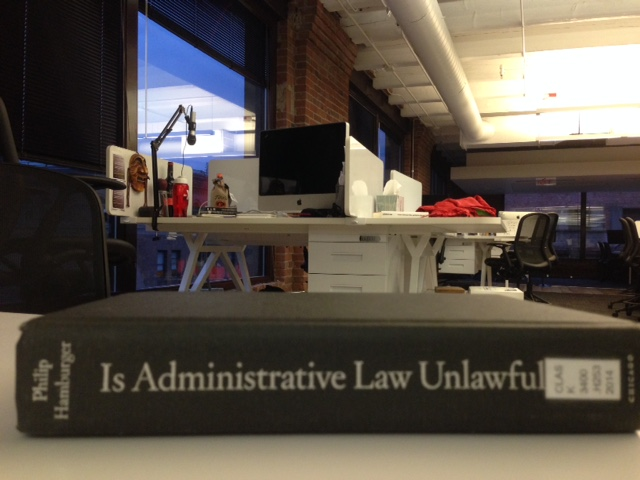 In 2017 while listening to an online lecture about administrative law presented at Hillsdale College I was introduced to the work Is Administrative Law Unlawful? (2014) by Philip Hamburger. Wanting to learn more I went to the Gallagher Law Library at the University of Washington, found the book, and checked it out. It took me nearly six months to read it, but read it I did in small increments rarely more than a half hour in length and usually much shorter. Alas, I was working on the Grammar Captive website and caught up in my court case against SURF Incubator and had little time. Important is that during this six month period I was able to renew the book six times without interruption. That such a book was not in high demand spoke volumnes about the state of constitutional law at the University of Washington. But, should I have expected anything different?
In 2017 while listening to an online lecture about administrative law presented at Hillsdale College I was introduced to the work Is Administrative Law Unlawful? (2014) by Philip Hamburger. Wanting to learn more I went to the Gallagher Law Library at the University of Washington, found the book, and checked it out. It took me nearly six months to read it, but read it I did in small increments rarely more than a half hour in length and usually much shorter. Alas, I was working on the Grammar Captive website and caught up in my court case against SURF Incubator and had little time. Important is that during this six month period I was able to renew the book six times without interruption. That such a book was not in high demand spoke volumnes about the state of constitutional law at the University of Washington. But, should I have expected anything different?
Hardly.
This was Seattle, the heart of American modern liberalism. What law professor at the University of Washington would make such a book an assigned reading, and what student would even have the inclination to open the book for his own research? Clearly, I was happy to have found the book available on campus. Many works by Murray Rothbard are completely absent.
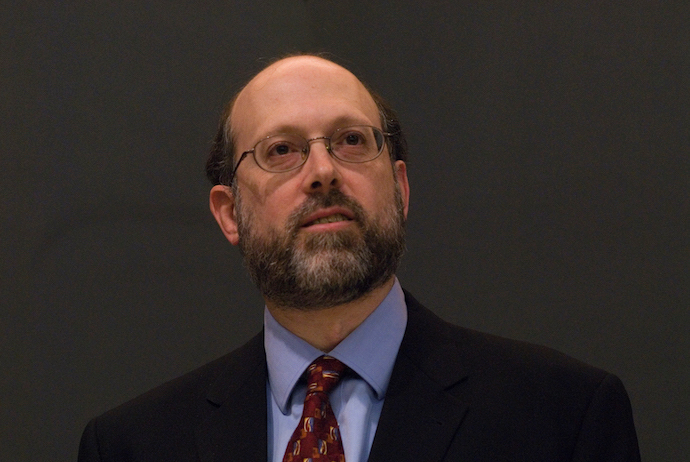 Philip Hamburger's work Is Administrative Law Unlawful? (2014) traces the Anglo-American development of constitutional law and shows how severely we, the American people, have veered off course. In his book Hamburger examines the prerogative will of British kings, and the forever vacillating, but always evolving constitutional relationship between the British parliament and the British royal monarch.
Philip Hamburger's work Is Administrative Law Unlawful? (2014) traces the Anglo-American development of constitutional law and shows how severely we, the American people, have veered off course. In his book Hamburger examines the prerogative will of British kings, and the forever vacillating, but always evolving constitutional relationship between the British parliament and the British royal monarch.
Constitutional law did not suddenly appear, nor is it a philosophy without material substance; rather, it is the culmination of a long historical process designed to limit royal prerogative in England.
American constitutional democracy was already challenged in the courts before Lincoln's War of Consolidation. 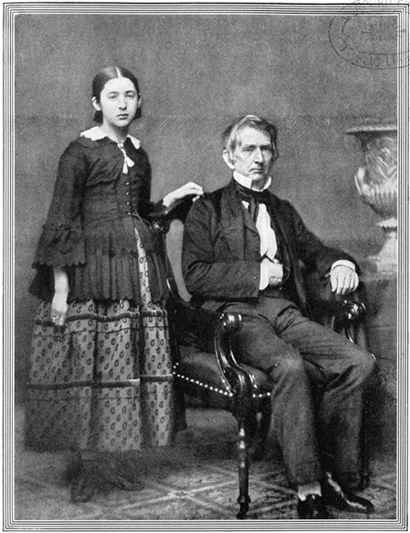 When marshal law legislation was signed into law by Abraham Lincoln the US Constitution was simply set aside. Indeed, few in the North even dared to speak out against Lincoln or his war for fear of being imprisoned by his Secretary of State, William H. Seward. Although there was an attempt to restore constitutional order after the war, the pathway to what would follow had already been laid.
When marshal law legislation was signed into law by Abraham Lincoln the US Constitution was simply set aside. Indeed, few in the North even dared to speak out against Lincoln or his war for fear of being imprisoned by his Secretary of State, William H. Seward. Although there was an attempt to restore constitutional order after the war, the pathway to what would follow had already been laid.
By the end of the 19th century the rapid development of new technology and important demographic shifts that took place as a result of this technology's introduction created much social turmoil. Government, frightened by the rise of a very wealthy and powerful industrial class and eager to turn this turmoil into its own political advantage, began looking for ways to impose political order where social chaos reigned. Rather than encouraging patience among the general public and waiting for society and its market agents to sort things out among themselves and in the courts, they followed the Lincoln precedent, took the power of the people into its own hands, and reconstituted our federal and state governments as if they were municipal administrative localities. The idea was to circumvent awkward constitutional mechanisms that had been put into place in an effort to protect citizens against government abuse.  It was during this period that the wisdom of our founding fathers captured in the words of Thomas Paine that
It was during this period that the wisdom of our founding fathers captured in the words of Thomas Paine that
"government is a necessary evil"were transformed and the new dictum became
government is necessary and goodAfter nearly a century under this new dictum some of us have realized that our founding fathers were, indeed, wise, and that the words of Thomas Paine were not only appropriate to our founding, but also to our present.
Hamburger's book demonstrates clearly the unconstitutional nature of administrative law. In fact, he shows not only that modern liberalism is not modern, but that it harkens back to the days of King James I whose royal prerogative was often at odds not only with the British parliament, but the entire British legal system. Chapter after chapter, with example after example, Hamburger illustrates the unconstitutionality of administrative law and exposes the dangers of its existence and why it was no more necessary when it was introduced than it is today.
Reading Hamburger's book shows how important constitutional government is for the preservation of liberty, where we have gone astray, and why it is important that we go back.
De la démocratie en Amérique
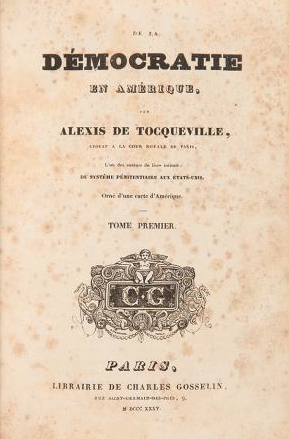 Already before I had completed Is Administrative Law Unlawful? I had selected my next reading -- Alex de Tocqueville's De la démocratie en Amérique (1835 and 1840). Having completed all three volumes of the Abbé Augustin Barruel's Mémoires pour servir à l'histoire du jacobinisme just before I became homeless I was wanting of French lecture. Also desirous of proof that liberty once existed in America Alexis De Toqueville's work was a perfect solution, for he wrote at a time before Lincoln's War of Consolidation and after the first major transfer of political power by popular vote in the history of the United States -- the 1800 general election and selection of Thomas Jefferson as the third president of the United States.
Already before I had completed Is Administrative Law Unlawful? I had selected my next reading -- Alex de Tocqueville's De la démocratie en Amérique (1835 and 1840). Having completed all three volumes of the Abbé Augustin Barruel's Mémoires pour servir à l'histoire du jacobinisme just before I became homeless I was wanting of French lecture. Also desirous of proof that liberty once existed in America Alexis De Toqueville's work was a perfect solution, for he wrote at a time before Lincoln's War of Consolidation and after the first major transfer of political power by popular vote in the history of the United States -- the 1800 general election and selection of Thomas Jefferson as the third president of the United States.
I got the idea from an online Hillsdale College Q&A Session between John Miller and Bradley Birzer, and decided to run with it.
The book has been reconstituted in various formats. I selected the only format that was available in French at the University of Washington library -- namely, the two volume series published by Librairie de Médicis, Paris, France and reproduced by Les presses de l'Imprimerie Darantiere à Dijon in May 1951. These volumes resemble those reproduced by Les Éditions Gallimard and published online by the Université de Québec where you can also find a translation into English. Unfortunately, I cannot speak for the quality of the English translation, as I have never read it. I prefer to read works in the author's native tongue, as they tend to be better written, and the vocabulary, style, and even logic of the original are closer to the mind of the author. Yes, the original usually reads more slowly, unless it is written in my native tongue, but with each new reading in the same language my reading speed in the language increases. What is more De Tocqueville is an exceptionally talented author and a pleasure to read in his native French tongue.
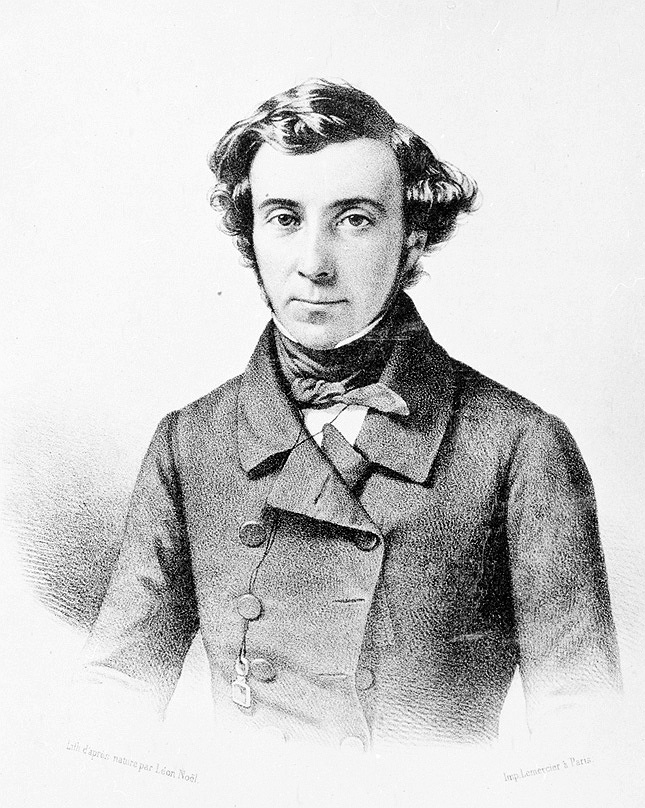 In his two-volume work Alexis de Tocqueville endeavors to understand why democracy had so well succeeded in North America, but was struggling on the European continent and especially in France.
In his two-volume work Alexis de Tocqueville endeavors to understand why democracy had so well succeeded in North America, but was struggling on the European continent and especially in France.
Born into an aristocratic family that had experienced the French revolution, the rise and fall of Napoléon and watched as the egalitarian idea of liberal democracy transformed the French and European political landscape during the late 18th and first half of the 19th centuries, Alexis de Tocqueville struggled with the contraposition of the established aristocratic order and the new wave of liberal, democratic, egalitarianism that he had come to understand as an irreversible political trend and, in the end, natural state of the human condition.
Alexis de Tocqueville insists, with good erudition, that there was little revolutionary about America's eight-year war (1775-1783) against the British. It was, in fact, a war for independence as clearly expressed in the Declaration of Independence and well-documented in the correspondence of numerous war participants. According to De Tocqueville America, as settled by the English colonialists, was always democratic in nature. Furthermore, many of the notions of republican government that formed the basis for the US Constitution were already in place before the Constitutional Convention of 1787. In effect, the war, the Articles of Confederation, and the US Constitution were merely the consummation of a democratic trend set into motion with the establishment of the first American colonies. In contrast, the real revolution was taking place in France and on the European continent where the democratic ideals of liberal egalitarianism were still struggling to gain acceptance among the French aristocracy and european monarchs that continued to resist them.
Whereas the French and many other continental observers believed that America's democratic success was due primarily, if not solely, to the vast expanse of unlimited material resources to the West of the Atlantic seaboard, De Tocqueville shows that this was clearly not the case. Rather, according to De Toqueville it was the egalitarian spirit of the Christian church and the separation of church and state that was making democracy work in the US, but not in France.
Further, De Tocqueville distinguishes, quite on his own, the difference between governmental and administrative centralization. On the one hand, De Tocqueville portrays the US president as more powerful than any French king with the exception, perhaps, of Louis XIV, but on the other hand shows that the concept of administrative rule was more developed in France at the time he wrote. In effect, the power of the US president lay in the consent of the people, majority rule, and his right and the right of Congress under the US Constitution to act as the nation's sovereign in specific matters outlined in Article I, Section 8 of the US Constitution.
Although rejecting John C. Calhoun's notion of a league of sovereign states that could reject the will of the Union at any time, De Tocqueville did recognize three sources of sovereignty in the United States of America: the sovereignty of the people, the sovereignty of each state, and the sovereignty of the federal government. Unlike today, where the sovereignty of the people and the individual states have been pushed aside in favor of the sovereignty of our not so federal government, De Tocqueville shows clearly how these three source of sovereign power worked together to make the United States a powerful and formidable nation.
Furthermore, De Tocqueville examines the fundamental concerns of our founding fathers with respect to political passion and human reason and the need for the separation of powers. He shows how the federal, state, and county courts served as a check on the passionate winds of democratic politics, and how due process insured the participation of all American citizens in the political and legal process. The frequent use of grand and petit juries insured an appreciation of the law by all citizens.
Surprisingly, perhaps, De Tocqueville shows that government played a far more important role in American society than it did in French society, but because American government magistrates were elected officials and not administrative bureaucrats, these officials were far more responsive to the demands and needs of the people.
Through countless examples and profound intellectual insight De Tocqueville of yesteryear puts the apologists of the so-called modern American administrative state to shame.
Hillsdale College
It would be wrong for me to end this year's report without a show of appreciation to the faculty, staff, students, and supporters of Hillsdale College who make the school's online courses on Western tradition and US government available at no cost to the millions of American and others who watch and/or listen to them. For they are inspirational and informative and provide all Americans with the opportunity to understand what America is truly about and what we are in the process of discarding through our careless disregard of our nation's past.
 No, I do not agree with the school's promotion of American imperial power, its insistance on a belief in nature's God, its indirect, if not direct, support for the State of Israel, its delusional belief that the Twin Towers were brought down by two rogue passenger jets, and its constant praise for Abraham Lincoln, our nation's 16th President. Even its praise for our nation's participation in both world wars runs against my own world view. On the other hand, I well accept the school's right or need to project its own belief in Jesus Christ as the son of God and to promote the school's important role in the formation of the original Republican Party and its denunciation of slavery. In a similar light, I praise the school's independence from federal government funding and wish more private schools would teach and promote America's founding in a way similar to that of Hillsdale College. Indeed, its Barney Charter schools are a beacon on the hill for the way forward in public and private education.
No, I do not agree with the school's promotion of American imperial power, its insistance on a belief in nature's God, its indirect, if not direct, support for the State of Israel, its delusional belief that the Twin Towers were brought down by two rogue passenger jets, and its constant praise for Abraham Lincoln, our nation's 16th President. Even its praise for our nation's participation in both world wars runs against my own world view. On the other hand, I well accept the school's right or need to project its own belief in Jesus Christ as the son of God and to promote the school's important role in the formation of the original Republican Party and its denunciation of slavery. In a similar light, I praise the school's independence from federal government funding and wish more private schools would teach and promote America's founding in a way similar to that of Hillsdale College. Indeed, its Barney Charter schools are a beacon on the hill for the way forward in public and private education.
The Bad, the Good, and the Beautiful
I could close in a wail of self-pity and blame what I regularly observe among the members of the Aloha Inn and in the Kitchen Annex of the St. James Cathedral, or I could end with the poetry of hope and a new tomorrow. Deep down I believe that it is still too early to be very optimistic, but being honest with oneself is simply not enough when success depends so much on those around you. So, I will make every attempt to end as positively as possible.
The Bad
Perhaps Sanjay had decided for himself when he placed his hand in a piece of hot apple pie and burst into tears from the burn that he received as a result.
We were seated at the dining table in Ajit's house. I across from Ajit's mother, a very accomplished and congenial woman, Ajit next to me and across from his French wife, and Sanjay at the head of the table between his Mom and Dad.
Before dinner Sanjay had showed me several large berries still hanging from a branch on the Banerjee side of an opening in a barrier that separated the Banerjee property from the neighboring house. If I recall there were two berries on the Banerjee side of the opening and one or more on the other side within easy reach. I told Sanjay that he should take only those on the Banerjee side. In the end, none were taken while I was there. I do not know what happened to the berries after I left.
While Sanjay was with his Mom in the bathroom attending to his wound, Ajit and I sipped whiskey and chatted with his mom. It had been a good meal, and the apple pie was exceptionally well prepared. We waited for the wounded and his attendant to return to the dinner table.
Ajit had already departed from Galvanize much before my visit to his house. The company that he had co-founded was profitable, and he stated that he needed a rest from coding. Somewhat before his departure he had heard me tutoring one of my former Saudi students over the internet and offered me his current Apple MacBook in exchange for language lessons for his son. He told me that I would have to wait until August before the exchange could be made, and that I should be patient. As my iMac had already died, and I was now confined to MacOS 10.7.5 while High Sierra (MacOS 10.13) was being distributed over the net, I was very happy about the offer.
At the time I was preoccupied with Matomo, and it would be nearly two months before school started. As my plan was to begin podcasting in the fall and launch Grammar Captive, I was very satisfied with both the trade and the timing and offered to teach as many lessons as necessary to achieve equity. I assumed that Ajit was planning to purchase a new machine in the fall and would have no use for his old one at the time.
 I had already been evicted from Galvanize when I went to visit Ajit in West Queen Anne. August came and went. Ajit was on vacation in Europe with his family. September came. I was unable to move into ThinkSpace and did not dare invite Ajit or Sanjay to the Aloha Inn. So, I asked Ajit, if I could not meet with Sanjay in West Queen Anne. He replied that his basement was under renovation and that we should wait until the noise had dissipated. October past. Once again, I connected, and Ajit explained that his wife was transitioning from a housewife to the market place, and that we should wait until things settled down. November past. I sent Ajit the photo of a race car that I had taken in Pioneer Square one Sunday morning while I was still working at Galvanize. It resembled closely one of Sanjay's toys, and I asked that Ajit show it to Sanjay. Christmas was nearly upon us, and I texted Ajit still again to find out what was going on. I never received a reply. I sent another text. Still nothing.
I had already been evicted from Galvanize when I went to visit Ajit in West Queen Anne. August came and went. Ajit was on vacation in Europe with his family. September came. I was unable to move into ThinkSpace and did not dare invite Ajit or Sanjay to the Aloha Inn. So, I asked Ajit, if I could not meet with Sanjay in West Queen Anne. He replied that his basement was under renovation and that we should wait until the noise had dissipated. October past. Once again, I connected, and Ajit explained that his wife was transitioning from a housewife to the market place, and that we should wait until things settled down. November past. I sent Ajit the photo of a race car that I had taken in Pioneer Square one Sunday morning while I was still working at Galvanize. It resembled closely one of Sanjay's toys, and I asked that Ajit show it to Sanjay. Christmas was nearly upon us, and I texted Ajit still again to find out what was going on. I never received a reply. I sent another text. Still nothing.
It is difficult to know what happened, but apparently Ajit had changed his mind. Perhaps while on vacation he had overshot his budget and good not afford a new machine. Perhaps he had heard about my experience at Galvanize from the wrong sources and decided that I was a bad person to educate his son. Perhaps he had decided that I was a bad risk and found someone else to present his machine. In any case, it was just another disappointment in a year mixed with great success and misfortune, and it would have been nice to end it on a positive note.
The Good
It was shortly before Christmas, and I had just left the gym. Something was missing. My MacBook! I quickly returned, retraced my steps, made several inquiries, and concluded that I had left my computer in the train. I called the line's terminal station and provided security with my time of departure and the train's destination. Security was now in possession of my machine, and I was elated. That night I traveled all the way to Angel Lake and picked it up.
It was my Christmas! No, it was not the hardware upgrade that I was expecting to receive from Ajit, but it was my old MacBook that had been returned unscathed and in good working order with all of its attachments. How many people had seen my briefcase and left it lay -- not knowing to whom it belonged? The feeling of elation was very similar to what had I felt already a year before when a gentleman spoke to me from behind and asked, "Are these yours?"
 Christmas past, and someone at the Aloha Inn told me to check my mail box. In it I found a Christmas card sent to me by my good friend, Professor Dr. Peter Baron. He had posted it already on the 11th of December, and we had both given up on my ever receiving it. Two days later I received a deposit into my Bank of America checking account from Dr. Baron. This money allowed me to meet my quarterly payment to Lunarpages and preserve my VPS account with same. Had I not received the payment I would have fallen out of compliance with the Aloha Inn and put my continued presence at the Inn in danger. The payment to Lunarpages was the higher priority.
Christmas past, and someone at the Aloha Inn told me to check my mail box. In it I found a Christmas card sent to me by my good friend, Professor Dr. Peter Baron. He had posted it already on the 11th of December, and we had both given up on my ever receiving it. Two days later I received a deposit into my Bank of America checking account from Dr. Baron. This money allowed me to meet my quarterly payment to Lunarpages and preserve my VPS account with same. Had I not received the payment I would have fallen out of compliance with the Aloha Inn and put my continued presence at the Inn in danger. The payment to Lunarpages was the higher priority.
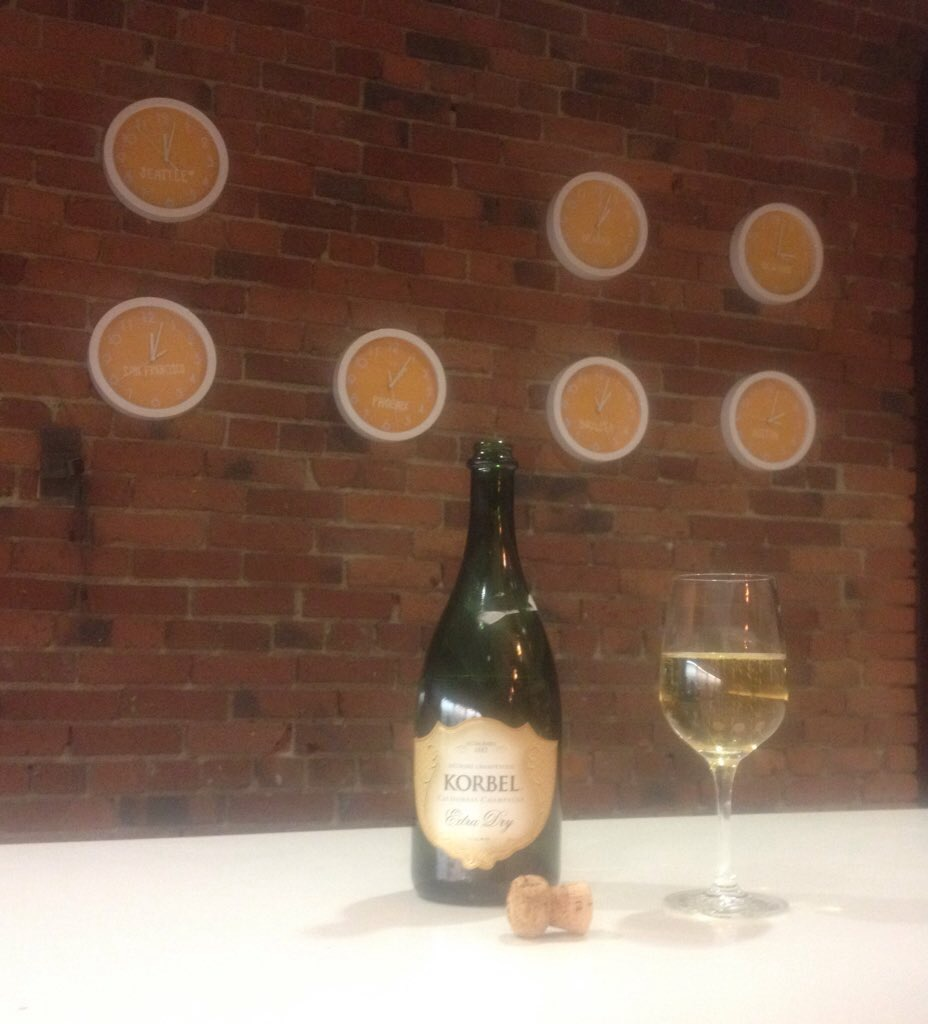 This was pretty much how the year ended. There was no champagne as there had been during the previous two years -- partly because I did not have any money left to afford it, and partly because no one at the Aloha Inn is permitted to drink alcohol either at the Inn or outside of it. A large number of the Inn's residents are recovering alcoholics and we are all forced to sacrifice on their behalf.
This was pretty much how the year ended. There was no champagne as there had been during the previous two years -- partly because I did not have any money left to afford it, and partly because no one at the Aloha Inn is permitted to drink alcohol either at the Inn or outside of it. A large number of the Inn's residents are recovering alcoholics and we are all forced to sacrifice on their behalf.
The Beautiful
In her monumental work Les mandarins Simone de Beauvoir wrote
Il faut intégrer le mal.I have come to interpret these words to mean
If there is beauty in life then it is in knowing how to integrate what we perceive to be bad, not as something good, but as a part of who we are so that we are able to move forward.This notion of imperfection is also mirrored in Japanese art and stands in direct opposition to the artistic perfection of the ancient Greeks. It is a notion that draws a strict line between the mathematical logic of the sculpted reality of the ancient Greeks and the human condition. It acknowledges our capacity to reflect and our relentless effort to improve on our being while underscoring our inability to ever manifest our ideal. It is beautiful, because it allows us to rest in our ongoing struggle to move beyond the very real constraints that bind our endeavor.
 Les mandarins was written about France's post-war reconstruction. The French Republic was intimately torn by those who had acceded to the German occupation and those who resisted it. These were difficult times for the French nation
Les mandarins was written about France's post-war reconstruction. The French Republic was intimately torn by those who had acceded to the German occupation and those who resisted it. These were difficult times for the French nation
Many who had remained during the occupation wanted only to flee France. Those who remained and felt strongly attached to their place of birth and cultural heritage had little choice, but to participate in the healing of political wounds that had resulted from the occupation. Simone de Beauvoir and her lover, Jean-Paul Sartre, were both accomplished writers and deeply committed to the society, culture, and language of their native land. They were also assuredly humanists who could view the human condition as something beyond the narrow boundaries of their own upbringing as members of French society.
Although I had read many of Jean-Paul Sartre's works before reading Simone de Beauvoir, I never felt comfortable in the presence of Sartre. Yes, he was an important source of illumination about the human condition, but he offered little hope in the way of resolution about those matters of the human condition that he treated in his works. He was critical, imaginative, and captured your intelligence, but he always left you alone and baking in the sand.
Simone de Beauvoir was much more accommodating and always able to find a solution, even where none appeared to exist.
During the now more than two years as a homeless person I have experienced what I believe to be the absolute worst of American society that is not criminal in nature and even parts that clearly are. Still, I have managed to rise above it, by not succumbing to it.
The last twelve years of my life have been intimately recorded on the Moogoonghwa website, where I have sought, once each year, to look back and reconcile myself with my personal fate and ambition. It is a time where I am able in the sanctuary of my own mind render conceptual order to all that has transpired around me, as I have struggled to stake out my own claim on human society and create thereby my own humble legacy with pride and contentment.
As an American citizen today, it is no longer a matter of staking a territorial claim on a piece of real estate that is only occasionally occupied by the true owner of the land, but regularly inhabited by his source of food, clothing, and even shelter. Rather, it is a matter of producing something in the market place that someone else wants and is willing to sacrifice a portion of his own production in order to obtain through orderly and voluntary exchange.
The idea that anyone owes you a living above and beyond your own parents who are likely to reject you, if you are, indeed, ungrateful for all that they provide you, is simply unAmerican and should be rejected by all those who consider themselves to be American. This is how I was raised as a first and second generation American, but it is not how I was schooled.
Within my own family household I was raised in still another contradiction, but this was religious in nature and aroused questions in me that were related to my own ontology.
It was not until I sought to find myself in other people's cultures that I was able to understand these contradictions, their source, and potential sources of resolution, that I returned to my native land with a solution. No, the solution is not easy, because the contradictions in American society are deeply entrenched, and most Americans have neither the time, nor interest to investigate and resolve them. This said, they must be resolved, else America finish as all empires have done before it, in a state of ruin.
Just because the world is better connected is no guarantee that disaster can be avoided, for it is now easier to organize around a larger variety of opposing ideas. What is more, the resources available to make these ideas manifest is far more plentiful than they have ever been.
Finally, the nation-state is deeply embedded in modern society, and the large militaries over which the government of each commands are in the hands of a very few number of men and women who are largely unattached from those over whom they rule. Indeed, who among these former are willing to send themselves or their sons and daughters into the same harms way into which they are eager to send the sons and daughters of the latter whom they call fellow citizens? Such people among them are rare.
How is it, then, that we can entrust our destiny to the hands of people whose private property is scattered around the world in numerous places of asylum far from the havoc that they create in their competition for market dominance. It is not the invisible hand of market competition that rules; rather, it is the invisible hand of corporate and political intrigue -- i.e. failed market competition.
No, none of this is beautiful, but it is the lily that arises out of the marshland that can make even the muck a beautiful place to visit.
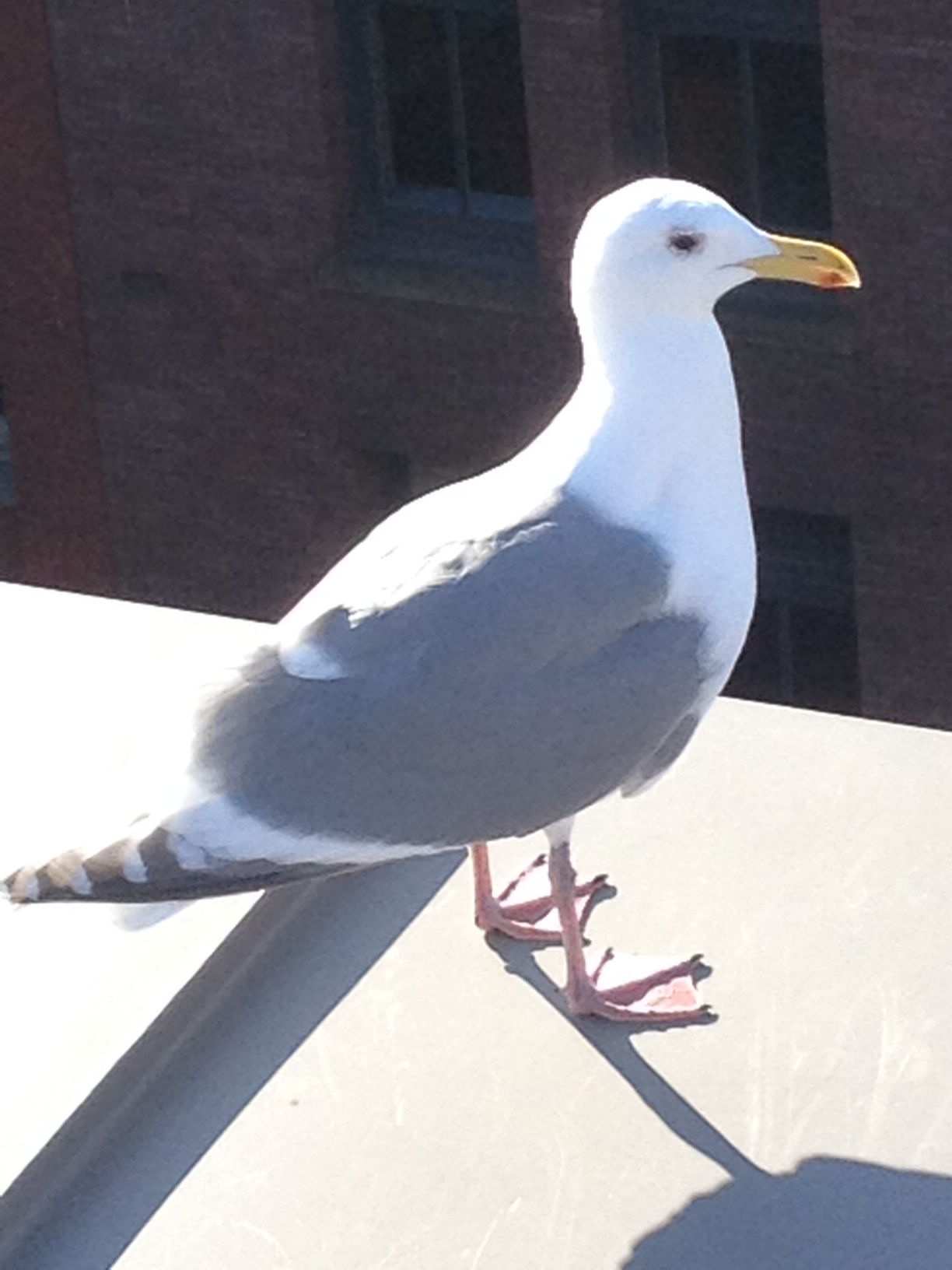 It is my hope that I can continue to stand as an inspiration to those who, in their effort to rise above the mere animal struggle for survival, also aspire for a higher ideal that recognizes in all of humanity on the one hand, the right to self-determination of each nation of people no matter their territorial boundary or lack thereof; and on the other hand, promotes with both compassion and understanding the need for each of us to carry his own weight to the highest extent possible.
It is my hope that I can continue to stand as an inspiration to those who, in their effort to rise above the mere animal struggle for survival, also aspire for a higher ideal that recognizes in all of humanity on the one hand, the right to self-determination of each nation of people no matter their territorial boundary or lack thereof; and on the other hand, promotes with both compassion and understanding the need for each of us to carry his own weight to the highest extent possible.
Finally, in an expression of hope to my fellow Americans, that each of you find within yourself the spirit that was present when our nation was founded! For, it is this spirit that made us great, and it is this spirit that will allow us to survive the difficult times ahead. No empire has ever survived the passage of time, and we have no reason to expect that our own will fare any better. For already, we are breaking up internally as our government imposes its will both at home and abroad.
We must admit that we have erred and rediscover who we once were.
In liberty or not at all,
Roddy A. stegemann
Happy New Year!
Credits
The world wide web (WWW) is an amazing place where content is often freely and voluntarily exchanged. I am proud to have provided much free content of my own. I offer it in exchange for what I have taken.
